

Free Travel Budget Calculator: Easily Make Your Vacation Budget
Packed for Life contains affiliate links. If you make a purchase using one of these links, we may receive compensation at no extra cost to you. As an Amazon Associate, I earn from qualifying purchases. See my Disclosure policy for more info.
Ready to take the hassle out of planning and managing your vacation budget? Our online Free Travel Budget Calculator is simple, and easy to use, and can help you plan and track your vacation expenses in just a few clicks.
I’ve used these same methods and categories of expenses for every trip I’ve taken over the last 25 years. From multiple 3 month solo adventures through Europe and South America, to weeks long trips to Cuba and Vancouver Island, Canada with my family.
Now online with automatic calculations, so you don’t have to mess around with spreadsheets or hand write in printables that clutter up your home.
In this post you’ll get access to this free tool, plus, you’ll get my top tips for planning your budget effectively for your trips and how to save money on travel. All the advice you need for smarter travel planning is right here.
Table of Contents
How to Use the Travel Budget Calculator & Try It Out!

Make sure to bookmark this page so you can come back to it anytime you need to track your vacation expenses and make travel plans.
This free vacation budget calculator will give you an estimate of total travel costs for your trip and whether your budget is enough to cover what you want to do.
It can help you identify areas you can potentially save money on trip expenses. Whether it’s choosing more budget-friendly hotels, walking or taking the bus instead of taxis, or prioritizing your top not-to-miss activities.
You can also start with your budget.
Then play around with the length of your trip, how much hotels, flights etc will cost to help you determine your price range for each travel expense as well.
- Enter 0 (zero) if there are certain categories you don’t need . The calculator will output an error ($NaN) if you don’t.
- Instructions for the calculator are below the Travel Budget Calculator, to give you an idea of what you should include under each budget item.
Vacation Budget Calculator
Calculator instructions.
Enter all your estimated expenses you’ve gathered during your vacation research.
Make sure it’s actually a realistic travel budget. For a family trip with young kids, you’ll also need to factor other things like diapers, baby wipes etc.
- Travel Budget : Enter your overall vacation budget you have for this trip.
- Number of Travellers: Enter the number of people you are paying for on this trip
- Number of Nights: Enter the number of nights you will need accommodations for. This will be used to calculate hotel costs.
- Number of Vacation Days: Enter the number of days you will be on vacation. Include travel days to be safe . This will be used to calculate your overall food & drink, daily transportation and activity costs.
- Total Flight Costs: Enter the estimated total of flight costs for everyone travelling. Be sure to include any baggage fees.
- Transportation Costs: Enter the total transportation costs for the trip. This is for any major transport costs that aren’t flights like trains, city transfers, car or RV rentals.
- Daily Transportation Costs: Enter your anticipated daily transport costs. This is for things like taxis, buses, Ubers, parking costs etc, you might need to get around every day.
- Hotel Costs (Per Night): Enter the amount your accommodations will cost each night. Don’t forget to include any tips for housekeeping staff etc. you may need to pay.
- Total Tour Costs: Enter your overall total budget or cost for tours, including guide tips.
- Activity Costs (Per Day) : Enter the amount you expect to spend on activities daily (do not include tours). These are for things like seeing movies, souvenirs, shopping, trips to a rec centre / pool, bowling, seeing a hockey game or a concert etc.
- Food & Drink Costs (per Day): Enter your overall daily food & drink budget or expected costs for everyone. Don’t forget to include tips.
- Miscellaneous Expenses: Enter an amount of money you will have overall for unexpected expenses or miscellaneous costs that pop up. Be sure to also include extra travel expenses not covered elsewhere.
- Travel Insurance: Enter the overall amount of money you will pay for travel insurance for everyone. This is for things like travel health insurance, trip cancellation insurance etc.
Budget Outputs
Currency Note: While the output is in dollars (uses the $ symbol), you can really use any numerical currency you’d like. Just ignore the $ symbol.
Once you hit the calculate button, you will get 4 pieces of info based on the numbers you provided:
- Total Vacation Costs : This is the estimated cost for your vacation based on the info you provided.
- Over Budget / Under Budget: This is the amount you are either over or under budget. If your expenses are over your vacation budget, it will say Over Budget and the number will be negative. If it says Under Budget, that is the amount you are under your estimated budget.
- Travel Costs Per Day: This is the amount of money your trip will cost you each day.
- Cost Per Person Per Day: This is the amount of money your trip will cost you per person, each day.
Make sure to review your results. If your over budget are there things you can do to bring the costs down? Or is there a way you can save or make more money before your trip?
Why You Need A Travel Budget

Listen, I am all for spending a little extra to do things our family doesn’t get to do at home.
But there is nothing more anxiety-inducing than running out of money on a trip, or having to pay off huge credit card bills at 28% interest because you didn’t plan ahead.
This is where a vacation budget can really help.
It doesn’t mean you can’t have fun or spend money.
Creating a budget will actually help you be able to afford your dreams. Plus be able to relax & have fun on your vacation knowing you won’t be in debt when you get back home.
The trip budget calculator will make financial planning fun, and easy.
How To Set Your Travel Budget & Determine Expenses
1. determine your overall travel budget.
First things first. Decide on your overall vacation budget or the money you are willing to spend on this trip.
When determining your overall vacation budget, you’ll want to consider a few things:
- How much money are you willing to spend on this trip?
- How much have you already saved?
- How long do you plan to go for? (more or less time can impact your budget)
- How many people will be travelling? (some places like Europe limit 4 people to a hotel room, this can significantly impact cost)
- When do you want to travel and how much time do you have to add to your vacation fund?
- How much extra can you afford to put away every week / month on top of your regular bills & household expenses?
- Is there any way you can decrease household expenses, or increase your income to add to your vacation fund faster?
Just make sure it’s a realistic budget. It doesn’t do anybody any good to use too low or too high numbers as a starting point.
2. Do Your Research
The type of trip you want to take, the length and the type of activities you want to do, will really impact your budget.
For example a week long trip to Thailand will be much different than a week in Japan, or a trip to Disneyworld.
Do some intial research to give you an idea of what your basic travel expenses will costs, so you can have ballpark figures to enter in the travel cost calculator.
You can always google average costs of living / travelling at your destination.
Careful planning is an important part of any travel budget.
3. Find Ways to Cut Costs
Unless you have a rich benefactor, or suddenly won the lottery, it’s a good idea to consider ways you can cut costs, save money and use your travel budget wisely.
Besides using our holiday budget calculator, our favourite ways to save money on travel expenses.
Transportation & Accommodation
- Find flight deals & error fares : The best way is with Going (Formerly Scott’s Cheap Flights) Flight tickets can be a big expense and make up a good portion of the total cost usually.
- Consider housesitting: Trusted Housesitters is our go-to site for housesitting around the world.
- Rent a place with a kitchen : Save money on food with a vacation rental . They can also be cheaper than renting multiple hotel rooms if you have a large family or group.
- Compare car rentals: Using Discover Cars can help you save up to 70% by quickly comparing rental cars options.
- Book early: Hotels, flights and trains are generally cheaper booked in advance. You won’t want to risk paying significantly more waiting until last minute.
- Take public transportation: If it’s safe to do so, take the local bus, or walk instead of relying on expensive taxis all the time.
⭐️ Also check out our list of the best ways to save money on flights .
General Money Saving Tips
- Travel off season or peak season: Not only is it usually much cheaper, there’s usually fewer tourists.
- Use a credit card with no foreign transaction fees : Those transaction fees can really add up. Also consider if travel credit cards with points are for you.
- Eat where the locals eat : Avoiding the touristy restuarants, and eating where the locals eat will not only save you lots of money, it will give you a more authentic look into their local cuisine and culture.
- Avoid popular destinations: The most popular touristy destinations often cost a lot of money, compared to smaller, lesser known destinations.
- Consider using travel agents: Sometimes a travel agent can find you a great deal, with much less work on your part.
- Adjust your travel style: Luxury resorts may be out of your price range. Road trips, camping trips can be just as memorable for for a family vacation.
- Plan free activities : Pick some free activities to do in between your more expensive tours, theme parks, & day trips to ancient ruins.
- Check out these ways to save on flights
Final Thoughts Using The Vacation Budget Calendar
Creating a vacation budget might seem challenging, but don’t worry! Equipped with the right tools and a bit of strategic planning, your next epic adventure is closer than you think.
Using a vacation budget calculator can help guide you to make smart, affordable choices, allowing you to experience the journey you’ve always dreamed of, without stressing about expenses.
Travel can be exciting and enjoyable at all budget levels. So here’s to making memories with your family, and friends.
Related travel planning resources:
- Ultimate Pre-Travel Checklist
- Family beach vacation tips
- Tips for saving money on road trips
- Easy ways to build a travel fund
- Save money on attractions: Where to buy online tour tickets
Donna Garrison is the founder of Packed for Life, an ever curious traveler with a passion for making memories with her family. With a unique perspective on travelling on a budget gathered over 30 years, 20 countries and 5 continents she gives families the tools & resources they need to experience the joys of travelling more for less through practical solutions. She helps over 20,000 families a month plan & take the family travel, camping and road trip adventures of their dreams in Canada, the USA and around the world. Contact her at: Donna [at] packedforlife.com
Similar Posts

Ultimate Family Vacation Planner Printables
Dreaming of an awesome vacation with your family? Whether you…

9 Of The Best Anti Theft Travel Backpacks (2024)
If you are a traveler, you need anti theft everything….

11 Reasons Why Family Vacations Are Important
Wondering why travelling with family is important? If so, then…

25 Easy Camping Breakfast Ideas To Kickstart Your Day
Camping season is here, which means it’s the perfect time…

Can You Bring A Tennis Racket On A Plane? (2024 Rules)
Staying active is an important part of people’s lives whether…
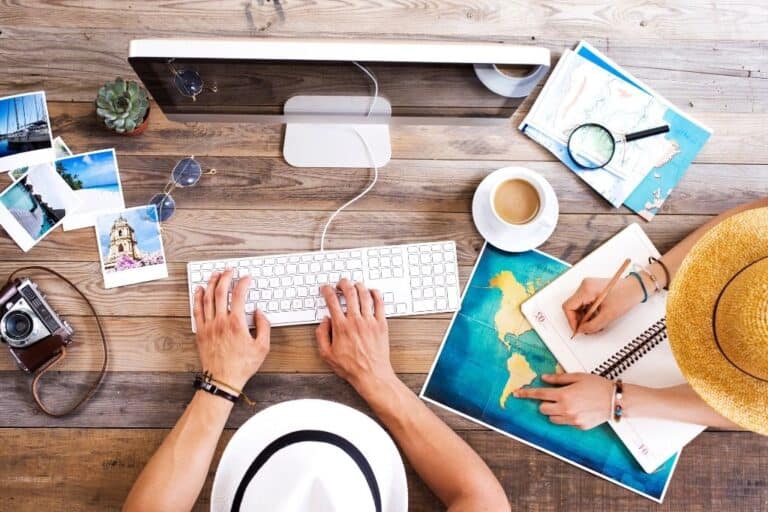
Ultimate Pre-Travel Checklist: Important Things To Do Before Travelling
Planning a vacation? There is so much to think about…
Privacy Overview
Sharing is caring.
Help spread the word. You're awesome for doing it!
Advertiser Disclosure
Many of the credit card offers that appear on this site are from credit card companies from which we receive financial compensation. This compensation may impact how and where products appear on this site (including, for example, the order in which they appear). However, the credit card information that we publish has been written and evaluated by experts who know these products inside out. We only recommend products we either use ourselves or endorse. This site does not include all credit card companies or all available credit card offers that are on the market. See our advertising policy here where we list advertisers that we work with, and how we make money. You can also review our credit card rating methodology .
How to Make a Travel Budget in 2023 [Free Template]
Amar Hussain
Senior Content Contributor
769 Published Articles
Countries Visited: 63 U.S. States Visited: 9
Keri Stooksbury
Editor-in-Chief
31 Published Articles 3100 Edited Articles
Countries Visited: 45 U.S. States Visited: 28
Director of Operations & Compliance
1 Published Article 1170 Edited Articles
Countries Visited: 10 U.S. States Visited: 20
![plan your trip budget How to Make a Travel Budget in 2023 [Free Template]](https://upgradedpoints.com/wp-content/uploads/2022/04/Top-view-tourist-counting-cash-to-spend-during-his-luxury-vacation-planning-budget.jpeg?auto=webp&disable=upscale&width=1200)
Can You Afford to Travel?
The 2 approaches to travel budgets, travel budget template worksheet, passport and visas, travel insurance, vaccinations, clothes, gear, and toiletries, accommodation, local transportation, attractions and activities, walk-around money, gifts and souvenirs, websites to help research travel costs, the best apps for travel budgets and expense tracking, saving for your vacation, final thoughts.
We may be compensated when you click on product links, such as credit cards, from one or more of our advertising partners. Terms apply to the offers below. See our Advertising Policy for more about our partners, how we make money, and our rating methodology. Opinions and recommendations are ours alone.
Creating a travel budget isn’t all about boring spreadsheets and searching for low budget bargains — a finely-crafted budget it is designed to maximize your total travel experience.
Let’s start out easy here. You may have dreams of globetrotting and living your best life in distant lands, but can you actually afford it?
The amount you have to spend on your trip will need to be proportionate to the place you are visiting. By that, we mean that some destinations can be done on the cheap, while others will be a bit more of an investment.
Where you want to stay, what you intend to do when you get there, and physically how far away you will be from home can all have a considerable bearing on how deep your pockets will need to be.
Before you book yourself silly, really break down the potential costs of your dream trip and tally it up with the amount of money you will realistically have to fund it.
Bottom Line: Sometimes, it may be better to put your plans on hold until you have saved up enough cash to really experience a place, rather than rushing to get there and missing out on some of the best bits.
Whether you are a plan-well-in-advance sort of traveler or more of a fly-by-the-seat-of-your-pants kind of person, there are different ways to approach setting out your budget based on what works best for you.
Plan Your Adventure Well in Advance
The most traditional way to book a vacation is to think of somewhere you want to go, plan your vacation dates, and decide how long you want to stay. This kind of advanced planning is the usual go-to for most travelers, as it allows you to book time off of work or plan trips around school semesters, and gives you the opportunity to firm up plans before you leave.
Knowing when and where you are going also has another key advantage — it gives you plenty of time to save up all the cash you will need to really enjoy your time there. Booking in advance also means you get your choice of cheaper accommodation at better rates.
Book months in advance and you can research your planned itinerary and potential expenditure, and maybe even save enough extra for upgrades of luxuries to make your adventure truly special. This kind of planning is a great incentive for saving hard.
Travel Based on Your Bank Balance
If, on the other hand, you want to take your cash and get the hell out of dodge, you can work backward to identify the most amount of fun you can have for your money. If you are feeling lucky, and you know how much you are willing to spend, the world really is your oyster.
The awesome power of the internet has made impulse traveling even easier, as you can simply hit up any number of booking sites to find an exciting destination, as well as suitable flights, accommodation, and excursions in just a few clicks.
Another great way to make your budget go further is to think outside the box. Visiting popular destinations out of season, taking shorter vacation times, or even looking at places away from the main tourist trail can all make your money go further.
A trip to the legendary Yosemite National Park during April or May, for example, is a great way to experience some of the most iconic open spaces in America before the schools let out, or hit the beaches of Miami or the Florida Keys during September and October when tourists shy away from the increased risk of stormy weather.
You can also look at alternatives to the more traditional resort destinations to get more bang for your buck. Consider a trip to Reno instead of Las Vegas, hit the slopes in Winter Park instead of the sky-high prices in Vail, or take in the history of Williamsburg and avoid the price tags of New York or Los Angeles on your next city break.

To help you plan and keep track of your travel budget we have created a free, handy Microsoft Excel spreadsheet.
📋 Click to Download Our Travel Budget Template > 📋
Travel Budget Considerations
When planning your travel budget, there are lots of different things to consider. Break down your budget into subsections to make it easier to plan and stick to:
One of the most essential elements of your travel plan will revolve around the legal and local requirements for travel to and from your destination. You must research any visa requirements and restrictions before you fly, and be sure to have all the documentation you need before you leave.
Most countries will have their own individual and very specific entry requirements, and there may be restrictions on how much local currency you can bring with you, as well as how long you can stay.
As a very rough guide, some examples of the requirements for U.S. citizens could include:
- Travel to Europe — If you are traveling to or through any of the main 26 European countries, you must know the requirements of the Schengen Agreement, which eliminates borders and assumes that travelers will be able to enjoy up to 3-months of visa-free travel. This will change in January 2021 with the introduction of the ETIAS .
- Travel to Australia — You must have a valid U.S. passport and an Electronic Travel Authority (ETA) to enjoy up to 90 days of travel in Australia.
- Travel to Central America — You will not need a visa to visit most Central American countries, but you may need a tourist card for some destinations (~$10) to allow stays of up to 90 days visa-free.
- Travel To South Africa — You must have a valid U.S. passport, but do not need a visa for stays of 30 days or less.
Check out our guide to tourist visa information on over 100 countries.
There are many great reasons why you should always buy travel insurance coverage for your trips overseas, and only 1 reason not to. Trust us. If the worst should happen while you are away, you will wish you hadn’t tried to save money by skipping on the insurance, so make sure you always make space for travel insurance in your travel budget .
The best travel insurance policy does not necessarily have to be the most expensive one you find, but it probably won’t be the cheapest either. With this in mind, shop around and speak to a variety of providers before committing to any 1 product.
There will be different levels of coverage available to suit the requirements of every type of traveler, from lone backpackers to family vacations, but at the very least you should try to include:
- Emergency medical expenses
- Repatriation expenses
- Cancellation or curtailment coverage
- Lost baggage coverage
- Travel delay/missed departure coverage
- Journey disruption coverage
- Personal liability coverage
- Legal expenses coverage
- Electronics loss/theft and damage coverage
Depending on where you go, what you’ll be doing, and the nature of your trip, you may want to also consider dedicated financial protection that could include specific coverage for:
- Winter sports coverage
- Terrorism disruption coverage
- Cruise coverage
- Business coverage
- Sports equipment coverage
It is important to remember that the domestic health insurance that you use at home will not necessarily cover you if you get into medical trouble overseas . Don’t leave it to chance — invest wisely in your travel insurance and never skimp on the coverage just to save yourself a few bucks before you go.
You should also look into insurance coverage for your prized electrical items and personal belongings, too . While we would recommend leaving the diamonds at home, unless you are going somewhere exceptionally glamorous, many of us will take expensive electronics with us everywhere we go.
Find coverage that offers repairs or replacement for damaged, broken, lost, or stolen items before you go.
Hot Tip: There are some credit cards with travel insurance , so you might already have some coverage without knowing it!

Some parts of the world pose more of a risk to our health than others. By ensuring that you have all the travel vaccinations you need before you go, you can reduce the risk of developing serious diseases that your immune system may not be used to.
You can pretty much be vaccinated against all of the world’s most common communicable diseases at your local doctor’s office, health care center, or health department, and there will be medical professionals who will be able to provide you with useful information for your trip.
You will need to do your own research before you travel and speak to healthcare providers about the risks. But, as a rough guide to keep in mind when planning your travel budget, here are some of the most common travel vaccinations and their approximate costs:
- Cholera — A single-dose oral vaccine costs around $45.
- Hepatitis A — A single-dose vaccine costs around $115.
- Japanese Encephalitis — 2 doses given 4 weeks apart costs around $290 per injection.
- Meningococcal Disease — This single-dose vaccine is recommended from pre-teenage years and costs around $135.
- Rabies — A series of 3 or 4 injections into the muscles over the course of 4 weeks costs around $3000 for the entire course.
- Typhoid Fever — A single oral dose for anyone over 6 years old costs around $60.
- Yellow Fever — This vaccine is not stocked everywhere, but if you can find a clinic that offers it, you will need a single shot costing as much as $350.
- Malaria — There is no single vaccine, but antimalarial tablets can be taken to reduce the risk of contracting the disease by 90%. These may need to be taken as far as 3 months in advance and can cost anything from $20 a pack up to $260 per pack.
What you need to take with you will depend very much on where you headed. Whether you choose to travel light or max out your luggage allowance is up to you, but there are plenty of ways to help keep costs down when it comes to packing for your next adventure.
Compile a Capsule Wardrobe
Travel guides always bang on about the legendary “capsule wardrobe” — but it literally is a real thing. By taking 7 or 8 items of clothing with you that can be worn in a variety of ways you can dress for days at a time without worrying about overfilling your luggage or maxing out your travel budget.
Choose 2 pants, skirts or jeans, 3 tops, 1 sweater, 1 dress or a smart shirt and a coat or jacket, and you should be pretty much good to go. Throw in beachwear, sports gear, or thermals as-needed and some socks and underwear to see yourself sorted for the duration of your stay.
Another way to keep costs down is to avoid buying new stuff for every vacation . Your favorite bikini, flip flops, party dress, or even hoodie should be shown off time and time again, so never feel the need to replace your vacation clothing unless you really need to.
Here are some destination-specific packing lists:
- Beach Vacation Packing List
- Cruise Vacation Packing List
- Disney Vacation Packing List
If you want to take your travel camera with you, your GoPro for awesome live video, your phone, tablet, laptop, headphones , or any other bits of kit — think carefully about whether or not you really need it.
Taking more expensive gear with you increases the risk of stuff getting lost, broken, or stolen, as well as weighing your luggage down and tying you to charging ports and electrical sockets.
Keeping Clean
Most people like to have their favorite toiletries with them, but save money and space in your luggage by not taking full-size products.
You needn’t even worry about wasting money on cute little travel size products either. Simply decant your full-size bottles and pots into smaller travel containers instead . This is super easy to do, meets with TSA regulations, and saves you a few dollars here and there.
Alternatively, buy what you need when you arrive. Most destinations and airports will have plenty of shops to choose from. One area where you shouldn’t cut costs, however, is sunscreen. Buy the best you can, ideally from a trusted brand, before you leave.
Finally, check if the airline you are using charges extra for checked baggage and if so, see if you can get away with just a carry-on case instead.
The amount you pay for your flights will vary widely depending on a wide number of variants, including:
- Your destination
- Who you choose to fly with
- Whether you fly direct
- Whether you fly return or one-way
- The day of the week and time of day that you fly, and even the time of year
- Where you fly from
- When you book
There are many different ways to fly around the skies, but here are some ways to bag cheaper flights :
- Use Points and Miles — If you aren’t accumulating points to fly, read this beginner’s guide to get started.
- Book as Early as You Can — Flights often significantly increase in price within 3 weeks of the departure date.
- Stay Flexible — Flights leaving on different days or at times of day can be cheaper than others.
- Don’t Dismiss Discount Airlines — Short journeys, internal flights, and even some international journeys can be way cheaper on discount, no-frills airlines.
- Sign Up and Shop Around — Sign up with airlines direct to be notified of discounts and flash sales, and be sure to check in on all airlines that fly to your preferred destination.
- Use Aggregation Sites — Sometimes this is a winner, sometimes it isn’t — but don’t be afraid to try. Sites like Kayak or Skyscanner can be good, but don’t just accept the first price they give you.
- Buy Connecting Flights — It can be cheaper to buy 2 separate connecting flights than a direct 1. Check your destination and see who stops where along the route.
Again, how much you spend on where you stay is entirely up to you. Keeping costs down can be harder in large cities or expensive beach resorts, but there are ways to rest your head without losing your mind over the cost of it all.
Whether you are going for an all-out 5-star luxury or a family-friendly motel room, there are always deals to be had. Book direct through the hotel, include weeknights or a Sunday night in your stay, and be flexible on location.
Hot Tip: A hotel just outside of town, for example, will offer more attractive nightly rates and free parking and will usually represent better value for money than a downtown hotel will.
Renting a private home or vacation apartment on a short term basis can be much more affordable than a hotel. You can also find some superb properties for rent, complete with everything you need to enjoy your stay.
Fully-equipped kitchens, parking, TVs, and even pools often come standard and depending on your destination, there are lots of great Airbnbs and other holiday rental websites available.
If you are heading to the coast, the backcountry, or just getting out into the great outdoors, camping can completely transform your experience. Many campsites come complete with showers and cooking facilities and even pools, sports facilities, and fitness centers. You can take your own tent or rent one.
Another great way to save money on accommodation is to look at hostels in the area. A far cry from old fashioned student accommodation, many modern hostels are clean, bright, and modern and offer a combination of dorm-style bedrooms and private double or family rooms with en-suite facilities.
Hot Tip: Hostels are a great way to stay right in the middle of some of the most expensive cities in the world.
Rent a Recreational Vehicle
Another great choice if you are heading out on the open road, RVs can save you a fortune as you literally take your accommodation with you. RV trips are fun, family-friendly, and provided you aren’t always in a gas station, a great way to save money on where you stay.
RVshare and Outdoorsy are 2 companies that rent out campers and RVs.
You can pretty much rent any kind of vehicle , anywhere in the world. Although if you are staying in a city, public transport is a much more useful and affordable proposition.
The same rules also apply to some intercontinental trips, as well. For example, it can be easier and cheaper to travel through Europe using trains and buses than worrying about having to take care of a car when you get there.
If you want to explore out of the way destinations, hard to reach beaches, or just like the idea of being free to come and go as you please, car hire is readily available in most corners of the world.
Before you commit to it, think about the rental fees, fuel costs, and other potential expenditures and compare the costs of using public transport in your chosen destination.

Car hire here in the U.S. will vary depending on the type of car you choose and how long you intend to hire it. Small city cars are the most cost-effective, and big SUVs, 4x4s and luxury cars can also be hired if you have deep pockets.
When it comes to car rental, keep your costs down by:
- Booking your vehicle in advance
- Looking outside the airport as you may get a better deal in town
- Choosing a practical vehicle to suit your needs, not your dream supercar
- Being aware of mileage limits and one-way fees
- Use a credit card with car rental insurance , so you can be ready to turn down unnecessary add-ons and cross-sells that you don’t need
- Making sure the vehicle is checked for damage before you take the keys
- Only hiring it for as long as you need it
- Keeping your eyes out for deals on particular types of car, and better prices for longer-term rentals
Most tourist hotspots, big towns, cities, and even some iconic landmarks will offer a wide range of public transport options to get you around. There will be more choice and more frequent services in highly populated areas, while services may become more restricted further out in the countryside or suburbs.
If you are clever, you could save yourself a small fortune by grabbing good deals on public transport, leaving you with more cash to spend on the fun things in life.
Try these to tips for traveling around town on the cheap:
- Buy daily, weekly or even monthly travel passes in advance
- Bulk buy tickets online or via an app
- Take advantage of student passes or discounted fares for families, seniors, or children
- Avoid traveling during peak commuter times
- Services like Greyhound offer cheaper fares for mid-week journeys
- Sign up for early notification of flash sales and other promotional codes and discounts
Wherever you are headed, there will no doubt be plenty of things to do and places to see when you get there. The key to not missing a single thing is researching everything before you leave.
Have a plan in place of all the activities you want to take part in and the attractions you want to see and integrate the potential entrance costs, additional fees, and other expenses into your initial budget.
With a bit of luck, you will be able to find plenty of local discounts, city passes, and money-saving ways to see all of the very best attractions at rock bottom prices.
Pick up a copy of the local listings magazine or newspaper and check out free events , as well as using the coupons and discount codes they supply for all kinds of attractions. You can also subscribe to online discount sites like Groupon to find discounted ticket prices.
Historical landmarks, museums , art galleries, theme parks , sporting events, concerts, and many more attractions often offer reduced entrance prices at off-peak times or group discounts to entice visitors in. Some even have a free entrance day once a month.
Big cities often have lots of free entertainment on offer, too. Check out the artsy districts of major cities for street entertainers and free shows. If you are heading to the beach, research costs such as sunbed rental, locker rental, and even the menus at local restaurants to gauge an idea of how much a day on the beach could potentially cost you.
If you want to try your hand at surfing, sailing, or other kinds of water sports, you may want to get back on the internet and find reduced price lessons or discounts for group bookings.

While you may have budgeted every dollar down to the last cent, you should also keep a contingency plan for some pocket money . Days out in the town, lazy afternoons on the beach, or even a trip on a planned excursion can present you with lots of little unknown expenses.
Whether you need to buy an extra bottle of water, some sunscreen for your face, or entrance to additional attractions, keeping a little cash on you is a good way to be prepared.
Large amounts of cash should never be carried about your person while you are out exploring, but a couple of dollars stashed into your pocket or travel wallet and can be incredibly useful.
In order to keep your money safe, you should:
- Never flash wads of cash
- Keep your notes and loose change somewhere safe like your inside pocket or in a money belt
- Carry small denomination notes and coins
- Understand the local currency you are carrying, so you known how much to give over when paying
Walk-around money is simply a little buffer to keep you going, but set yourself a daily budget and stick to it.
These days, almost everyone travels at some point. This means that those unusual and unique products that we used to buy as souvenirs are no longer as sought after as they once were.
Nearly every tourist destination on earth will be able to sell you tacky bits and pieces for you to take home, but savvy travelers bypass these and look for more personalized and unique mementos to take home with them instead.
Bottom Line: A t-shirt here, a guide book there, and lots of little bits and pieces in between can soon add up. Spend wisely, and if you must buy gifts and souvenirs, choose ones that have a special meaning to you, that you can treasure forever.
To help make your research easier, some clever folks who have traveled before you have made websites that can help you to research and plan every single aspect of your next big adventure and what the costs involved may be.
Budget Your Trip
Budget Your Trip is a huge repository of travel costs that have been hand-gathered from thousands of travelers, and now provides an incredibly comprehensive guide to how much your trip will really cost you.
You can create and personalize your very own travel budget once you register with the website. You can also pick up tons of top travel tips and advice for both new and experienced travelers alike.
Nomad List offers a heap of resources and information for remote workers, digital nomads, and travelers, Nomad List is designed to help users navigate the world. Find information on thousands of destinations, places to work, neighborhoods to stay, and even make new friends before you go.
A great site for anyone who wants to work and travel for longer-term adventures, you can ask questions and arrange meet-ups to touch base with other like-minded wanderers.
This clever little website has 1 goal in mind — to let you know exactly how much money you really need to stay at your dream destination. Expatistan offers direct comparisons between different locations and the website is essentially a giant cost-of-living database that is updated and improved on a regular basis.
Using collaborative information garnered from expats from all over the world, this website really will give you the lowdown of where you can, and can’t, afford to be.
Keeping track of your expenses using your bank balance alone can be a real pain. A dedicated travel money app will help you to keep control of your finances, even when you can’t check the internet. Here are some of the best:
Trail Wallet

This easy to use expense tracker is a great way to keep an accurate record of your finances on the go. Designed to be incredibly intuitive and easy to use, you can make a note of all your expenses in a way that makes the best sense to you. Set up daily spending limits, view records of your recent outgoings, and upload images of receipts for multiple trips with custom start and end dates.
Perfect for use both at home and away, this clever little app will even let you input amounts in local currencies from over 200 countries , and you can update the app with the current exchange rate.
Trail Wallet can be used on both iPhone and iPad and is free for up to 25 items, or unlock unlimited amounts for continuous travel with the $4.99 upgrade.
Trabee Pocket

Trabee Pocket is available on both iOS and Android, and you can choose between the free version or additional services in the paid-for version. Even with the basic version, you can add the details of as many expenses as you like, covering various trips and destinations. You can choose your currency, and there are 8 basic categories to file your virtual expenses under.
You can add images of the physical receipt and produce an expense report and breakdown of expenditure using the data from each category . The upgrade costs around $2.49, and you can add multiple currencies and additional customized categories.
All in all, Trabee Pocket is sleek and an easy to use app that helps you to see how much you are spending and where you are spending it.

TripCoin is a concise and easy to use app that is available on iOS only. It is free to download , and there are no upgrade options at the present time. This smart app allows you to keep tabs on your spending at the touch of a button while making is super easy to add new entries when you need to.
Summary reports can quickly be compiled to let you see progress reports and spreadsheets, and you can even export the data to Excel, Numbers, Open Office, or Google to keep your inner accountant happy anywhere in the world.

Wally was designed to help anyone to manage their finances, anywhere in the world easily. It promises to offer a simple, seamless tool that works in an intuitive way, making it super easy to keep track of your money on the move.
The basic version allows you to add details of all of your regular incoming and outgoings as well as inputting your day to day expenditure, creating groups to manage joint accounts, and splitting payments with your friends when you need to.
It can be set to your local currency and lets you divide your outgoings into easy to find pre-set categories. Available on both iOs and Android, you can upgrade to the paid-for version for $24.99 a year to enjoy unlimited trips and categories.

This is a brilliant invention for anyone traveling with friends. Available on both iOS and Android, you can download it for free, but an in-app upgrade is available to Splitwise Pro. No more scrambling around with a pen and paper to split the bill, this app allows you and your buddies to keep track of your shared expenses and balances at the touch of a button.
You can add a bill, and choose how to split it, or send text or email requests to remind your friends and family that payments are now due. You can also categorize your expenses, calculate amounts in over 100 different currencies, and even sync all of your expenditures with the Cloud.
If you want to keep a more detailed record of your accounts, this little app will also export the data into easy to read CSV reports.
Before you worry about how to manage your finances while you are away, you will need to devise a plan that gives you the funds to get you there in the first place. Unless you have been blessed with a sudden windfall or a lottery win, you will need to save your cents to achieve your goals.
Set a Savings Timeline
If you receive a regular wage, or you are able to forecast your earnings accurately, you can start to set a timeline on how long it will take you to save up for your vacation . If you put aside just $100 a month, for example, you will be able to have $1200 to play with in just a year. This amount may not pay for a new life abroad, but it could you buy a week by the ocean.
Bottom Line: Think of where you want to go to, find out how much it will cost, and then set a monthly savings goal and stick to it. Some months you may have to sacrifice on your social life or shopping habits, but it will all be worth it in the end.
Multiple Savings Accounts
Once you know how much you need to save each month, be sure to physically remove that money from your day to day bank account. Set up at least 1 separate savings account and electronically move it , or set up an automated payment to leave your regular account on payday.
Visualization
Re-train your brain to save instead of spend, and you will be able to tally up every cent you save with something amazing . Your first $150 saved, for example, could mean that you have those tickets for that boat party in Miami in the bag, or that you are on your way to paying for a 4-star hotel instead of a mid-range one.
Whether you are dreaming of trekking up the Himalayas, backpacking around Asia, Interailing through Europe , or a long-awaited family vacation, seeing what your savings can afford will super motivate you to save more.
Wherever you are planning on traveling to, being in control of your finances will make your experience even more amazing. Worrying about getting into debt on your credit cards or not having the cash in your pocket to really explore the region will ruin your adventures.
Save hard, spend well, and look for ways to save money across every aspect of your trip. Plan your spending before you go and keep track of your expenditure while you travel. There are deals to be had on flights, accommodation, food, attractions, and almost every area of your next vacation. Plan in advance and enjoy knowing that you are having the best time for less.
Frequently Asked Questions
Where can i travel with a low budget.
There are plenty of excellent places to travel on a low budget. Here are some great options:
- South Africa
How much should I budget for a trip?
There are lots of factors that make up how much you should budget for a trip. Where you are going, the time of year, your travel style, what you want to do, and how long are you going for are just some of the considerations. It’s best to work out exactly what the trip would cost, cut out anything you can do without, and go from there.
How do I stick to a budget while traveling?
The best way to stick to a budget while traveling is to keep track of all your expenses so you know exactly where you are against your budget. The easiest way of doing this is to use a travel budget and expenses up like Trail Wallet, Trabee Pocket, or Tripcoin.
Was this page helpful?
About Amar Hussain
Amar is an avid traveler and tester of products. He has spent the last 13 years traveling all 7 continents and has put the products to the test on each of them. He has contributed to publications including Forbes, the Huffington Post, and more.
INSIDERS ONLY: UP PULSE ™

Get the latest travel tips, crucial news, flight & hotel deal alerts...
Plus — expert strategies to maximize your points & miles by joining our (free) newsletter.
We respect your privacy . This site is protected by reCAPTCHA. Google's privacy policy and terms of service apply.
Related Posts
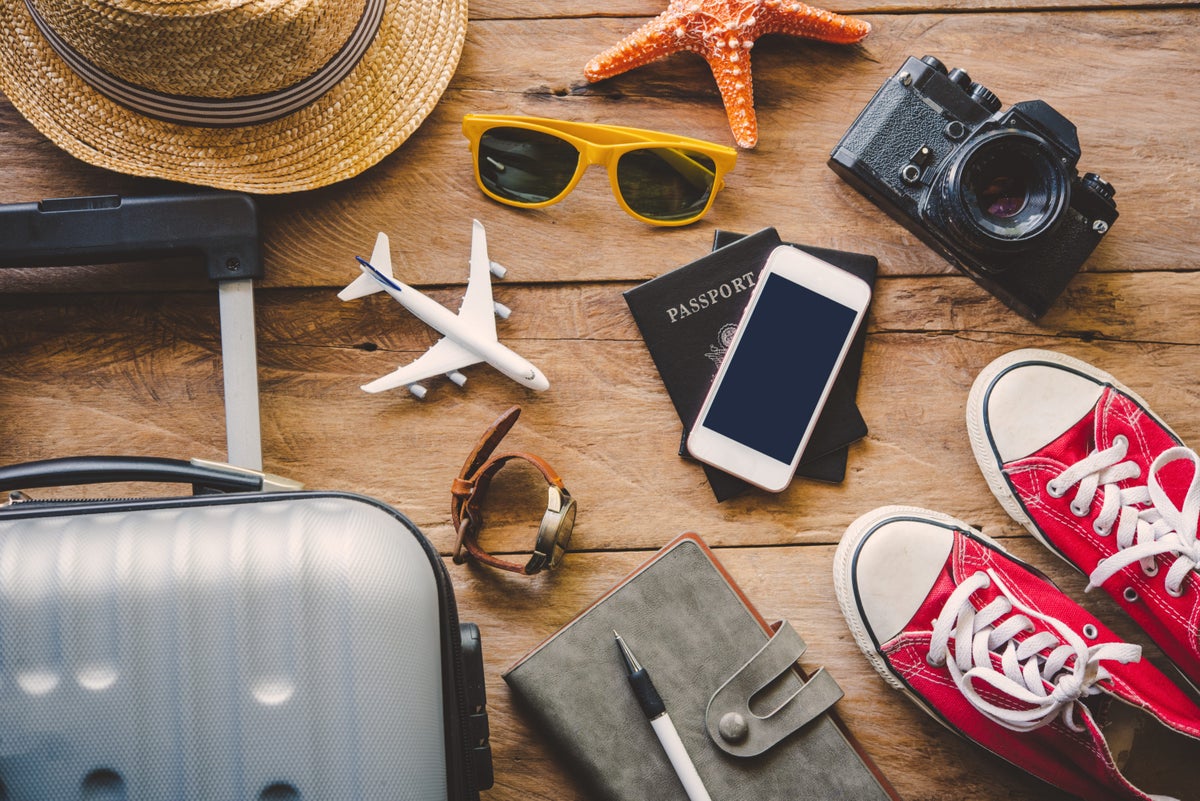
UP's Bonus Valuation
This bonus value is an estimated valuation calculated by UP after analyzing redemption options, transfer partners, award availability and how much UP would pay to buy these points.
Travel Budget Calculator
Your ultimate guide to smart travel planning.

Planning a trip can be exhilarating, but it often comes with the stress of managing finances. Fear not! With the Travel Budget Calculator, you can embark on your dream journey with confidence. In this guide, we’ll delve deep into the intricacies of budgeting for travel, empowering you to make informed decisions and maximize your experiences.
Understanding the Travel Budget Calculator

Embarking on a journey starts with meticulous planning, and the Travel Budget Calculator serves as your trusty companion. This tool revolutionizes the way you approach travel expenses, offering a comprehensive overview of your financial landscape. By inputting essential details such as number of nights, duration, accommodation preferences, and activity interests, the calculator generates a personalized budget tailored to your preferences and constraints.
Benefits of Using the Travel Budget Calculator
Planning your itinerary can be overwhelming, but the Travel Budget Calculator simplifies the process. Here’s why incorporating this tool into your travel planning arsenal is a game-changer:
- Efficiency in Planning: Say goodbye to tedious spreadsheets and guesswork. The Travel Budget Calculator streamlines the planning process, providing instant insights into your projected expenses. With a few clicks, you can fine-tune your budget and allocate resources efficiently, ensuring a hassle-free travel experience.
- Financial Transparency: Transparency is key to effective budgeting, and the Travel Budget Calculator offers just that. By breaking down expenses across various categories such as transportation, accommodation, dining, and activities, you gain a clear understanding of where your money is allocated. This transparency empowers you to make informed decisions and prioritize experiences that matter most to you.
- Flexibility and Customization : No two travelers are alike, and the Travel Budget Calculator recognizes that. Whether you’re a budget-conscious backpacker or a luxury seeker, this tool adapts to your preferences and constraints. Adjust parameters such as accommodation standards, dining preferences, and activity intensity to tailor your budget to your unique travel style.
Travel Budget Calculator: Your Key to Financial Freedom
In conclusion, the Travel Budget Calculator empowers you to embark on unforgettable journeys without compromising your financial stability. By leveraging its capabilities and implementing savvy budgeting strategies, you’ll unlock a world of possibilities and create cherished memories that last a lifetime. So, what are you waiting for? Start planning your next adventure today and let the Travel Budget Calculator be your guiding light.
FAQs About Travel Budget Calculator
Below are some basic questions that arise while using a travel budget calculator.
Q. How does the Travel Budget Calculator work?
A. Calculating a travel budget isn’t rocket science; it’s just simple math. As we know, if we have exact numbers in front of us, decision-making becomes much easier. A Travel Budget Calculator simply provides us with all the expense numbers.
Q. Is the Travel Budget Calculator suitable for all types of travelers?
A. Absolutely! Whether you’re a budget-conscious backpacker, a luxury seeker, or somewhere in between, the Travel Budget Calculator adapts to your preferences and constraints. Simply adjust the parameters to align with your unique travel style and embark on your adventure with confidence.
Q. Can I trust the accuracy of the Travel Budget Calculator?
A. Yes, the Travel Budget Calculator is designed to provide accurate and reliable estimates based on the information provided. However, it’s essential to factor in unforeseen expenses and fluctuations in prices to ensure comprehensive budget planning.
Q. Can I save my budgeting preferences for future use?
A. Unfortunately, the Travel Budget Calculator does not currently offer a save feature but you can download it. However, you can easily recreate your budgeting preferences each time you plan a trip by inputting the relevant details into the calculator.
Q. How frequently should I update my travel budget?
A. It’s advisable to review and update your travel budget regularly, especially as your trip approaches and circumstances change. Factors such as fluctuating exchange rates, last-minute bookings, and unexpected expenses can impact your budget, so staying proactive is key to financial planning success.
- EN - English
- PT - Portuguese
- ES - Spanish
- How it works
- Become a Host
- Download the app
Top Destinations
- United States
- United Kingdom
What type of experience are you looking for?
- Non-Profit School
- Permaculture project
- Eco Village
- Holistic Center
- Guest House
- How Worldpackers works

Learn from the most experienced travelers of the community
Traveling with worldpackers, planning and budgeting for travel, make a living while traveling as a lifestyle, travel with worldpackers.
- Using Worldpackers
- Work exchange
- Social impact
- Plan your trip
- Women traveling
- Budget travel
- Solo travel
- Language learning
- Travel tips
- Get inspired
- Digital nomads
- Travel jobs
- Personal development
- Responsible travel
- Connect with nature
Top destinations
- South America
- Central America
- North America
- More destinations
- WP Life WP Life
- Exclusive discounts Discounts
A beginner's guide on how to plan your travel budget
Learn how to plan a budget for any vacation, including what to plan for in your budget, how to determine your daily budget, and how much money you should have available in case of emergencies
Sep 24, 2023
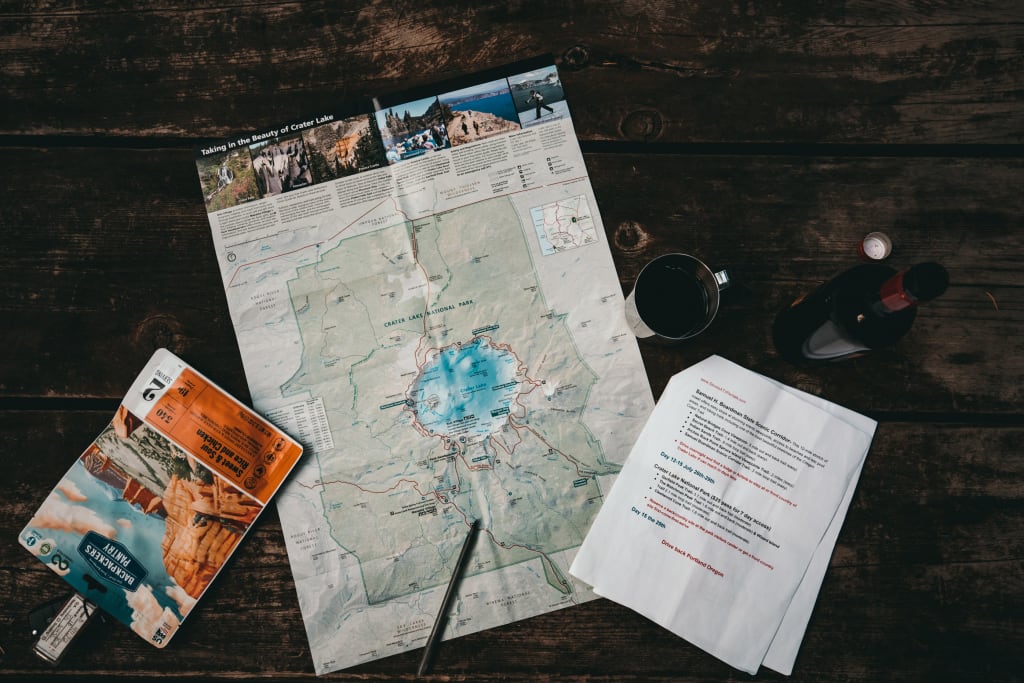
What's the best way to ruin an amazing vacation? By running out of money before it's over!
Let's face it: budgets are a boring, yet necessary part of the travel planning process. You do not want to be in a foreign country and realize that you have no money left for food for the last three days of your trip.
Put in a little thought and effort before you leave, and you'll save a whole lot of worry while you're there!
There's so much to consider when planning a trip budget , and it can feel overwhelming at first. No worries, though, because I'm here to help! Today I'm going to share my approach to creating a travel budget.
How to budget for your travel
When creating a travel budget, I separate expenses into three categories:
- Preparation Expenses
- Actual Vacation Expenses
- Emergency Funds
You might also like: The greatest travel hacking guide you need for a stress-free trip
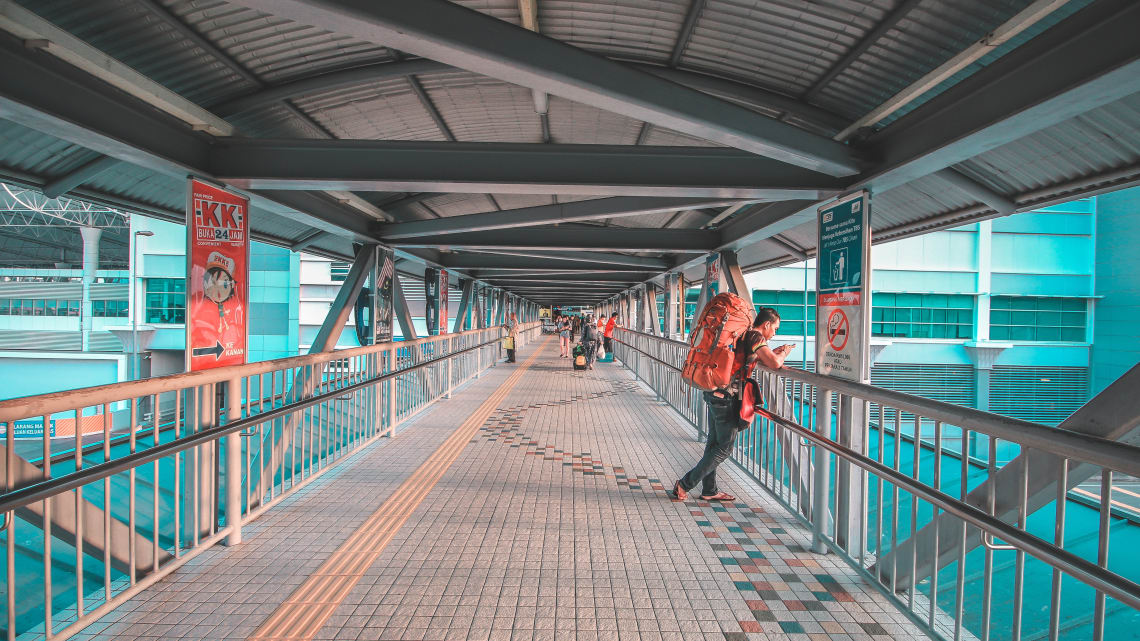
1. Preparation Expenses
Preparation Expenses include all the money you must spend before you leave for your trip . Here are some examples of what will be included in your preparation expenses:
Passport and Visa
These costs will vary greatly, depending on where you live and where you are traveling, but there's no way around them so be sure to do your research and make room for your passport and necessary visas in your budget.
Travel Insurance
While travel insurance is not, strictly speaking, required, it is definitely a good idea. Especially if you will be traveling long-term, you should at least research your options. If you're traveling for more than a week, I highly recommend at least purchasing health insurance.
You never know what might happen when you're abroad, and you certainly do not want to come home with thousands of dollars owed to a foreign country, all because you slipped on a rock while hiking or drank some unclean water. There are plenty of affordable options available.
Vaccinations
Vaccinations are usually relatively cheap, but they can save a whole lot of trouble later so go ahead, look up which ones are recommended for the areas you'll be traveling, and add them to your to-do list and budget.
Luggage/Travel Gear
This is a very broad category, and it will depend entirely on what you already have and what you personally deem necessary. Suitcases, backpacks, money belts, cameras, international phone plans, activity-specific gear (for example, hiking boots, sleeping bags, etc.), neck pillows, basically whatever you need to make your life easier/more enjoyable while traveling goes in this category.
Transportation
Here you will include the cost of planes, trains, and automobiles to get you where you want to go. Include major travel routes, not inner-city transportation here.
This list seems quite extensive, but the good news is you likely already have many of the more expensive items on the preparation list, such as a passport, luggage, and camera. Even if you don't, they can be considered investments for future travel as well.
More useful tips on Adventure planning: the best guide for your backpacking trip .
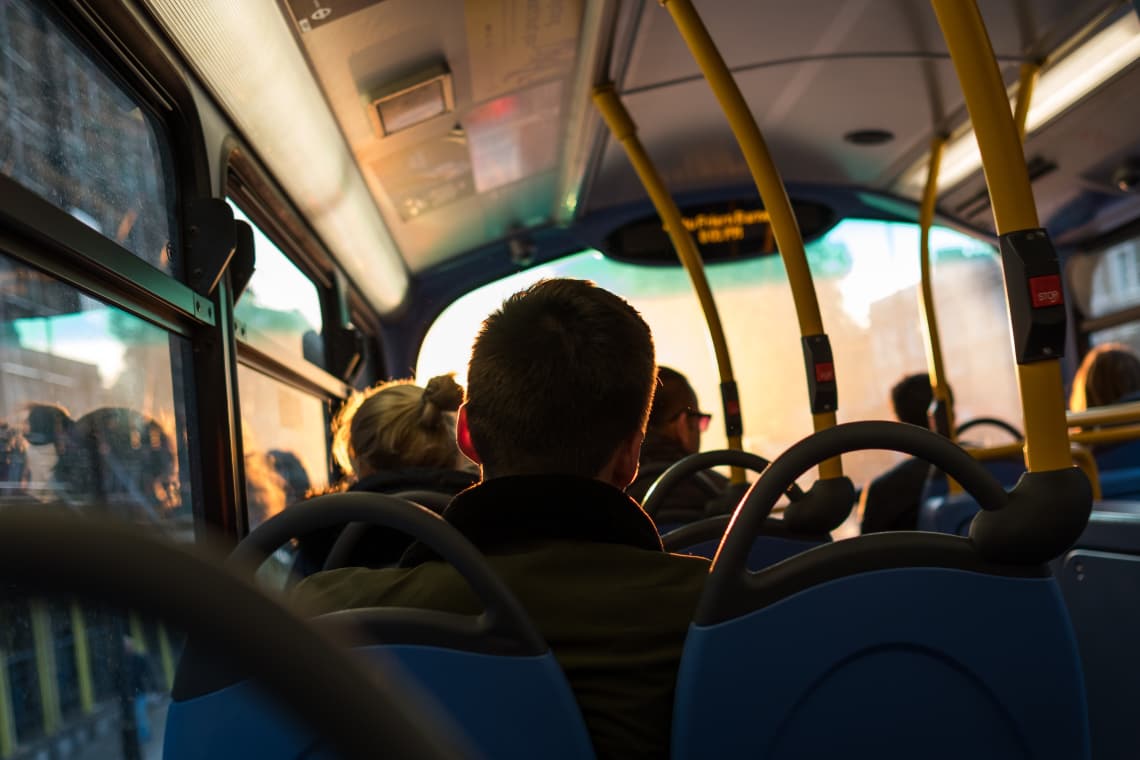
2. Actual Vacation Expenses
The next category, Actual Vacation Expenses, will look like this:
Accommodations
Where will you be sleeping? Luckily, you're on Worldpackers, so there's plenty of opportunities to keep this expense at $0 through work exchange.
Otherwise, this will be one of your biggest expenses. When planning, look up actual rates for your exact dates and destinations, as this can vary hugely depending on the time of year and other factors.
Food and Drink
There is a lot of great information on how much you should budget for this, depending on your destination, on the internet. Consider whether and how much alcohol you plan to consume and whether your accommodations offer free breakfast when planning your meal budget.
Tours/Activities
The best way to plan for this is to make a list of all the activities and tours that you would like to do while you're vacationing and how much they cost
Small Transportation
Consider whether you'll be walking or whether you'll require a taxi or other means of transportation within your destination city and how much that will cost. Other options could include bicycle or motor scooter rentals.
This will depend on how many souvenirs you plan to purchase and what types. Familiarize yourself on Customs Duty regulations so there are no surprises upon reentry to your home country.
The upside is: this part of your budget should be much more fun to plan!
Once you have a total for this part, divide it by the number of days that you will be traveling.
For example: if I am vacationing for 10 days and the Vacation Expenses part of my budget totals $600, my math would look like this:
$600 total/10 days = $60/day
By dividing your budget into a set amount per day, it will be easier for you to keep track of your travel budget .
There will likely be days where you spend a little more or a little less than your daily budget, but as long as they balance out there's no need to worry.
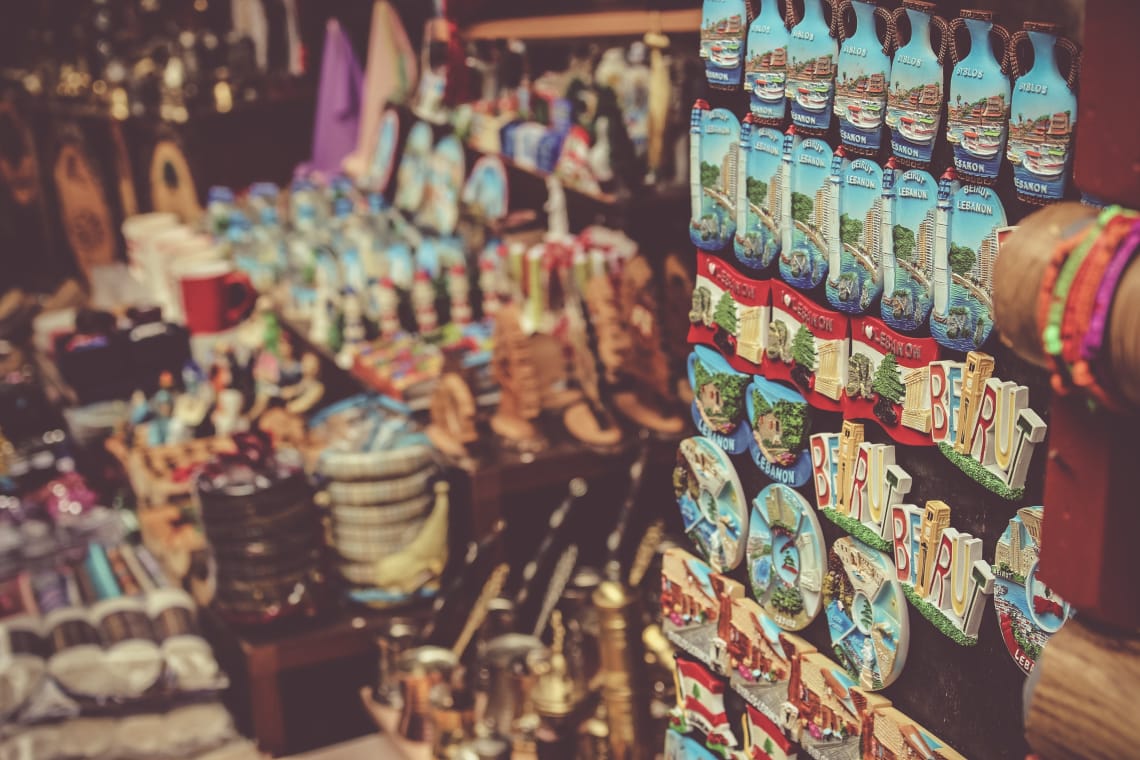
3. Emergency Funds
Finally, we have Emergency Funds. This is the money that you will have available but separate in case of emergency: stolen or lost credit cards, unforeseen but unavoidable expenses, etc.
I recommend keeping emergency funds in cash and separated into two to three different stashes, kept in separate places during your trip.
The reality is, unexpected expenses come up more often than not, and you should always have a backup plan! I recommend budgeting at least enough money for a couple days' meals and a couple nights' accommodations, as well as an emergency plane ticket back home, should you need to leave early.
Extra: money saving tips!
If your budget is coming out to be too expensive, consider these money saving tips:
- If your accommodations are too expensive, have you considered work exchange ? Hostels ? Airbnb ? Couchsurfing ?
- A good way to save money on food and drink is to lower your alcohol intake and shop for food at markets that you can prepare for yourself instead of eating out for every meal.
- Are you traveling during the high season? If so, that can affect the price of transportation, especially flights, accommodations, even activities and food sometimes! Consider visiting during a quieter time of year to save money.
Take your time when budgeting your trip. Plan carefully and be aware of how much you spend each day , and you will have a great time with no money worries! If you still need more help on how to lower your budget, check out my article about 7 actionable ways to save money while traveling!
Join the community!
Create a free Worldpackers account to discover volunteer experiences perfect for you and get access to exclusive travel discounts!
Kimberli Brown
I recently quit my day job to chase my dream of traveling full-time.
Be part of the Worldpackers Community
Already have an account, are you a host, leave your comment here.
Write here your questions and greetings to the author
Aug 01, 2020
Nov 08, 2020
Very needful advice! Loved it!
May 04, 2023
Jul 18, 2023
So helpful. Definitely going to plan how much I’ll spend per day to help budget!
More about this topic

How to choose the best SIM card for international travel
Worldpackers
Top spring break ideas for an unforgettable vacation, your ultimate guide to finding a home away from home, how do worldpackers trips work.
As a member, you can contact as many hosts and travel safely as many times as you want.
Choose your plan to travel with Worldpackers as many times as you like.
Complete your profile, watch the video lessons in the Academy, and earn certificates to stand out to hosts.
Apply to as many positions as you like, and get in contact with our verified hosts.
If a host thinks you’re a good fit for their position, they’ll pre-approve you.
Get your documents and tickets ready for your volunteer trip.
Confirm your trip to enjoy all of the safety of Worldpackers.
Have a transformative experience and make a positive impact on the world.
If anything doesn’t go as planned with a host, count on the WP Safeguard and our highly responsive support team!
After volunteering, you and your host exchange reviews.
With positive reviews, you’ll stand out to hosts and get even more benefits.
- Credit cards
- View all credit cards
- Banking guide
- Loans guide
- Insurance guide
- Personal finance
- View all personal finance
- Small business
- Small business guide
- View all taxes
You’re our first priority. Every time.
We believe everyone should be able to make financial decisions with confidence. And while our site doesn’t feature every company or financial product available on the market, we’re proud that the guidance we offer, the information we provide and the tools we create are objective, independent, straightforward — and free.
So how do we make money? Our partners compensate us. This may influence which products we review and write about (and where those products appear on the site), but it in no way affects our recommendations or advice, which are grounded in thousands of hours of research. Our partners cannot pay us to guarantee favorable reviews of their products or services. Here is a list of our partners .
How to Travel on a Budget for Beginners

Many or all of the products featured here are from our partners who compensate us. This influences which products we write about and where and how the product appears on a page. However, this does not influence our evaluations. Our opinions are our own. Here is a list of our partners and here's how we make money .
Wondering how to travel on a budget? While it may seem like traveling is exclusive to those with cash to spare, you don’t have to overspend in order to get out of town. There are plenty of ways to travel on a budget — including using reward points or miles and traveling during ideal times— that can end up saving you a lot of money. Here's travel guide for beginners on a budget.
Start planning early
If this is your first big trip, odds are you’ve already started planning. That’s good — the sooner you start, the more time you have to save money . Travel prices rise and fall with demand, and the cycle fluctuates as your travel dates get closer.
Beginning your planning early gives you the best chance of finding discounted hotel rooms, cheaper flights and other less-expensive activities. Although you won’t find the cheapest prices far out in advance (as we mentioned, it’s a cycle) keeping an eye on rates will allow you to jump on them and book when they drop.
» Learn more: How to account for inflation in your travel budget
Book at the right time
This bears repeating. Why? Because when you book and when you travel can make a huge difference in the price of your vacation. This applies to flights and hotels.
Confused about when the "right time" to book will be? There are multiple free tools available online to help you.
One of the easiest to use is the price tracking tool available via Google Flights. This service lets you know how the fare you’re looking at purchasing compares with past pricing. It also lets you know if rates are high or low compared with average costs.
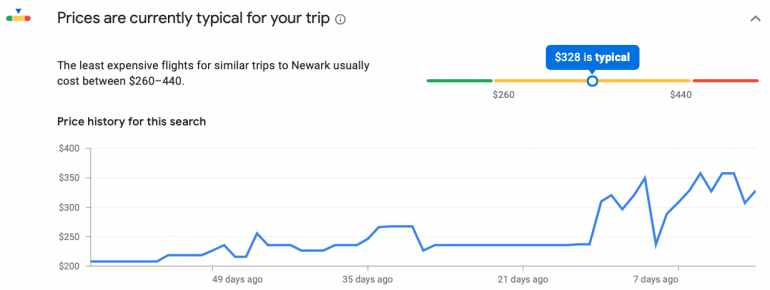
If the flight you’re considering does appear to be expensive, Google Flights also features a price tracker alert system that will email you when fares drop. You can toggle this feature on within the search bar.

According to Expedia, the best day of the week to buy your airline ticket is on Sunday.
Skip overpriced tours
There’s nothing like getting out into a new city to explore. But how much of that exploring can you do on your own? With the information available online, it’s simple and easy to conduct your own tour for free rather than paying for a guide.
If this doesn’t sound appealing to you, consider instead one of the many free tours that many major cities offer. These walking tours will give you tons of information about the area completely free of charge, though gratuities are welcomed.
Otherwise, apps such as Spotted By Locals , Tripadvisor and Rick Steves offer comprehensive information for many large cities. Often this is free, but sometimes you’ll need to pay a nominal fee.
Use reward points
One of our favorite ways to save money includes redeeming reward points for travel. Some of your biggest expenses, such as hotels and flights, can be wiped away by using reward points during your trip.
This type of travel takes planning; you’ll need to accrue enough points to make a travel redemption. Much of the time, this is accomplished through welcome bonuses earned when you open a travel credit card .
For example, a round-trip flight from Los Angeles to Paris costs $1,255 at the beginning of November 2022.
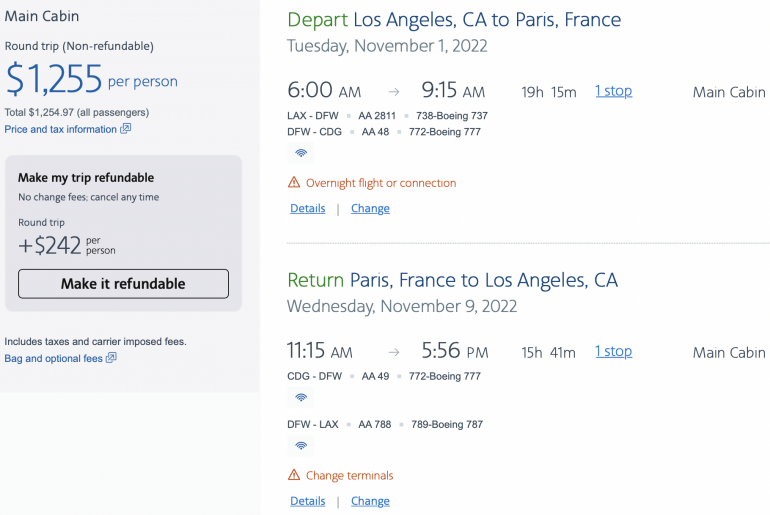
This same flight can be booked using 45,000 American Airlines miles .
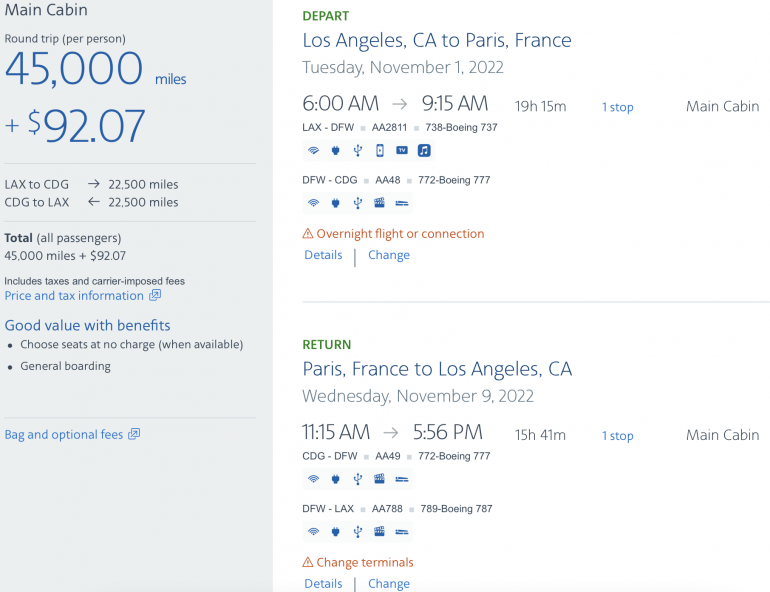
While 45,000 miles may seem like a lot, you can earn this amount of miles with ease. For example, you can earn more than enough miles needed for this flight with the AAdvantage® Aviator® Red World Elite Mastercard® welcome bonus: Earn 50,000 AAdvantage® bonus miles after making your first purchase and paying the $99 annual fee in full, both within the first 90 days. The first purchase could be a stick of gum or a cup of coffee — it doesn’t matter.
Many co-branded airline credit cards also offer perks like free checked bags and priority boarding, saving you time and money.
The same can be said of hotel credit cards . Most major hotel chains have co-branded credit cards, including Hilton , Marriott , IHG , Hyatt , Choice and Wyndham . These credit cards — and their sign-up bonuses — can go a long way toward cutting costs on your vacation.
Even better, many of these credit cards offer complimentary elite status . Elite status can grant you perks such as free breakfast, room upgrades, free WiFi and late checkout.
It’s a good idea to consider booking hotel rooms using points, especially for budget family travel. Sometimes hotels charge more for additional people in your room, but these costs won’t translate to reward redemptions. You’ll generally pay the same standard price as long as you can all safely occupy the room.
» Learn more: The best travel credit cards right now
Travel in the off-season
Along with using reward points, taking your trip during the offseason is another excellent way to save money. Each destination has a peak period of demand during which prices will be inflated.
This will include flights, hotels, tours and even dining, making traveling on a budget difficult. In Europe, the high season is in the summer, when most people come to visit.
During this time, flights will be at their most expensive. Remember the above example featuring that flight to Paris for $1,255? A similar flight during peak season will cost $2,070 round trip.
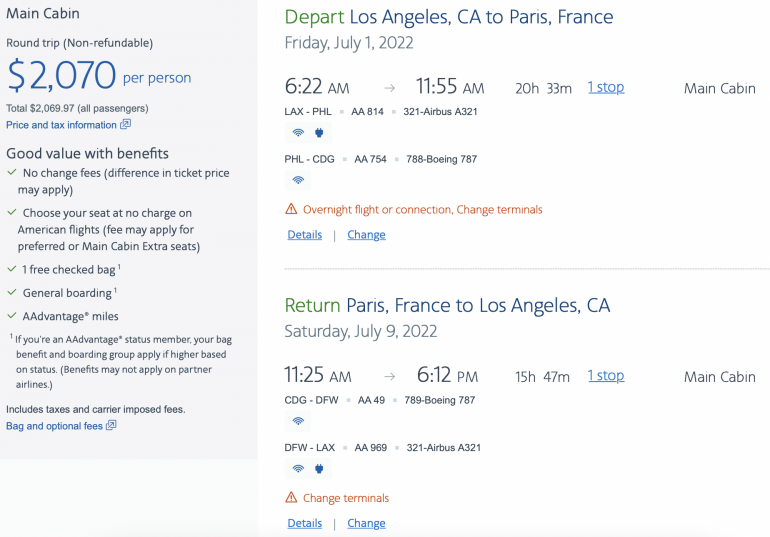
As you can see, even if you’re paying cash for your flights you’ll be saving over $800 by taking your trip when demand is lower.
» Learn more: Why "shoulder season" is the best time to travel
If you want to travel on a budget
Vacations don’t have to be expensive. Whether you’re a vacation veteran or a travel newbie, it’s easy to save on trips by starting planning early and keeping an eye on prices.
More importantly, taking advantage of reward points can significantly cut down on flight and hotel costs. Otherwise, traveling during the offseason can help drop expenses and allow you to travel on a budget.
How to maximize your rewards
You want a travel credit card that prioritizes what’s important to you. Here are our picks for the best travel credit cards of 2024 , including those best for:
Flexibility, point transfers and a large bonus: Chase Sapphire Preferred® Card
No annual fee: Bank of America® Travel Rewards credit card
Flat-rate travel rewards: Capital One Venture Rewards Credit Card
Bonus travel rewards and high-end perks: Chase Sapphire Reserve®
Luxury perks: The Platinum Card® from American Express
Business travelers: Ink Business Preferred® Credit Card

on Chase's website
1x-5x 5x on travel purchased through Chase Travel℠, 3x on dining, select streaming services and online groceries, 2x on all other travel purchases, 1x on all other purchases.
60,000 Earn 60,000 bonus points after you spend $4,000 on purchases in the first 3 months from account opening. That's $750 when you redeem through Chase Travel℠.

1.5%-6.5% Enjoy 6.5% cash back on travel purchased through Chase Travel; 4.5% cash back on drugstore purchases and dining at restaurants, including takeout and eligible delivery service, and 3% on all other purchases (on up to $20,000 spent in the first year). After your first year or $20,000 spent, enjoy 5% cash back on travel purchased through Chase Travel, 3% cash back on drugstore purchases and dining at restaurants, including takeout and eligible delivery service, and unlimited 1.5% cash back on all other purchases.
$300 Earn an additional 1.5% cash back on everything you buy (on up to $20,000 spent in the first year) - worth up to $300 cash back!

on Capital One's website
2x-5x Earn unlimited 2X miles on every purchase, every day. Earn 5X miles on hotels and rental cars booked through Capital One Travel, where you'll get Capital One's best prices on thousands of trip options.
75,000 Enjoy a one-time bonus of 75,000 miles once you spend $4,000 on purchases within 3 months from account opening, equal to $750 in travel.

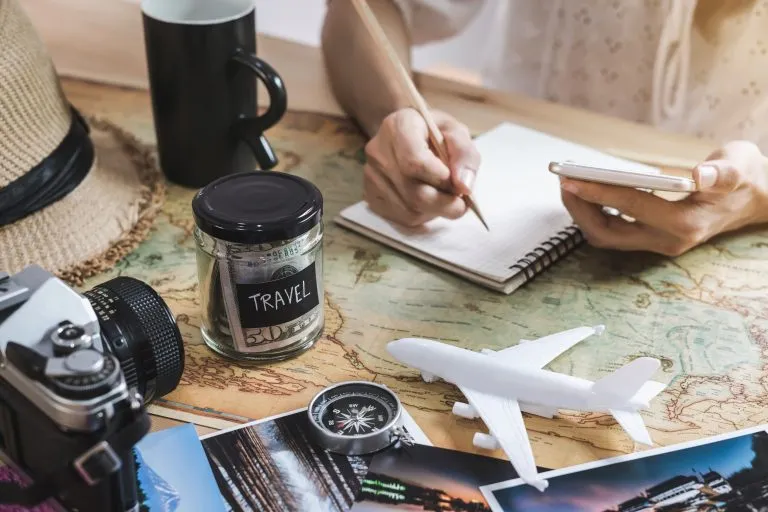
How to Budget for a Trip: The Easiest Travel Budgeting Method (+ Tips!)
Here’s a silly secret: I love budgeting travel… and I also think that most guides to creating a travel budget make it entirely too complicated.
I initially wrote this guide on how to budget for a trip almost 7 years ago, when we were prepping for what we were then calling a 6 month round the world trip (spoiler: depending on your definition of “trip”, it never actually ended).
50+ countries and the better part of a decade later, I’m still using the exact same, simple formula for calculating our budget while traveling–even if our definition of “on a budget” has changed over the years.
Planning to hit the road soon and wondering how much money you need for your trip?
Whether you’re headed off on a 2-week Europe trip or you’re planning to live out of a backpack for years like we did, our simple method for budgeting travel expenses has you covered.
Here’s the travel budget strategy that we swear by to this day!
Table of Contents
Our Formula for Creating a Travel Budget
Why we like this travel budgeting system, example of how to budget for a trip, tips for travel budgeting, planning a trip.
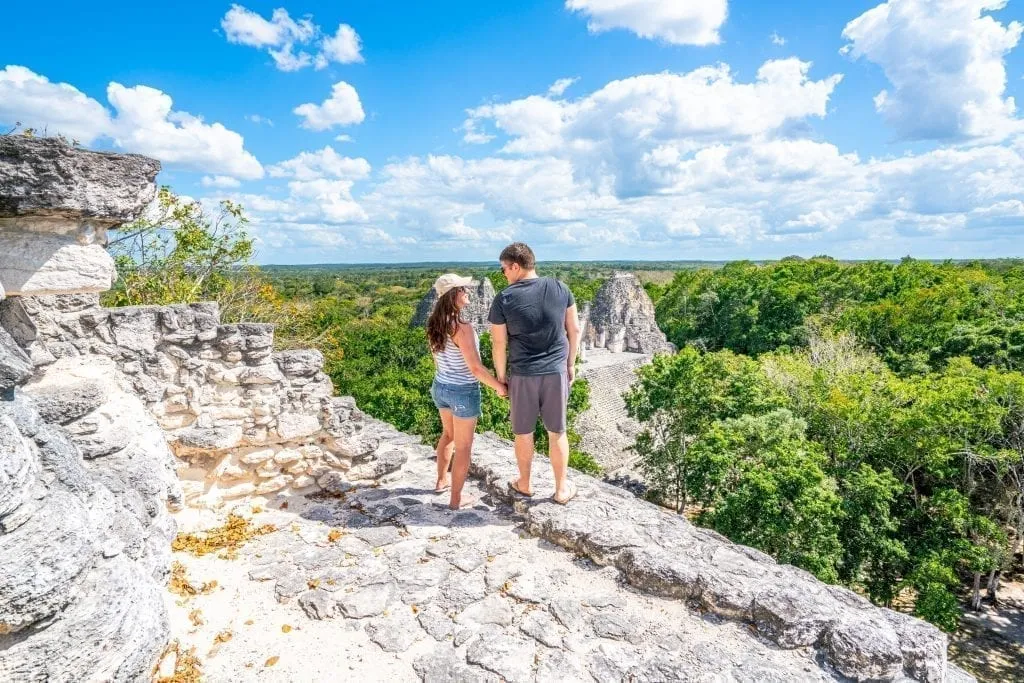
Some links in this post may be affiliate links. If you make a purchase through one of these links, we may earn a small commission at no extra cost to you. Please see our disclosure policy for more detail.
Here’s our incredible simple calculation for travel expenses:
(Money Saved – Major Expenses) / Number of Days Traveling = D aily Budget
That’s it–simple, easy to remember, and allows you to easily translate your savings from a pile of money into an actual travel budget.
Some long term travelers prefer to divide by the number of weeks instead of the number of days, on the premise that some days you may blow a large amount, and then have cheaper days to make up for it.
While that is 100% true and Jeremy and I definitely balance expensive days with inexpensive ones, I still prefer to think in terms of days.
In my experience, smaller numbers tend to be more easily tracked, and are less overwhelming as a result.
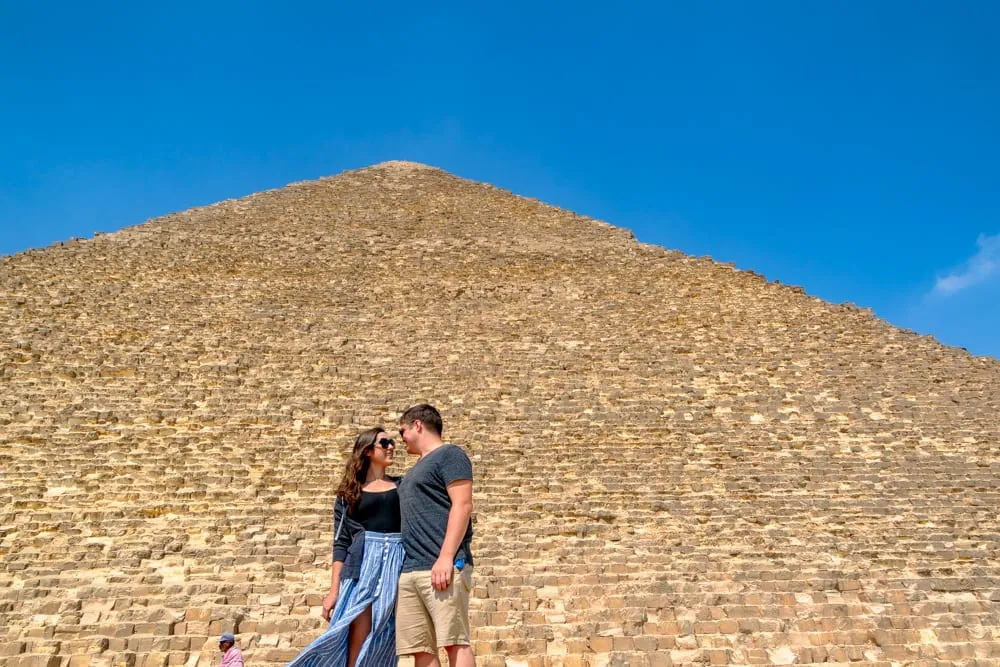
How to Define Major Travel Expenses
“Major expenses” can be somewhat of an ambiguous term, but I tend to use this for pricey plane tickets, travel insurance, and large monthly bills that you’re still responsible for during your trip (say, a car payment or health insurance).
If you’re headed to any destinations that require a visa, be sure to include those costs as well!
For shorter trips, I also like to include lodging and certain cheaper transportation costs (night trains, budget airline flights, rental cars) here, but for long-term travel, that’s obviously not practical.
The point of the major expenses category is simply to remove the money that is allocated for specific expenses from play before determining how much you have to spend.
This is to avoid either a) running around feeling like you have more money than you do and overspending or b) anxiously fretting about the upcoming expense (like a plane ticket home) and saying no to things that you want to do because you’re needlessly stressed about not having enough money.

Personally, we’re much more likely to do the second.
Looking back on almost 7 years of travel, I can now definitively say that there have been more experiences than we’ve said no to when we should have jumped at the opportunity than times we splurged on an experience that wasn’t worth deducting from our calculated travel budget.
Luckily, thanks to this travel budgeting system, those experiences have been few and far between.
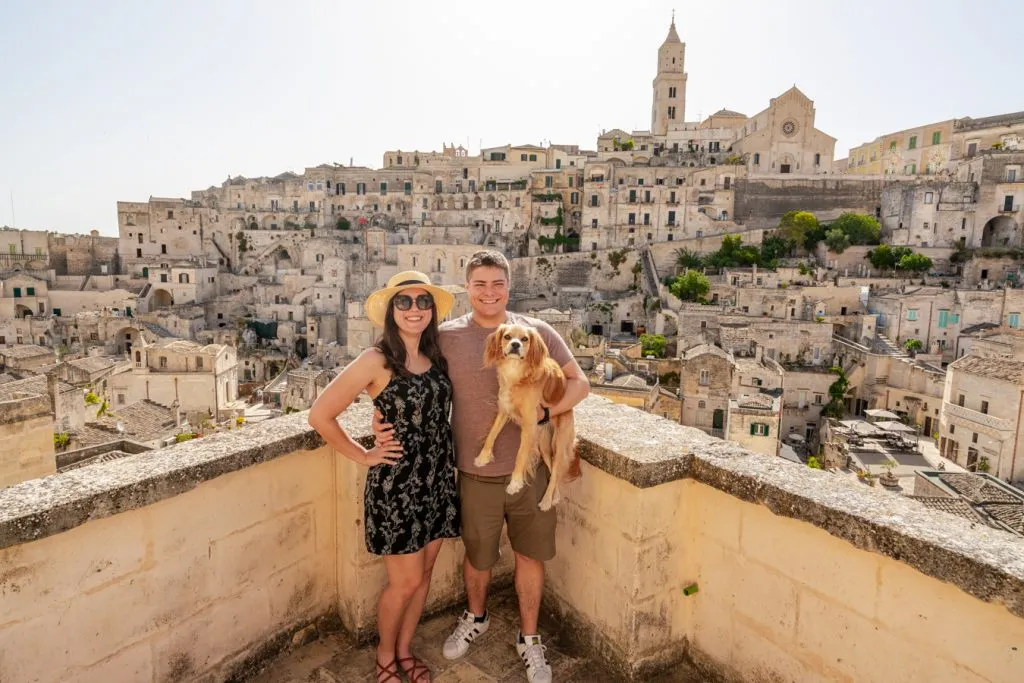
For us, this method of creating a travel budget works perfectly.
Thanks to careful tracking, we have never overspent on a trip, and we’ve also never worried much about money during our travels.
The worst that will happen is that we have a couple of pricey days in a row and follow it up with a day of inexpensive hiking or laying on the beach to make up for it (hardly a tragedy).
While I tend to track our daily expenses via mental estimates, I will write out cash expenses daily and credit card/more easily tracked expenses a couple of times a week–yes, even 7 years later.
It may seem like a drag, but 10 minutes of work can relieve a lot of stress and fear of the unknown that can come with just letting your money slip to the back of your mind.
(At least, it will be in the back of your mind until you start panicking over the thought of where your checking account balance might be when trying to fall asleep at night!).
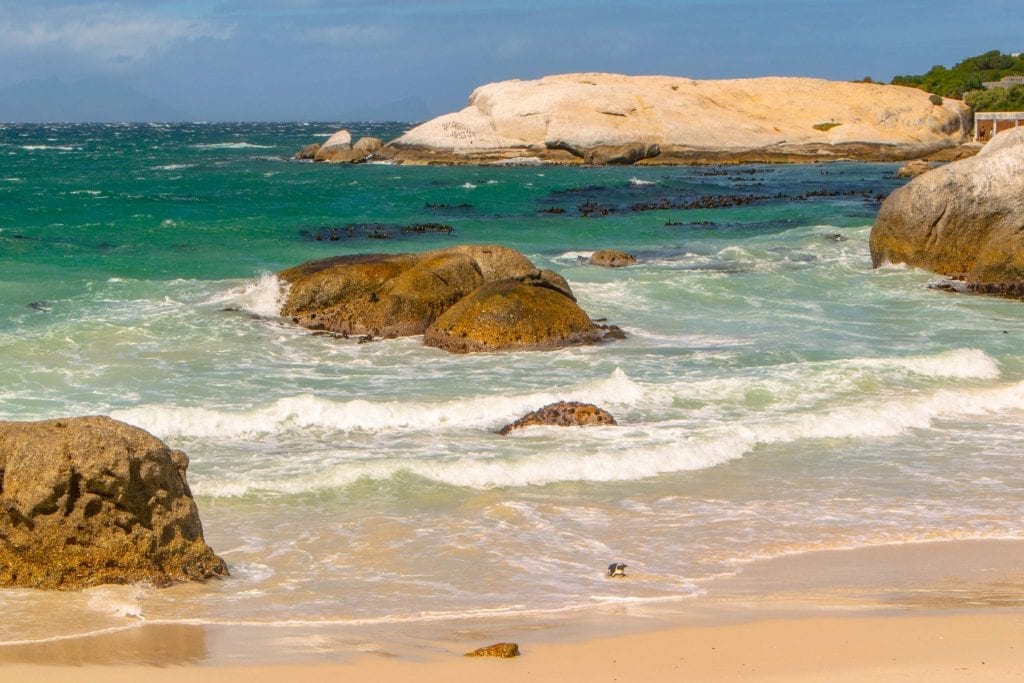
Let’s say that a couple traveling is traveling to Paris from the USA for one week, and wants to calculate their travel budget.
In the interest of not searching too deeply for a pretend trip, I’ll say they buy the first flights they search for don’t stress about that too much. They’re also cautious and want travel insurance for their trip.
Our pretend couple has a $4000 travel budget, in total.
Major Travel Expenses for Our Mock Paris Trip
Round-Trip Flights to Paris: $2000
Travel Insurance : $150
Hotel Room, $130/night for 7 nights: $910
($4000 total budget – $3060 major expenses) / 7 days = $134.28/day to spend, or $67.14/per person, per day.
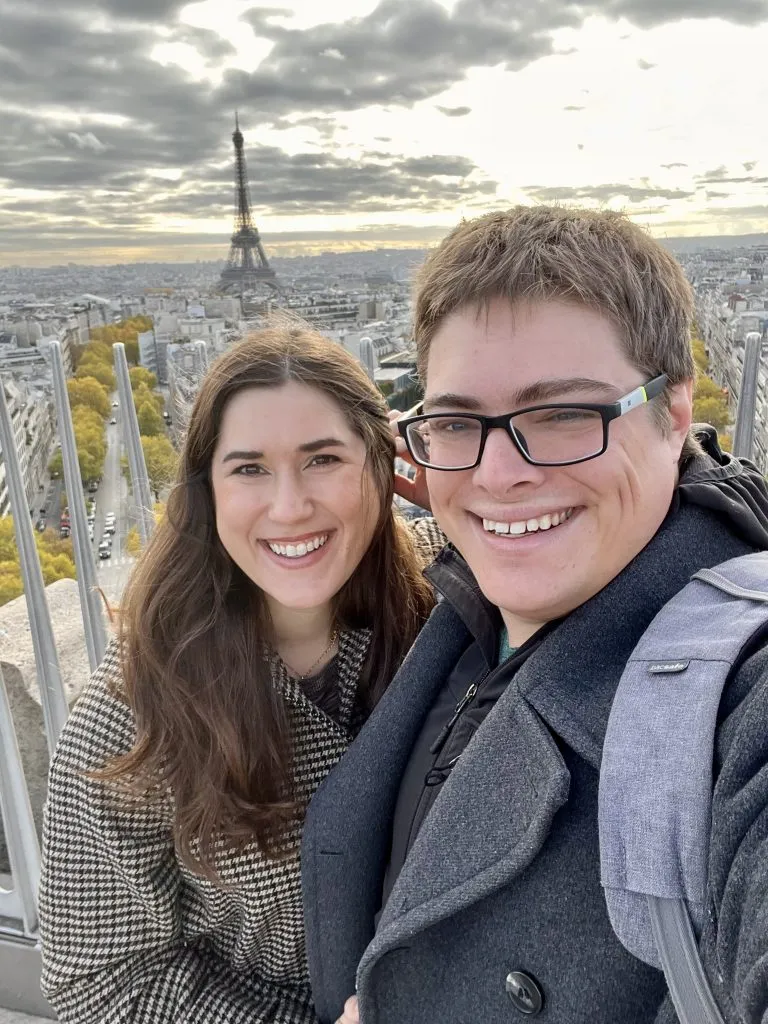
I would round those down to $134 or $67, both for the ease of math and to build in a slightly conservative slant to the budget.
This would need to cover activities/tours, souvenirs/shopping, transportation while in Paris, and food/drinks.
That’s not only doable but completely comfortable in Paris, as long as our pretend couple is not hoping for luxury travel.

Know what’s worth it to you.
If you’re a major foodie, skimping on dining probably isn’t going to work for you–and if you’re a SCUBA lover, suggesting you limit dives on a beach trip may sound miserable.
Whatever your priorities are, focus on those and skimp on other areas, instead–even if other travelers consider the things you skip to be must-see sights.
Check in on your budget regularly.
Even if you don’t check in daily, be sure to track your budget at least every few days.
This will help keep you from blowing off course in either direction and also relieve any anxiety you have about not knowing the status of your budget.

Remember that traveling on a budget doesn’t mean having less fun!
Some of our favorite travel experiences cost little to nothing.
Browsing local markets, enjoying a beach day, going for a hike, wandering aimlessly through cities, sampling street food, and more all make for wonderful and incredibly memorable travel days.
Travel budgeting can be daunting when you get started, but once you get used to it, it enhances, rather than detracts from your experiences.
Not only are there wonderful travel experiences to be had at all budgets, but knowing where you are in your trip financially is much less stressful than constantly worrying that you’re over your travel budget… without having the concrete data to confirm either way.
Subscribe to our newsletter to follow along with our travels and to receive tips and new content via email!
We won’t send you spam. Unsubscribe at any time.
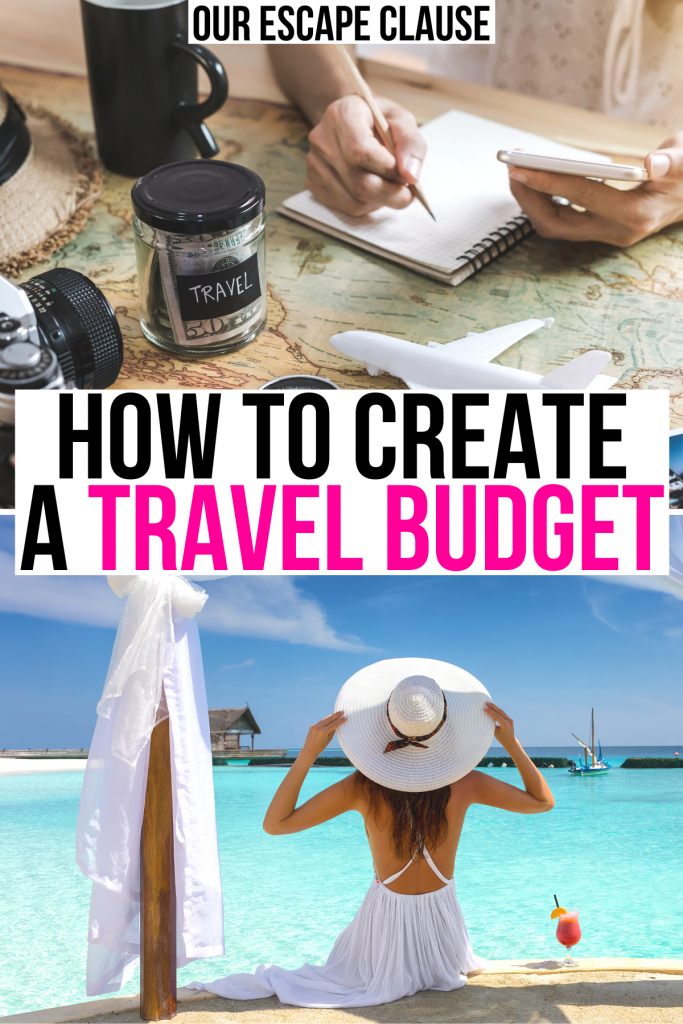
About Kate Storm

In May 2016, I left my suburban life in the USA and became a full-time traveler. Since then, I have visited 50+ countries on 5 continents and lived in Portugal, developing a special love of traveling in Europe (especially Italy) along the way. Today, along with my husband Jeremy and dog Ranger, I’m working toward my eventual goal of splitting my life between Europe and the USA.
11 thoughts on “How to Budget for a Trip: The Easiest Travel Budgeting Method (+ Tips!)”
Excellent post. I was checking continuously this blog and I am impressed!
Extremely useful information specifically the last part 🙂 I care for such info a lot. I was looking for this particular information for a long time. Thank you and good luck.
Thank you! Appreciate you stopping by! 🙂
bookmarked!!, I love your site!
Another small thing to consider would be to convert your daily budget amount to local currency.
Great point, thanks for stopping by! 🙂
This is by far the best travel blog I have come across. Thank you!!!
So happy to hear that, DeElla!
Great info!
Good info. Thanks we will be traveling Italy for 28 days. The last 7 we are staying with friends. We don’t want to rent a car but use trains between towns and subway/buses in the cities. How do I budget for that? Are there month long passes for each? Excluding airfare we have $7000 food/transportation/entrance fees. Does that sound doable? We are flying into Rome, then Florence and take day trips from there, then ending up in Ugento. Any recommendations?
Thanks, Brenda!
You can definitely get around Italy without a car, that’s not a problem at all. $7000 for for 28 days on the ground also sounds reasonable (I’m assuming you’re traveling as a couple).
Trenitalia does have a monthly pass of sorts for trains, similar to the Eurail pass but for Italy only. However, I wouldn’t necessarily recommend it without knowing your schedule. Most likely, booking each leg individually is fine.
For short distances in rural areas that you travel by bus, you won’t need online tickets or anything like that. Same for any “local” trains you take, like the slow train between Florence and Bologna. You can buy those tickets step by step as you go, as the prices are set.
Where the prices get higher and you’ll need to budget in advance is for the high-speed train routes around Italy, like from Florence to Lecce, for example. Those trains have dynamic pricing, so if you can book your tickets in advance, you’ll both spend less and be able to budget more easily.
Leave a Comment Cancel reply

How To Create A Solo Travel Budget (Free Calculator Included!)
By Jessie Festa & Dale P. This guide to creating a travel budget contains affiliate links to trusted partners!
Wondering how to create a solo travel budget ? Need some help understanding how to save money on travel and manage your trip expenses?
Then you’re in the right place!
For many people, the idea of traveling somewhere new is exciting. I mean, who wouldn’t love to be regularly flying off to new destinations?
The problem: travel can be extremely expensive; luckily, there are ways to set a travel budget and explore the world on the cheap while still having a memorable experience.
In this guide, we’ll lay out step by step how to create a budget for solo travel and stick with it. Additionally, we’ll share savvy tips for saving money on travel expenses like flights, hotels, tours, and more.
Quick tip: Flights are often the most expensive aspect of your trip. Luckily, there are platforms that can help you easily find flight deals and error fares like Going (formerly Scott’s Cheat Flights) and FareDrop . In terms of accommodation, search Hostelworld for hostels (many of which have private rooms), consider housesitting through Trusted Housesitter s , book a rental with a kitchen to save money on food through VRBO , or stay on free couches through Couchsurfing . And when it comes to car rentals, Discover Cars can help you quickly compare your options and save up to 70%! These are just a few of the many ways to save money on travel. Keep reading for more!
Table of Contents
Free Travel Budget Calculator
And that’s not all! To help you set and stick with your solo travel budget, I’ve created a handy dandy Free Travel Budget Calculator .
Enter your intended trip budget at the top and then your expenses in the following rows. The calculator will tally up your expenses and let you know if you’re over or under your budget – and by how much. You’ll also get a pie chart visually showing you where you’re spending the most money.
Note: if there is a category where you’re spending is $0, please put “0” in the line field. Otherwise, you may receive an error.
- If there is a category where you’re spending $0, please put “0” in the line field. Otherwise, you may receive an error.
- This calculator looks at your per day, per person costs (unless otherwise noted). If you’d prefer to calculate by the total costs for each category, click here .
- If you’d prefer to just calculate the trip costs for yourself, enter “1” for the Number of Travelers.
- Want more travel calculators? You can grab my full suite of trip planning calculators – plus other goodies – in my free Travel Resource Library !
Travel Budget Calculator
On that note, let's discuss how to set a solo travel budget and stick with it.
Is Solo Travel Expensive?
Solo travel doesn't have to be expensive. There are pros and cons when it comes to traveling solo and how it relates to your budget.
When you travel solo, you have complete control over your itinerary, which can help you save money. You can stay wherever you want, eat wherever you want, and do as many or as few tours and activities as you'd like.
How much you spend is totally in your control. This is one of the biggest benefits of solo travel .
However, there are some areas where you may end up spending more as a solo traveler. For example, you won't have anyone else to split the cost of hotels or taxis with. This is why it's crucial to understand how to set a solo travel budget and also save money on travel.
Considerations When Setting A Solo Travel Budget
Before you start to set a solo travel budget, there are several important factors to consider.
Determine available funds
Before you can plan your travel budget, you will need to determine the funds you actually have available for this trip. It's possible to travel solo to most destinations around the world - even notoriously pricy ones - as long as you're prepared and realistic.
If you don't have enough funds for your trip yet, determine the amount you'll spend and then set a timeline for saving money to achieve your goal.
You can use a website like BudgetYourTrip to get an idea of travel costs in destinations around the world.
Set realistic budget goals
Building off of the step above, you'll need to set realistic budget goals if you want to end up successfully sticking to your travel budget.
When setting budget goals, think about your own personal interests and travel style.
Are you a huge foodie who doesn't care as much about museums and tours? Is staying in a luxurious hotel room your top priority? Whatever the case is, you'll want to pinpoint your priorities and budget accordingly.
Budget categories
Dividing your travel expenses into categories can help you effectively budget for a trip. The main categories you'll want to budget for include:
- Transportation
- Travel Insurance
- Miscellaneous
You might want to build in a 10% buffer to your total travel budget to account for miscellaneous costs. It can also be a good idea to set aside some money for emergency expenditures. This will help you stay prepared and travel solo successfully .
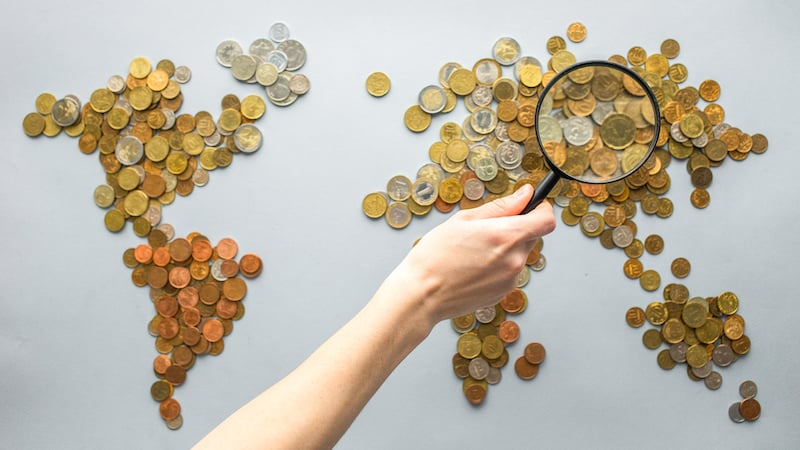
How To Set A Solo Travel Budget
Are you ready to learn how to plan a travel budget? Here are seven simple steps to follow to budget solo travel effectively.
1. Plan your itinerary. In order to successfully budget for your trip, you'll want to plan your itinerary first so you can accurately budget your expenses. For short trips of a week or two, it should be easier to get specific. For long-term trips like a multi-month backpacking trip, you may have to plan more broadly.
2. Identify transportation costs. How much will your flights cost? How much will transportation on your trip cost? Will you be taking additional flights, trains, buses, boats, taxis, or public transportation? This should all be factored into your travel budget.
3. Estimate food costs. Food is another key part of your solo travel budget and one that is fairly consistent. Set a reasonable daily spending limit for food. You may decide to eat one meal out per day and cook the rest of your meals at your accommodation. Additionally, opting for street food meals can be a smart way to save money. Whatever you choose, work it into your budget.
4. Identify activity costs. If you're taking a short trip, you may plan to pre-book tours and activities. If so, be sure to add these to your budget. For longer trips, you might allot yourself a certain amount for activities and tours each day or each week.
5. Don't forget travel insurance. If you can't afford travel insurance, you can't afford to travel. Just check out these travel horror stories to see why it's so important. Covering your trip is more affordable than you might expect. Two of the best travel insurance providers are SafetyWing and World Nomads .
6. Add a buffer. After you've calculated your total travel budget, add a buffer for miscellaneous expenses. If your total budget is $1,500, you may want to add an additional $150 for spontaneous expenses that might crop up and another $150 as an "emergency fund" for your trip.
7. Commit to keeping yourself accountable. Finally, commit to checking in with your budget during your trip. It only takes a few minutes a day to track your expenses and make sure your expenditures are in line with what you planned for. You can use an app like Trabee Pocket to help with this.
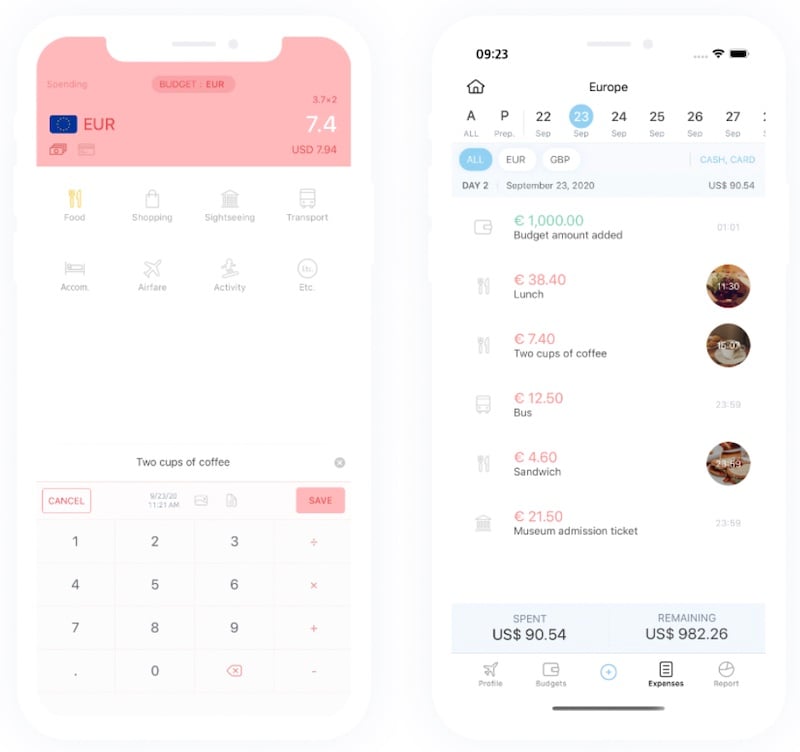
Tips For Managing Travel Expenses
Planning your travel budget is one thing, but actually sticking to it is an entirely different matter!
Fortunately, there are travel budgeting tools you can use to track your travel expenses and ensure you are sticking to the travel budget you set.
Use a travel budgeting app
There are a number of ways you can manage your travel expenses. You can use a simple spreadsheet or a general budgeting app like Mint or You Need A Budget .
There are also (free!) travel budgeting apps like Trabee Pocket , Tripcoin , and TravelSpend that allow you to track your travel expenses across various categories.
Make budgeting a priority
You don't need to fixate on your budget the entire time you're traveling, but take a few minutes at the end of every day to tally your expenses and make sure you're on track.
Many travelers don't do this, which can lead to major overspending and regrets.
Choose the right payment methods
Before your trip, do some research on which payment methods you'll use. Some destinations are still very cash-dependent while others have gone almost totally cashless.
If you'll need cash, make sure you have an ATM card with no fees. For Americans, Charles Schwab's Investor Checking bank account allows you to withdraw money from any ATM in the world with no fees. Basically, any fees that are charged are reimbursed to you at the end of the month.
For credit cards and debit cards, you'll want to make sure your cards have no foreign transaction fees. While certain cards will have an annual fee - though this often comes with lots of travel perks - there are also credit cards that are $0 per year, like the SavorOne Rewards card from Capital One .
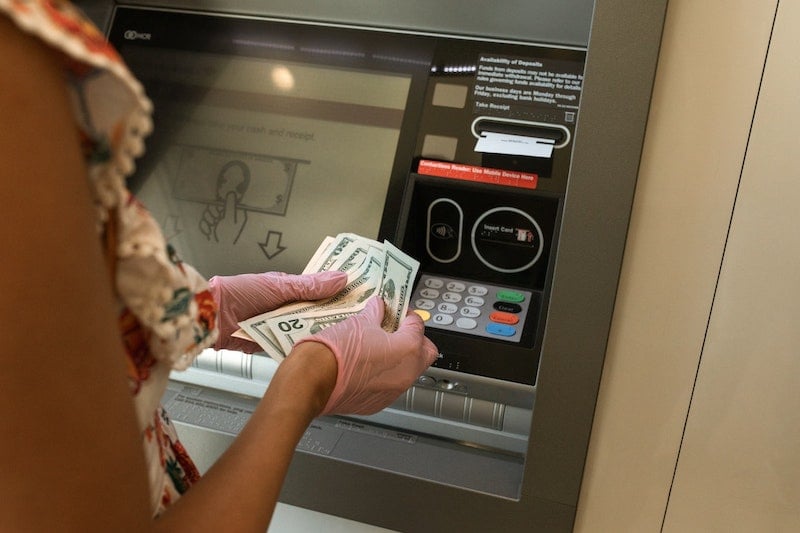
Choosing A Destination That Fits Your Travel Budget
If you're on a tight budget, choosing the right destination can help you stretch your money further. You can get more for your money in destinations like Southeast Asia, Eastern Europe, and Central America than you can in Western Europe, North America, or Oceania.
Other factors to consider when choosing a destination include:
Seasonality
Traveling in the off-season is a great way to save money on your trip. Prices for everything - accommodation, transportation, and tours - are generally lower outside of the peak tourist season. Plus, as an added bonus, you can enjoy many destinations with much lower crowds.
There are some tradeoffs to traveling during the off-season. For example, it might line up with the rainy season or colder weather; but for many travelers, it's worth it for the savings.
You can also travel in "shoulder season," the month or two before or after the high season. This usually gives you the best of both worlds: good weather but lower prices and lower crowds.
Type of trip
Do you want to city-hop across European capitals, explore jungles, volcanoes, and ancient ruins in Central America, or explore beaches and rice paddies in Southeast Asia?
Depending on the type of solo vacation you want to take, this can factor into where you go and how you budget for your one-person vacation accordingly.
Budget-friendly destinations
Here are some of the best destinations worldwide for cheap vacations to take alone where your dollar will stretch further:
- Southeast Asia: Indonesia , Thailand, Cambodia, Laos, Malaysia , Philippines, Vietnam
- Europe: Portugal , Romania, Poland, Czech Republic, Albania, Montenegro
- Latin America: Mexico , Guatemala, Nicaragua, Colombia, Ecuador, Peru
This is by no means an all-inclusive list, but it gives you an idea of countries where you can have inexpensive solo vacations for as little as $50 a day - or less, if you take the following money-saving tips to heart.
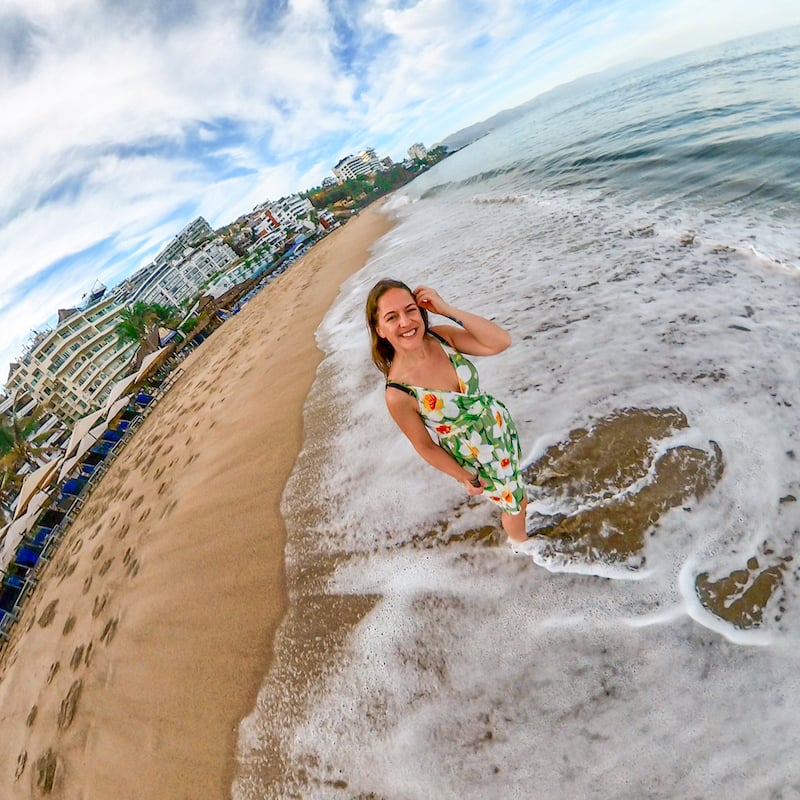
How To Save Money On Flights
Flights can be one of the biggest expenses for any solo trip, especially if you are traveling internationally. Here are some ways to take inexpensive solo trips by saving money on flights.
Travel during the off-season
Traveling during the off-season is a great way to save money on all aspects of your trip, especially airfare. For example, flights to Europe from the U.S. may be as much as 50% lower during the months of October and November compared to the peak summer months of June through August.
Be flexible with your travel dates
If you can be flexible with your travel dates, you can score some great deals on airfare. Leaving or returning a day or two earlier or later may result in massive fare differences.
Of course, sometimes this means traveling at strange times (like leaving mid-week instead of at the start of a weekend) but if you can afford to be flexible, it can pay off massively.
In terms of how to tell which days are the cheapest for travel, Google Flights has a visual calendar with prices showing for each day.
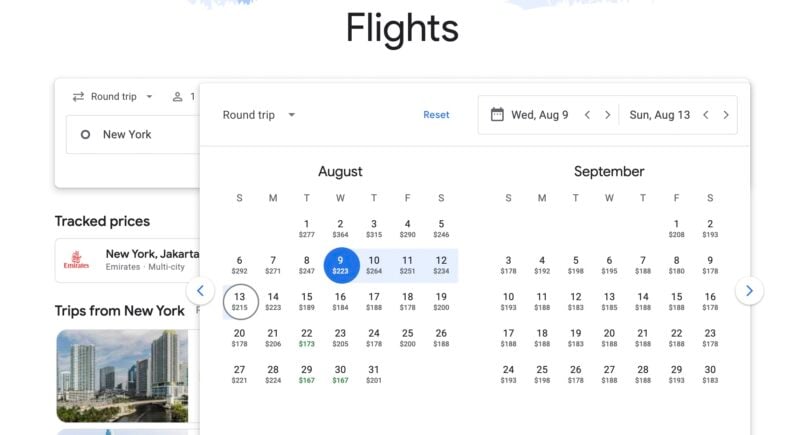
Set fare alerts
Can't be flexible with your travel dates? Set a fare alert on Google Flights and be notified when airfare drops for your specific dates. This can help you score seriously cheap flights.
It's a good idea to set a fare alert well ahead of time and keep in mind that the "sweet spot" for booking a domestic flight is 60 days in advance and 120 days in advance for an international flight.
Get notified about deals & error fares
If you want to find the absolute cheapest airfare possible and find error fare deals , there are a few tools you can use.
The first is Twitter . You can set alerts to receive Tweets from fare deal accounts like @TheFlightDeal and @SecretFlying.
There are also services like Going (formerly Scott's Cheat Flights) and FareDrop that send deals and error fares right to your inbox to help you save hundreds of dollars on flights.
For the above strategies, just make sure to book your flight right away, as typically the deals showcased change quickly. You might even make finding a great flight deal your method for choosing your destination!
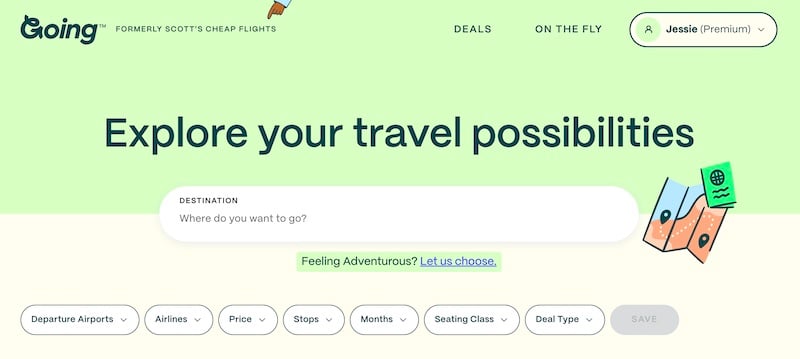
How To Save Money On Accommodation
Your solo travel costs can skyrocket quickly depending on where you stay. Luckily, there are several ways to save money on solo travel accommodation.
Stay in hostels
One of the best ways to save money on accommodation for single travelers is by staying in hostels. Staying in a hotel can get very expensive if you don't have anyone to share the cost with.
Hostels are an affordable alternative for inexpensive solo travel. And if you think that hostels are only for young people or for backpackers on an extreme budget, think again!
Many hostels cater to travelers of all ages. There are also tons of hostels that resemble boutique hotels more than your typical hostel, and many have private rooms that are comparable to hotel rooms.
Of course, for travelers on a tight budget, staying in a shared hostel dorm room is one of the best ways to save money on your accommodation costs.
You can search a site like Hostelworld to compare the hostel options in your preferred destination. Once you search by location, date, and number of travelers, you'll be given a list of properties and will be able to see right away the rate as well as if private rooms are available.
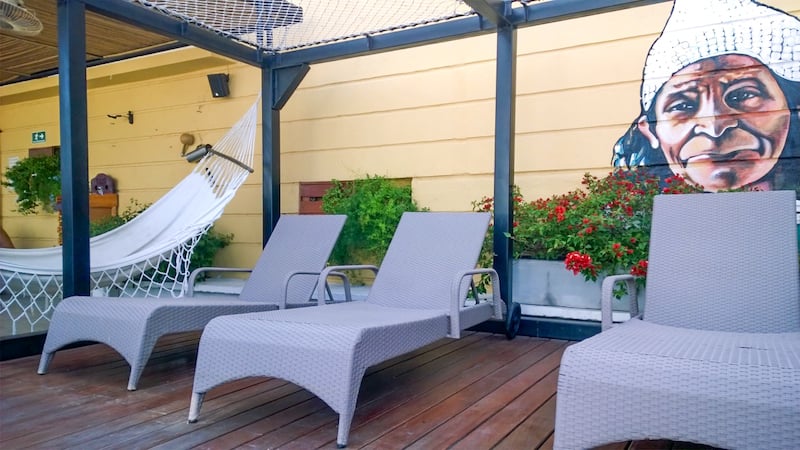
Use travel credits & points
If you prefer to stay in hotels, using travel credit cards and redeeming points can be a great way to save money or even get a totally free hotel stay.
Many hotel chains like Marriott and Hilton offer co-branded credit cards with sign-up bonuses that can be earned after spending a certain amount of money within a few months of opening the card. These points bonuses can typically be redeemed for several free hotel nights.
You can also use a general travel rewards credit card, like the Chase Sapphire Preferred Card , which offers similar sign-up bonuses in points that can be redeemed towards hotel stays and other travel. Just note that this card does have an annual fee, though it also comes with many travel perks.
Try housesitting or couchsurfing
If you're looking for a way to travel very cheaply and spend zero dollars on accommodation costs, housesitting and couchsurfing are two unconventional methods of travel to consider.
Housesitting involves staying in someone else's home and taking care of their pets and house while they are away. You may be responsible for feeding, walking, and playing with pets, watering the plants, keeping the house tidy, and generally taking care of the place while the owners are away.
Trusted Housesitter s is the best platform for finding housesitting jobs. It's a great way to live like a local in a new destination and save money on accommodation.

Another option is couchsurfing. The official Couchsurfing website will help you connect with locals who offer free accommodation to travelers around the world.
As the name suggests, you might be sleeping on someone's couch, so it's not the most glamorous way to travel. But it's great for budget travelers who want to connect with locals.
Important solo travel safety tip : solo female travelers should be especially careful when couchsurfing. It can be a good idea to only stay with female hosts or to vet potential hosts by making sure they have positive reviews from other couch surfers first.
Speaking of safety, you might also consider packing a few travel safety essentials - like a She’s Birdie Personal Safety Alarm , which is TSA-approved and can help scare away potential attackers. Other recommendations include Clever Travel Companion Pickpocket-Proof Garments and Speakeasy Travel Supply Hidden Pocket Scarves .
How To Save Money On Food While Traveling Solo
Food is an area of your budget that can get eaten up quickly (no pun intended) while traveling if you aren't careful. Here are some ways to save on food while traveling solo without sacrificing the fun of eating out and discovering new cuisines:
Go grocery shopping
One of the best hacks for inexpensive solo travel is grocery shopping and cooking meals on your own while you travel. Most hostels offer communal kitchens, or you can be sure to choose an Airbnb , VRBO , or other rental that includes a kitchen.
You don't have to cook every meal on your own, but even just cooking for yourself a few times on your vacation instead of eating out can save you a lot of money.
Choose accommodation with free breakfast
Many hostels and budget hotels offer free breakfast every morning, which can be a great way to save money on one meal per day.
Before booking your accommodation, check to see which places offer free breakfast. You can fill up on a complimentary buffet breakfast in the morning, and then you'll only have to spend money on lunch and dinner.
Eat where locals eat
Finally, eating where locals eat is one of the best ways to save money on food while you travel. Restaurants that cater to tourists are often overpriced and don't even serve the best food.
However, if you get off the main tourist trail and seek out the spots where locals eat, you'll most likely find much better prices — and much better food.
Do some research before you travel to find the best local eats in the destinations you're visiting, or better yet, ask a local for recommendations once you arrive.

How To Save Money On Activities While Traveling Solo
Many activities, such as visiting museums and tourist attractions, will not cost you anything extra as a solo traveler. However, some activities do run the risk of incurring the dreaded "single supplement."
Here are some tips for cheap solo travel activities:
Research free activities
Free activities are one of the best strategies for how to travel solo on a budget. You'd be surprised at how many free things to do there are in most destinations.
For example, in New York City, there are dozens of free viewpoints you can visit rather than paying $50+ to go to an expensive observation deck.
Moreover, activities like solo beach days and solo hikes are almost always free.
Consider purchasing a city pass
Many popular destinations around the world, particularly major cities with lots of tourist attractions, offer city passes.
These passes give you access to many popular museums, attractions, and experiences for a discounted price compared to buying entry to each activity individually. They can also help make solo travel more fun by introducing you to a destination's top attractions.
If you're someone who enjoys visiting many museums and tourist attractions, this can be an excellent way to save money on activities. You can check the official CityPASS website to see if your destination is listed, though keep in mind there are other brands of discount passes too.
Avoid solo travel supplements
Unfortunately, some activities carry a single supplement for solo travelers. For example, cruises and tours that are priced based on double occupancy often carry a supplement for solo travelers.
When it comes to group tours, you can often agree to share a twin room with another traveler to avoid having to pay for a single supplement.
On cruises, you can sometimes find solo travel deals where the single supplement is waived or greatly reduced.
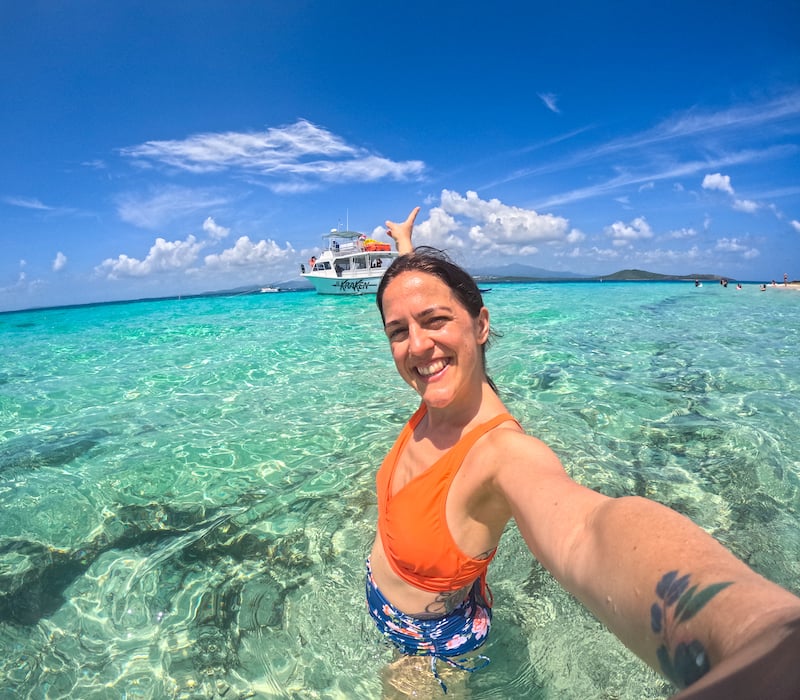
How To Save Money On Transport While Traveling Solo
When it comes to how to travel solo for cheap, managing your transportation costs is another important element for sticking to your solo travel budget.
One of the drawbacks of traveling solo is that you don't have anyone to split transportation costs with. When traveling with others, you can save money by splitting a taxi, Uber, or rental car.
But on your own, here are some ways to save money:
Use public transportation
Public transportation is one of the best ways to save money while traveling solo. Taking a taxi or an Uber all the time can quickly get pricy, but public transportation typically costs a couple of dollars or less per ride.
If you'll be staying in a destination for an extended amount of time (more than a few days) and plan to use public transportation frequently, it may also be worth purchasing a weekly transit pass compared to buying single tickets.
Research transportation in advance
Another way to save money on transport is to come prepared to your destination. Research the best ways to get around in advance of your trip.
In some places, renting a car may actually work out to be a cheaper option, while in other places, you might save money using rideshare services, buses, or trains.
Stay in a central location
Staying in a central location is a great way to save money on transportation in your destination. You may find a hostel that's $10 cheaper outside the city center, but what if you have to spend $10 a day on transportation costs to get where you want to go?
Choosing a central location means that you'll be able to walk around more and spend less money on transport costs. You may also want to choose accommodation that's close to the train station or public transportation in your destination.

Where To Get Travel Insurance
Before heading off on a solo trip, it's wise to get travel insurance.
One of the best travel medical insurance for travelers is SafetyWing as they’ve got a large network and offer both short-term and long-term coverage — including coverage if you’re traveling for months as well as limited coverage in your home country.
Additionally, SafetyWing is budget-friendly and offers $250,000 worth of coverage with just one low overall deductible of $250.
Click here to price out travel insurance for your trip in just a few clicks .
Post-Travel Budget Review
After your trip, it's a smart idea to do a post-travel budget review. Find an hour to sit down and closely review how much you spent during your travels.
Take a look at your initial budget and your actual expenditures and see how well you stuck to what you planned to spend. Were there any areas where you went over budget?
Maybe you spent way more money than you expected on going out to eat, or maybe you ended up splurging on Ubers or taxis more often than you took public transportation.
Identify these areas of improvement for future travel planning purposes, but don't get down on yourself too much for a little bit of overspending. Money will come and go, but the memories from your travels will last a lifetime, and that is priceless!
Planning A Solo Trip On A Budget: Final Thoughts
Hopefully, these tips can help you confidently travel the world solo on a budget! While travel can certainly be expensive, it's also possible to book travel at a reasonable price.
It's helpful to look at the biggest costs to determine how you can get them down, like traveling outside of peak season, such as during shoulder season, and making use of strategies to keep big ticket items like flights and hotels low.
Using the steps above, you'll be able to create a travel budget for your solo vacation - and stick with it!
What would you add to this guide on how to create a solo travel budget?
Enjoyed this post on creating a travel budget? Pin it for later!
Related posts:

Hi, I’m Jessie on a journey!
I'm a conscious solo traveler on a mission to take you beyond the guidebook to inspire you to live your best life through travel. Come join me!
Want to live your best life through travel?
Subscribe for FREE access to my library of fun blogging worksheets and learn how to get paid to travel more!

Turn Your Travel Blog Into A Profitable Business
Subscribe to my email list to snag instant access to my library of workbooks, checklists, tutorials and other resources to help you earn more money -- and have more fun -- blogging. Oh, and it's totally FREE! :) // Privacy Policy .
Check your inbox for your welcome email + resource library password!
Leave a Comment Cancel Reply
How to Make a Travel Budget in 5 Easy Steps (Free Planner)
Our readers always come first.
The content on DollarSprout includes links to our advertising partners. When you read our content and click on one of our partners’ links, and then decide to complete an offer — whether it’s downloading an app, opening an account, or some other action — we may earn a commission from that advertiser, at no extra cost to you.
Our ultimate goal is to educate and inform, not lure you into signing up for certain offers. Compensation from our partners may impact what products we cover and where they appear on the site, but does not have any impact on the objectivity of our reviews or advice.
Creating a travel budget may seem like a hassle, but it’ll actually make your vacation more enjoyable. Knowing that you’ve already planned out how you’re going to pay for everything will help you relax and have a good time.

- Money Management
Our mission at DollarSprout is to help readers improve their financial lives, and we regularly partner with companies that share that same vision. If a purchase or signup is made through one of our Partners’ links, we may receive compensation for the referral. Learn more here .
Many people enjoy traveling the world, exploring new places, or just relaxing in a tranquil environment.
Taking a vacation is a great way to reduce stress and improve productivity, but traveling can be costly. Making a travel budget will make a big difference while planning your next getaway.
Those who love to travel should incorporate it as a line item in their monthly budgets. Each month, set aside a certain amount for travel in its own separate account.
Earmark that money specifically as a vacation budget so that it can be spent guilt-free. Money that is put toward trip expenses can simply be reimbursed from the travel account.
With that said, if there is outstanding debt that is difficult to pay off, planning an immediate vacation may not be a good idea. In this case, the priority should be to set up an emergency fund that includes three-to-six months’ worth of living expenses.
Why Is Budgeting for a Vacation Important?
While it is good to get into the habit of setting aside vacation funds every month, it is also important to create a budget for each individual trip. This will help determine how long it will take to build up enough money in the vacation account to pay for that trip. It will also allow for logistics to be planned out, while staying on budget.
Scheduling and budgeting for vacations can be very enjoyable. Researching hotel accommodations, restaurants, and free things to do helps to build up anticipation. It can be fun for the whole family to spend time together, figuring out the different parts of an upcoming trip.
How to Budget for A Vacation in 5 Simple Steps
When it comes time to map out those vacation expenses, a few key steps will help lead to success and worry-free traveling. Begin by drafting a well-rounded vacation budget, focusing on expenses in the following five main categories. Once these are figured out, the rest of the details will fall into place.
1. Choose a destination and preferred date
Start by picking a destination and nailing down travel dates. Remember that some locations are more expensive to visit than others. The time of year can also make a difference in pricing. Traveling done at peak tourist times usually costs more than off-season trips.
Be flexible
Being flexible is one of the easiest ways to save when budgeting for a vacation. Check out multiple travel destinations and compare prices before settling on options for lodging and airfare. Since these are two of the largest expenses in any travel budget, keeping them in check will go a long way toward helping to keep the overall cost down.
Be willing to look at alternative accommodations or stay at a place that is a little farther away from the tourist areas. Remember that most vacation time is spent outside the hotel room – so there is no reason to put a large chunk of the budget toward nice accommodations that will be used only for sleep.
Also, be flexible when choosing a travel date. Many travel search engines have a “flexible dates” option that can be used to research the lowest prices for airfare and lodging. Plan around these dates for added savings in the travel budget.
Related: 11 of the Best Cheap Vacation Ideas
Consider the season
The time of year can really impact a travel budget. A lot of people have begun to plan weddings around their honeymoons, and not vise versa. For example, if the goal is to travel to Italy without spending a fortune or facing large crowds of tourists – while still enjoying nice weather – get married in early autumn, which is known as the shoulder season. It’s a great time of year to travel, because the weather is still nice, but the crowds have thinned out. Most people with children travel during the summer. Once the kids are back in school, prices for airfare and accommodations tend to drop, allowing people with more flexibility to travel cheaper.
Related: Make Money Renting Your Home with Airbnb While You’re on Vacation
2. Make a list of your major expenses (use a travel budget worksheet)
When drafting a travel budget worksheet, plan for the biggest expenses, including transportation, accommodations, and food, first. Getting those out of the way will greatly aid in putting together the overall vacation budget.
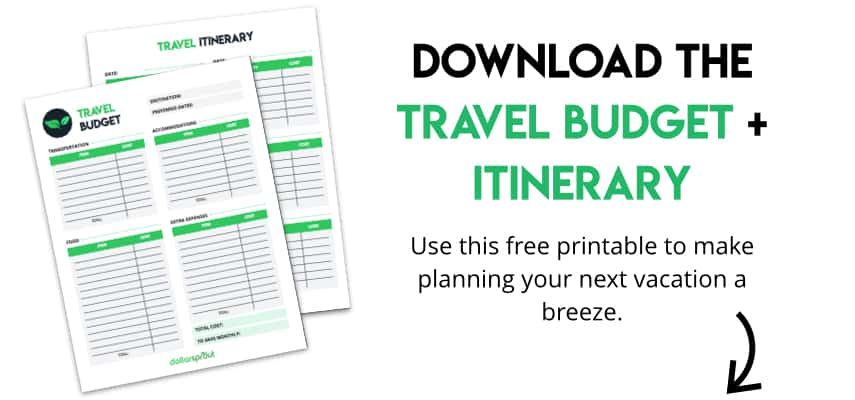
Research cheap travel deals (transportation)
Transportation costs for trips that are taken close to home will not be very high. But when airfare comes into the picture, the transportation line item will increase dramatically. Research multiple airlines for cheap travel deals, and consider taking connecting flights to cut down on the cost. If it’s feasible, check out the price of flights leaving from airports in nearby cities.
Flights on airlines to and from major airport hubs are usually lower in cost. For example, American Airlines and Southwest Airlines are both headquartered in Dallas. Flights on those airlines tend to be the cheapest travel to and from that area.
Research accommodations
Another large expense in any travel budget is lodging. There is a wide range of options to consider when it comes to picking out a place to stay, including hostels, hotels, motels, bed and breakfasts, or apartments. Or, if a trip includes camping, those accommodations can include cabins and tents.
Rather than being brand-loyal to a particular hotel, utilize travel sites like Hotels.com to compare costs at different chains. After all, most travel time is spent sightseeing and exploring, not inside the room.
The closer accommodations are to major attractions, the more expensive they will be. Consider staying somewhere off the beaten path to save money.
When traveling with a group of people, split the cost of accommodations. For example, rent a house or condo with multiple rooms and divide the costs. If your destination is more remote, consider renting an RV. For as low as $175 per night, you can comfortably sleep 10 adults and still come in under $20 per person per day.
Budget for food
One of the trickiest line items in a vacation budget is food. To save some money in this area, choose a place to stay that has a kitchen – or at least a refrigerator and microwave. Eat some meals there, and then splurge a few times by going out to eat at local restaurants.
Another great way to save money on food is to stay in a bed and breakfast or a hotel that includes breakfast. Some chains like Homewood Suites or DoubleTree offer both a kitchen area and a hot breakfast, which helps in saving money . Drinks bought while eating out can quickly add to a bill, so buy wine or beer for the room to keep that travel budget in check.
When budgeting for meals, try going out for lunch instead of dinner. Lunch is usually cheaper than dinner, and many of the same options are offered for less. It is also usually not as tempting to order pricey alcoholic beverages during lunch.
Related: How to Find Cheap Gas Nearby (When You’re On the Go)
3. Make a list of smaller expenses
Once the larger expenses are planned out, figure out the extras, like sightseeing, entertainment, and gifts.
Research potential vacation activities and local places to visit. Go online to get an idea of the associated costs, and budget accordingly.
Don’t forget to plan for any necessary vaccines if traveling abroad, as well as gifts to take back home. Build a buffer into the budget to account for any surprise expenses. It’s always best to plan for more, and then spend less.
4. Determine the monthly savings
Once a rough vacation budget has been established, it’s time to figure out how to pay for it. Take the total amount and divide it by the number of months left until the trip. For example, if the vacation date is in nine months and the cost of the trip is approximately $2,700, $300 must be set aside every month.
If that amount seems too large, there are two options: adjust the timeline or make some extra money.
If necessary, push the trip out by a few months until enough money can be saved, or figure out how to bring in some extra income. There are many different ways to make money on the side, and help to reach that savings goal.
5. Vacation budgeting doesn’t end there
Those travel budgets won’t do much good if they aren’t followed. It is important to track costs and stay on top of spending while on vacation. Don’t stress out over every penny, but don’t go overboard, either. It wouldn’t be fun to see some nasty surprises on the bank or credit card statement later.
One of the easiest ways to track expenditures while traveling is with a budgeting tool like Personal Capital. Alternatively, keep on top of spending with an Excel spreadsheet or even with a pen and paper. Whatever the method, keep it updated and check it regularly.
Bonus Tip: Draft an itinerary
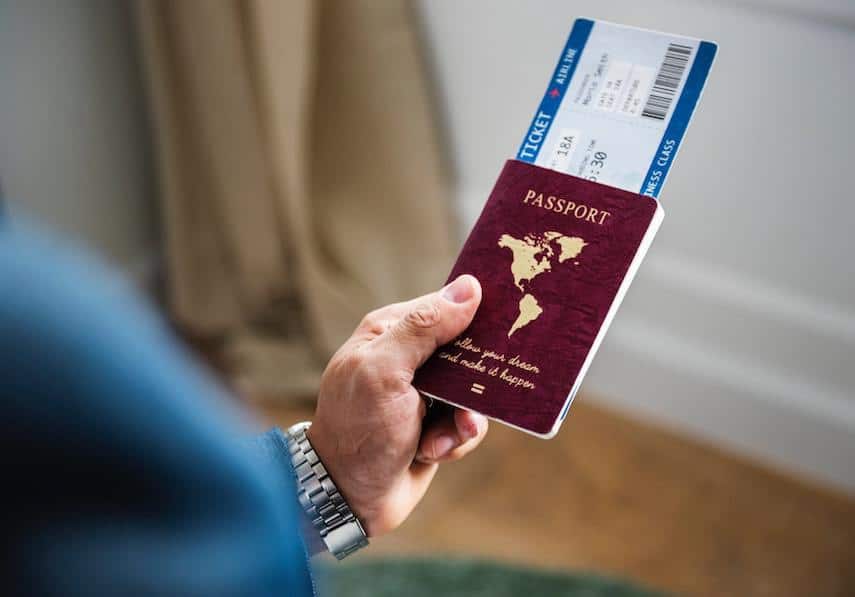
While it’s not necessary to create an itinerary when budgeting for a vacation, it really helps stay on track. The best way to do this is by using an Excel spreadsheet. Make a rough outline with a separate entry for each day of the vacation. Fill in all of the travel information and any scheduled activities like sightseeing tours.
Make a separate column to the side and list out all potential vacation activities. Group together any events that are in the same area of town and write down approximately how long each one would take. Now slot them in under the different day headers for either the morning or afternoon.
Try to group together activities or sightseeing that will occur in the same part of town. Food and restaurant options can be added in after the schedule is roughed out.
Itineraries are meant to be flexible, not restrictive. Move things around to find the right balance. Note the associated cost of each entry on the list.
Add all of the expenses together at the bottom of the spreadsheet to estimate the total travel budget. Remember that it’s not necessary to follow the itinerary word for word. Use it as a planning tool and focus on enjoying the trip.
Creating a Travel Budget Is Well Worth the Time
Even though it may seem like creating a travel budget can be a hassle, in the long run, it will make vacations far more enjoyable.
Having a vacation budget means not stressing about money after the trip. It allows for advanced planning and time to save up enough money. Budgeting for a vacation means that it will be easy to relax and have a good time, knowing that everything is in the budget and ready to be paid for.
You May Also Like

8 Best Budgeting Apps for 2024

15 Beginner Budgeting Tips to Save Money the Right Way

How to Make a Zero-Based Budget in 7 Simple Steps (with Example)
How to Track Expenses in 3 Simple Steps

- Expense tracking
- Planned Payments
- Cash Flow insights
- First month
- Bank to sync
Think of how you’ll be moving around
Every destination is different, so is every traveller. So the next step is to think about and find out what’s the best way to move around once you’ve reached your destination. Some of you may like to explore your destination by foot, others by cycle, public transport or taxis. Whatever be the best available option that suits your tastes, arrive at an estimate of how much you would need to set aside to freely move around the place you’re in.
Our top tip: Look out for public transport ticket options. It is very likely that you might find cheaper tickets if you book them in advance or book them for a longer period of time. In case, you need to book taxis, research about the best services that locals use on Quora or Facebook Groups to avoid being ripped off.
Think of what you’ll be eating
No, we’re not asking you to list out all what you plan to eat during your two-week long trip. Instead, have an idea of what a meal costs in the places you’ll be travelling to. Some people already have a number in mind on how much they would spend on food in a day. It is best to arrive at this number with some research. Online resources like Lonely planet travel guides , travel websites like Trip Savvy or blogs like Nomadic Matt are good places to start looking. Or try out apps like Zomato and TripAdvisor to find latest, updated prices.
If you have no time to research, then, budget a minimum of at least 2 to 2.5 times the price of your accommodation per night for one day’s worth of food . This rule of thumb works well for budget travel.
Our top tip: If you’re on a longer trip, try to cook at least one meal a day. You’ll be surprised how much money you would save. Also, always opt for natively consumed and seasonal items. Or, try meeting up with locals and eating home-cooked food through meal sharing apps to get an affordable taste of local culture.

Think of what you’ll be doing
Have at least a vague plan on what you intend to do for the large part of your trip. For instance, chilling by the beach or a hiking trip would be different from a city tour or a music festival crawl, cost wise. So depending on this, know what major activities you’ll be spending on during the trip . Some people make a list and prioritise them according to time and cost. Go ahead and do whatever works for you. What is important is that you have some idea about the entry fees or cost of these attractions or activities.
Our top tip: Most often, by booking some activities in advance can save you money and sometimes even can help you skip long lines at tourist attractions. Many countries have specially designed tourist cards catering to different interest groups (like for art lovers, sports enthusiasts etc) with special discounts and offers on such activities.
Think of what you’ll be buying
Gifts and souvenirs are a huge part of travel. Most often than not we like to bring back a little something from the places we visit. You may not be able to have a clear picture about how much things would cost unless you get to the destination, but keep aside some money to be spent on things you want to buy while travelling.
Our top tip: Making a list of people for whom you want to pick up gifts for will save you time, help you stay organized and stop you from overspending or buying things on impulse. You could use a simple notepad or if you don’t want to carry an additional weight, just use Wallet’s Shopping Lists and create a digital list, ticking off names once you buy each item. Simple and effective, isn’t it?
Think of emergencies
So why do we have a plan? To be prepared to face come what may. Then wouldn’t it be foolish to not budget for unforeseen circumstances or emergencies? This is the final step or item in your budget. Keep aside some money for things you forgot to budget for , medical emergencies, extra expenses, or even happy accidents, like an impromptu event you may be invited for, while you’re on the road.
Our top tip: If you aren’t sure how much to put aside, two to three days worth of living expenses per person would be good to start with.
How to create a travel budget on Wallet
Now that you’ve arrived at an estimated total amount you plan to spend on your trip, you can make the process of sticking to your budget so much more easier by using Wallet.
Combining two of Wallet’s most powerful features, Budgets and Labels, creating and sticking to your travel budget will be a cakewalk!
Labels allow limitless customizations which will help you manage your money in a way that makes sense to you.
Say, for instance, you’re planning a trip for two to Italy. You’ve gone through the steps we listed above and arrived at a figure of $6000. Create a travel budget with this figure and with a label called, say, Italy. Now, every time you spend money, you just need to label it Italy for it to be counted in this budget. In this way, you can easily see how you are faring with regards to the budget you set for yourself. Wallet will also forecast your spending and alert you if you need to make changes, thereby making it easier than ever to stick to your budget better .
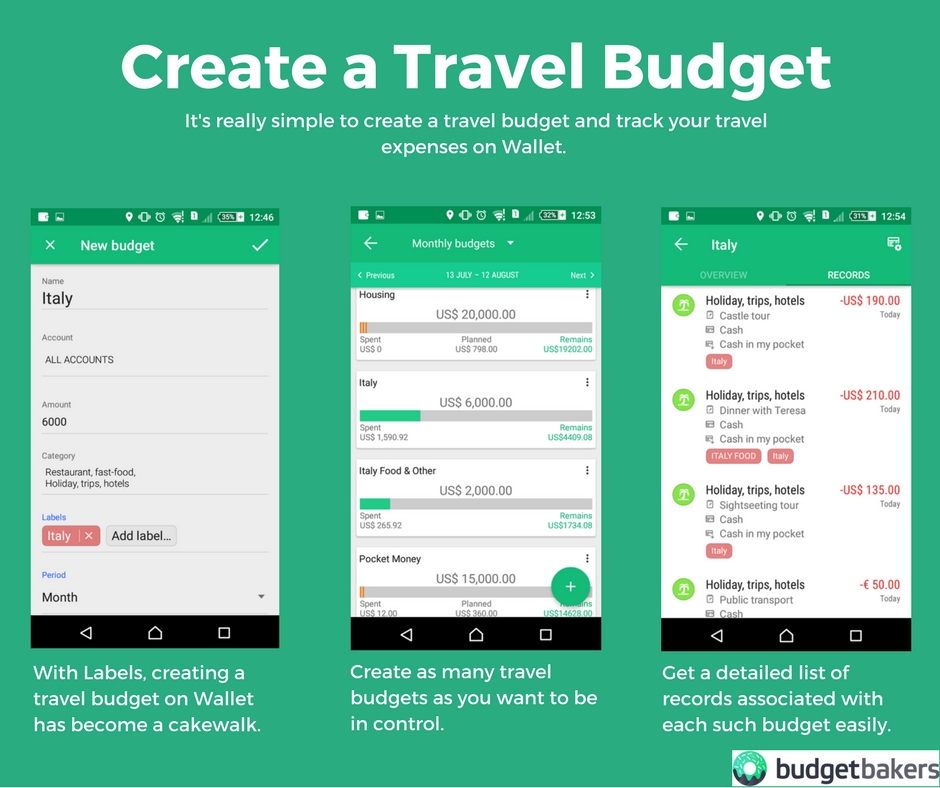
If you want to dig in a bit more, you could create different budgets for different categories of expenses you want to track on the trip, say food and daily expenses, or just taxi (helps if you would want to claim it back later) and so on. Just create a new label for it and create a Budget with the respective label.
You could also create different budgets for each place you’ll be visiting on a long trip . The choices are limitless. Wallet gives you tools that can be customized as you wish to simplify the process of money management for you.
And, if you don’t want to track your expenses on the go, but still want to compare your expenses with your budget, you could just Import your transactions once you’re free during the trip or after the trip as per convenience.
Coming up with a realistic travel budget is the first and basic step towards planning a great vacation. It gives you a clear idea of what exactly you’ll be able to afford, sets guidelines for how much you need to save for and lets you be in full control of your money. So get a budget and take that vacation now!

Over to you…
Do you create budgets before you travel and track your expenses while on the road? What are your tips for a financial stress-free vacation? We would love to know. Share your ideas, thoughts and suggestions with us in the comments section below.

Share this post!

The Impact of Daily Habits on Your Budget: Part Two

The Impact of Daily Habits on Your Budget: Part One

Financial Markets Explained: Stocks, Bonds, and Beyond
Cookies give you a personalised experience, privacy overview, how it works.
Plan, Ready, Go
Planning a Trip Budget that Works for You
You’ve chosen your dream destination. You’re finally going to take that trip to Paris, Rome, or Hong Kong. Now you have to figure out how much all of this is going to cost. You need to think about planning a trip budget.
But, where do you start? In this article, we’re going to discuss the ins and outs of planning a trip budget. And I’m going to lift the curtain on how much we spent on one of our trips. I know. This is exciting stuff.
Key takeaways
- Planning a trip budget is a crucial step in the travel planning process and should reflect your travel preferences and priorities.
- Accommodations and airfare are typically the largest expenses.
- I highly recommend setting aside travel funds in a dedicated account and avoiding debt for travel.
- Tracking expenses during the trip helps manage the budget and ensures funds are available for desired activities and future travels.
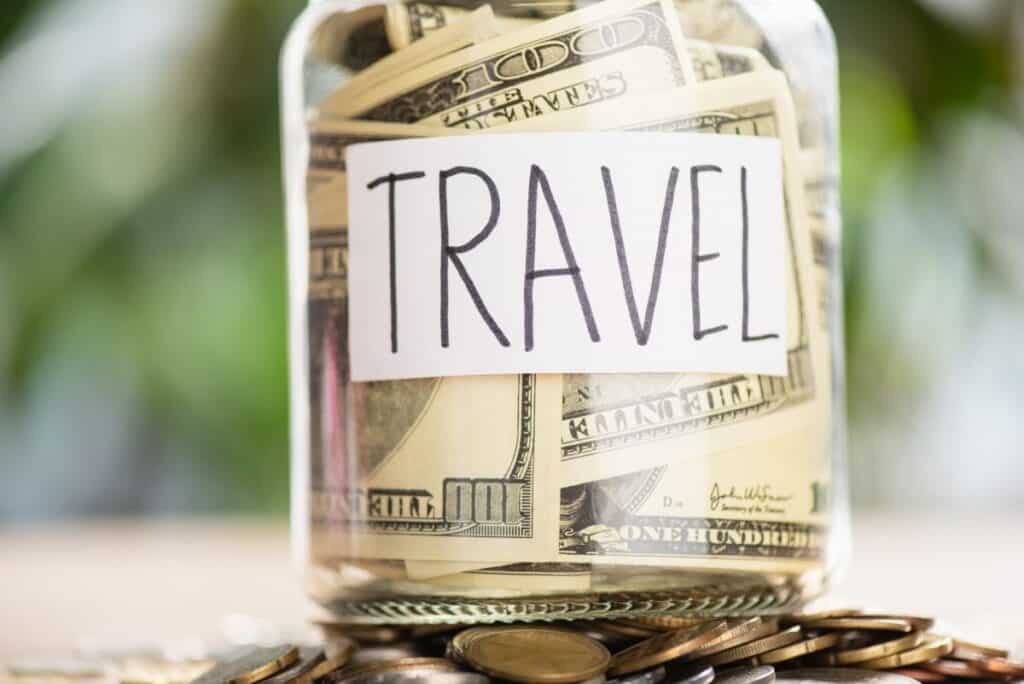
This post includes affiliate links. If you make a purchase through one of these links, I may earn a small commission at no additional cost to you. As an Amazon Associate, I earn from qualifying purchases. See disclaimer.
You’re ready to take that dream trip. You’re looking for airfare and hotel deals online. Good for you. I absolutely do that too. But before I book those big-ticket items, I like to have at least a decent estimate of what my total trip cost is going to be so I don’t blow too much of my budget on any one part.
5 Easy Steps to Planning a Trip (Especially for Beginners)
First step: making decisions about your travel budget
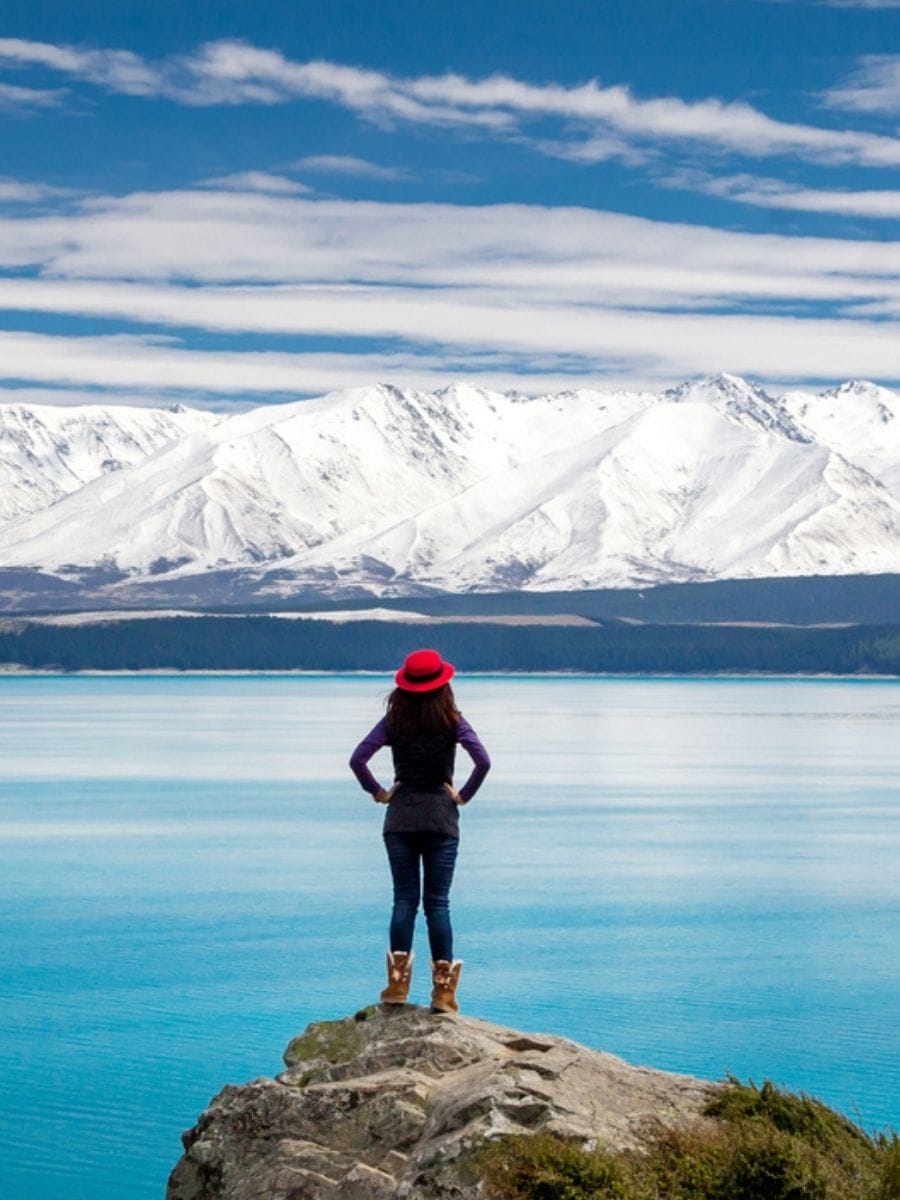
How do you decide where your travel dollars should go? Well, a lot of this will be dictated by your personal preferences.
- Do you value luxury accommodations or hotel stays and fine dining or are you more interested in investing in comprehensive tours and once-in-a-lifetime experiences at your destination?
- Would you rather do one more expensive trip every now and again or do you explore the world on a smaller budget so you can travel more frequently ?
- Do you prefer international travel over domestic trips?
- Do you rely on car rentals when you travel or do you prefer to walk and/or use public transportation?
- Do you prefer long-term travel on a shoestring, like backpacking through Southeast Asia?
Perhaps your ideal trip includes Michelin-star restaurants or large rooms in high-end hotels. Or maybe you’d rather stay in a hostel for a few nights and cook your own meals so you have the money to do that $350 heli-hike to a glacier on New Zealand’s South Island.
MUST READ: My Favorite Travel Planning Resources
Asking yourself these kinds of questions will clarify the best way for you to allocate your travel dollars in the way that works best for how you like to travel.
And be honest with yourself about what you want. There’s nothing inherently virtuous about spending as little money as possible on travel. Nor will your trip automatically be better just because it’s more expensive.
The best travel budget is the one that gets you where you want to go at a cost you’re okay with spending.
Next: Estimate your travel expenses
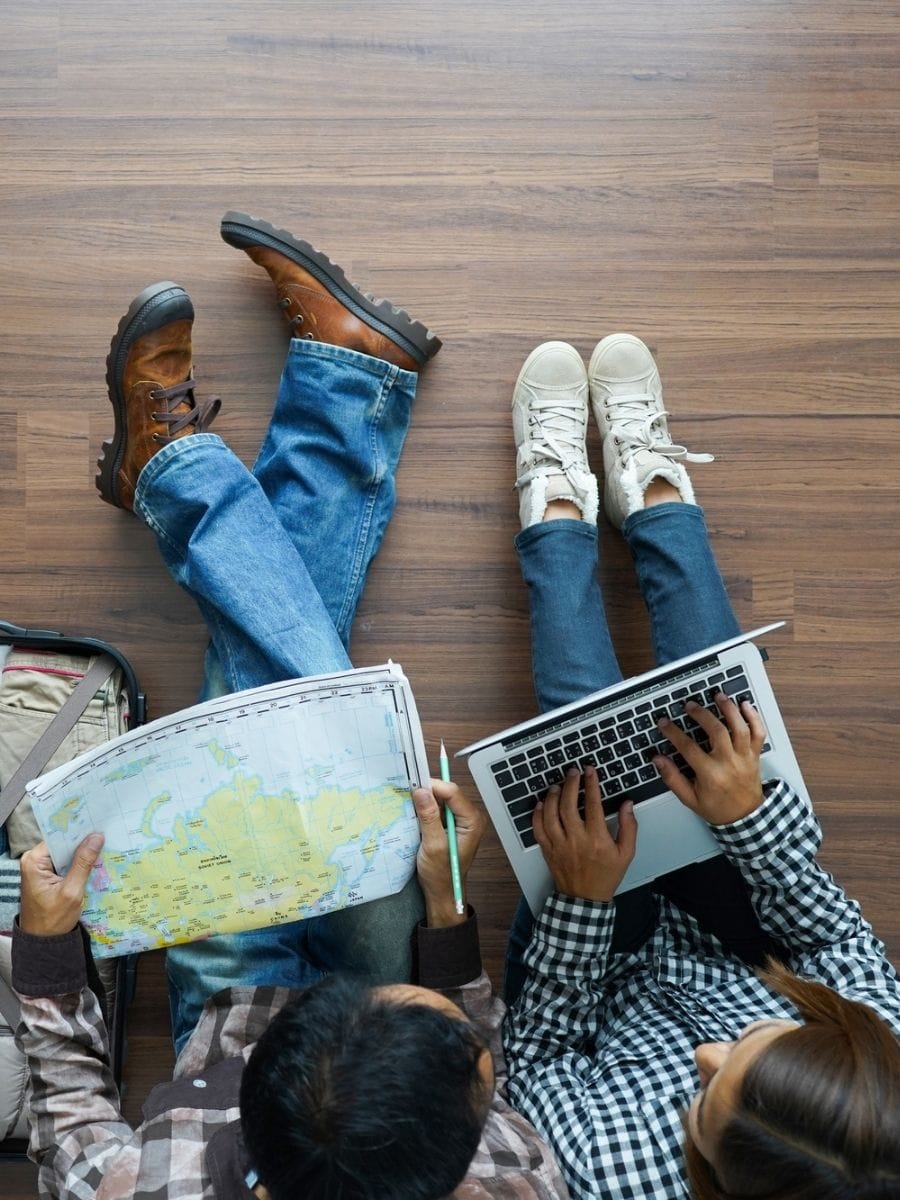
To start, I estimate the costs for airfare and accommodations with some basic online research. It’s usually safe to say that those will represent the two biggest expenses in your trip budget.
This step can take a considerable amount of time. I just don’t like spending a lot of money on airfare, so I wait for the best deal …and if one comes up that works for when I can take time to travel I jump on it.
Going (formerly Scott’s Cheap Flights) is my top choice for finding amazing cheap flight deals.
I also love to use Google flights to track flight prices before I book.
Read more about How to Fly for Less
We typically book our airfare first, then our accommodations. Occasionally we find the perfect place to stay (like when we spent a week in Florence ) and we’ll book that first, but that’s fairly rare.

After those are done, we have a much clearer picture of what our potential trip cost is.
How much we spend on the rest of our trip is largely dictated by the plane ticket and apartment/hotel costs.
Vacation Budget Guidelines
To help you out, here’s a basic framework of how we set our travel budgets:
- Transportation (including airfare, train fare, gas, public transportation, rental cars)—30%
- Accommodations (vacation rental, hotel room) —30%
- Daily budget for expenses while traveling (meal costs and other food, souvenirs, incidentals)—20%
- Activities/site entry fees/city or museum pass —10%
- Miscellaneous (for unanticipated or extra costs, budget overages)—10%
These percentages will vary depending on your destination and how you like to travel, but it makes a good starting place. For some travelers, airfare will make up closer to 50% of the budget, and for others, food will take a larger chunk.
Destination can especially change these percentages greatly. If you’re planning a trip to Disney World those park tickets can easily take up a significantly larger portion of your budget than 10%.
Likewise, if you’re heading to Moorea for a stay in an over-water bungalow, well, first of all, I’m jealous, but secondly, that means you’re probably spending more on your accommodations than you might otherwise.
For road trip travel, of course, your transportation expenses will be largely gas for your car, and you can eliminate the airfare expense.
As you plan more travel, you’ll get a better feel for how much you can expect to spend for the way you usually travel.
And you don’t have to stick to this religiously. If you go over budget in one area, you can easily trim back a bit in one or all of the other areas to compensate.
Easily figure out your budget and track your daily travel expenses with this travel budget spreadsheet .
Set aside your travel funds
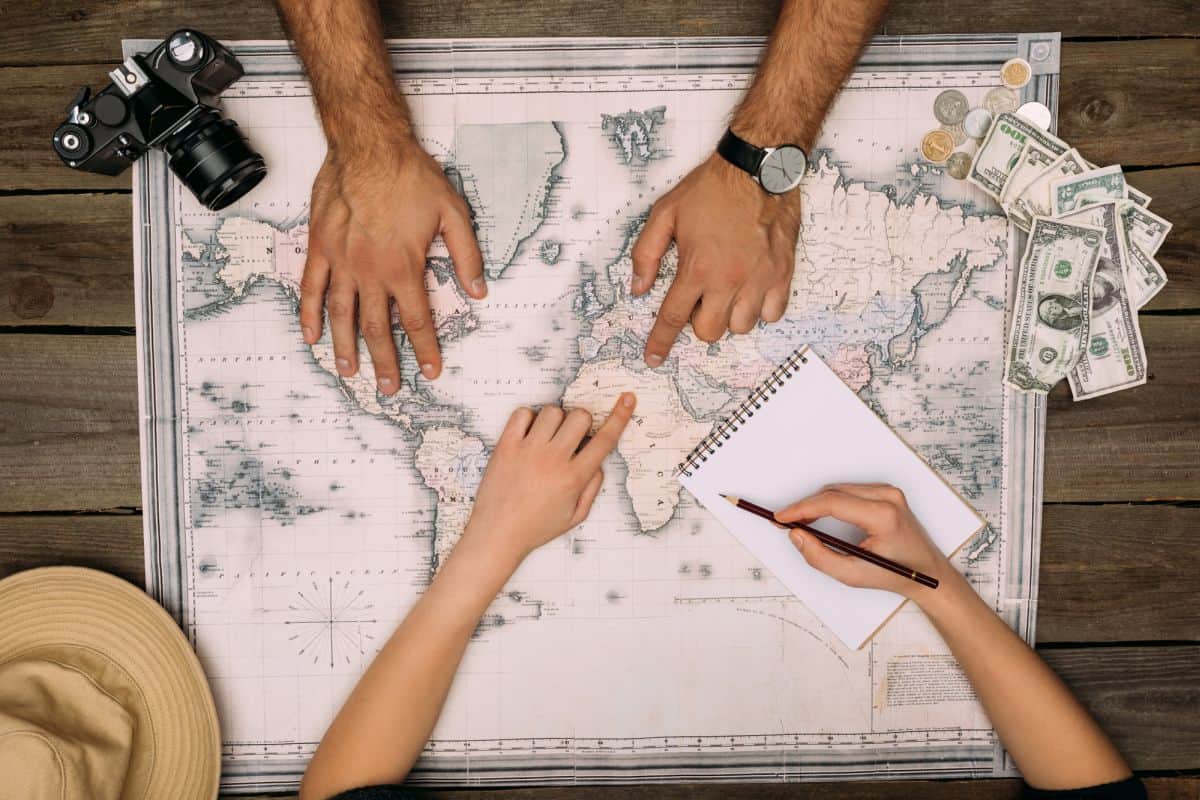
Personal finances can be a touchy subject. I understand that.
But I’m going to strongly recommend that you never go into debt to travel. Once you’ve decided how much money you will need to cover your trip costs, it’s time to start setting aside money for that trip.
Setting up a separate bank account for your travel fund is a great way to keep that money separate from the account you use for your regular everyday living expenses.
For more great ideas about saving for travel, see my article all about affording more travel .
Make sure you’re tracking trip expenses while you’re traveling
Keeping on top of every penny we spend as we travel helps with decision-making as we go. Those unexpected expenses can creep up on you if you’re not careful.
We tally everything up at the end of the day so that we know exactly how much we’ve spent. And this works whether you prefer to travel with a debit card or use credit cards.
This way, as the trip progresses we know for sure whether we can go back to a favorite restaurant that was maybe a little pricier, or pay for the admission to that site that was on our “maybe” list because we weren’t sure if we could afford it.
Or even buy that “splurge-y” souvenir.
AND…every penny we don’t spend on one particular trip goes to the budget for the next trip that needs additional funding.
And that’s how we do it!

Sample: realistic travel budget
Let’s use the example of one of our recent trips (to Paris) to see how this works out in reality:
Transportation (air and ground)
- Round trip airfare for two (American Airlines, basic economy from ATL to CDG): $1,084.06
- RER (Paris commuter train), from and to CDG, to and from Versailles, several metro tickets: $68.29
- Total transportation: $1,152.35
- Percentage of total budget: 31%
Accommodations
- 7 nights rental apartment through Vrbo, plus damage protection): $1206.29
- Percentage of total budget: 33%
Daily expenses while traveling
- Food, souvenirs, incidentals: $708.58
- Percentage of total budget: 19%
Activities/site entry fees
- Paris Museum Pass (two, 6-day passes purchased at the airport): $166.57
- Eiffel Tower tickets (1 summit ticket and 1 ticket to the second level purchased online in advance): $47.14
- Palais Garnier guided tour tickets (purchased online in advance): $38.34
- Total activities/sites: $252.05
- Percentage of total budget: 7%
Miscellaneous expenses
- WiFi hotspot rental (from Vision Global): $53.80
- Travel insurance (World Nomads explorer plan): $236.93
- ATL airport parking for 9 days: $90
- Total miscellaneous: $380.73
- Percentage of total budget: 10%
So even though we went a little over budget on the accommodations, we were under budget for our sightseeing and daily expenses. So, we more than made up for spending a little more on the apartment rental.
The daily expenses part of the budget usually is where you’re going to have the most flexibility in your budget since so many of the other costs will be set ahead of time.
I usually greatly overestimate how much we’ll need for this part of our budget. It’s not intentional necessarily, but I do want to make sure we’re comfortable, not scrimping.
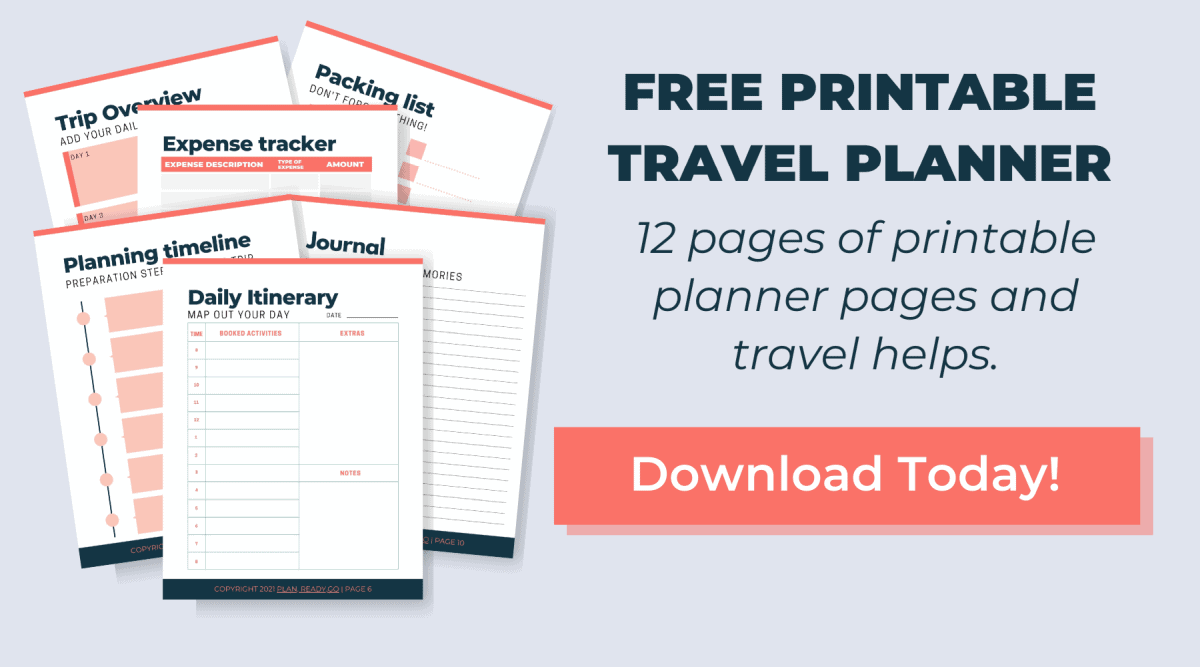
Final thoughts on planning a trip budget
You’ve got the basics down. Now it’s time to start putting your travel budget together.
It may seem daunting at first, but if you break it down into smaller steps it becomes a lot more manageable. So don’t forget—before you go booking all those flights and hotels, take some time to sit down and create a realistic budget for your trip.
And then make sure you set aside money for your trip and track your expenses while you’re away. It may seem like a pain, but trust me, it will be worth it in the end.
And who knows? Once you see how much money you can save by being smart about your spending, you may just decide to travel more often!
Now that you know how to create your travel budget, it’s time to start planning your dream vacation!
More articles to help you plan your trip
- 5 easy steps to planning a trip (perfect for beginners)
- Planning a travel itinerary: the complete guide
- How to save money so you can travel more
- How to fly for less
- How to use Google flights to save money on airfare
- Essential travel planning resources
- Creating a good balance between sightseeing and relaxation on vacation
- Should you book directly with your hotel or use a third-party site like Booking.com?
- Essential tips for packing light and traveling carry-on only
Pin this post!
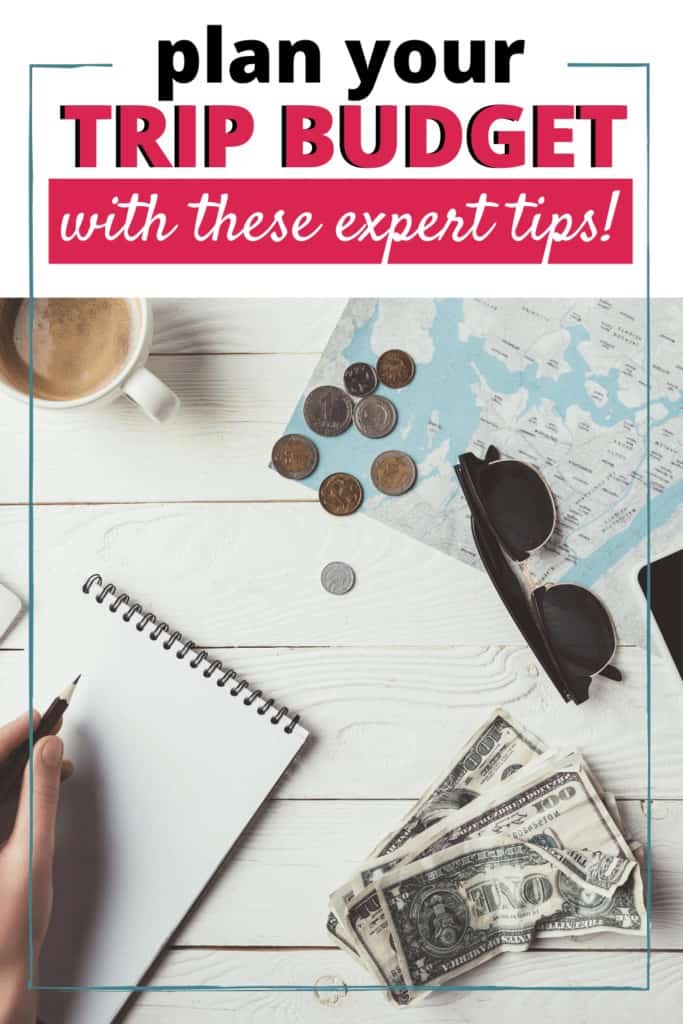
Darcy Vierow is a busy professional and travel planning expert with years of experience maximizing travel with limited time and on a less-than-average salary. Her tips have been published by Forbes, MSN.com, Yahoo! News, Yahoo! Finance, Aol, Newsbreak and GOBankingRates. Read more about Darcy Vierow .
This was so helpful! I will definitely do this for our next trip.
Thanks for reading! I’m glad you found it useful.
Leave a Reply Cancel reply
Your email address will not be published. Required fields are marked *
By using this form you agree with the storage and handling of your data by this website. *
Privacy Overview
- Search Search Please fill out this field.
- Credit Cards
- Credit Cards 101
How to Budget for a Trip
Plan ahead, save up, and make the most of credit card rewards
:max_bytes(150000):strip_icc():format(webp)/KhadijaKhartit-4f144e2b63ee4dd4af60ac8a02233c50.jpg)
Plan for the Big Expenses
Account for the little costs of traveling, redeem rewards and bonuses, make a travel budget savings plan.
The Balance
Whether you’re planning an international vacation or a long-weekend road trip, the idea of escaping your daily life for the promise of relaxation and adventure is intoxicating. But while planning a big trip can be exciting, it can also be overwhelming—especially when you’re trying to figure out how much it’s going to cost.
We’ve created a simple Google spreadsheet to help you plan and budget for your next trip. The Balance’s Travel Budget Worksheet includes common expenses (large and small), plus space to enter credit card or other loyalty program rewards that defray some of the cash costs. It’s free to download and use (but you will need a Google account).
The last thing you want is to arrive at your destination and realize you’re out of money. That’s why it’s important to make a travel budget that includes everything from rental car costs to seat selection fees. As part of “ Our Money’s on Travel ”—our series on getting back to travel—we’re taking a look at how to budget for a trip, whether it’s the big costs or the small, plus a few travel hacks to help you save money along the way.
Most trips involve significant expenses such as transportation and lodging. How significant they are depends on your plans—transportation could include plane tickets or gas for your car, and lodging could mean a five-star hotel or a cabin in the woods. Websites such as Budget Your Trip can help you plan for these costs, but don’t factor in any tips or tricks for saving money. So while this kind of budgeting site can be a good starting point, there’s a lot more that goes into planning your travel budget. Here are a few strategies for saving money on these major travel expenses.
- If you have access to multiple airports, like New York City residents, check prices out of all of them: LaGuardia (LGA), John F. Kennedy (JFK), and Newark (EWR).
- If you only have one local airport, consider booking a separate, cheaper ticket to a major hub, which may offer cheaper flights.
- Be flexible with your dates and aim to travel during off-peak times.
- In pre-Covid times, there was evidence that you could get the best fares by booking 20-115 days in advance and flying on Tuesdays or Wednesdays. But those bets are off because airlines’ pricing formulas are in transition as they cautiously ramp up for more travel. For now, you’ll just have to look for deals and grab them when you see them.
- Follow airfare deal sites such as Scott’s Cheap Flights , Secret Flying , and Dan’s Deals to find out about cheap flights as soon as they’re available.
- Check multiple sources before booking hotels to find the best rates and deals. For example, Hotels.com offers a free night for every 10 nights you book. Large hotel chains often advertise best rate guarantees and will give you up to 25% off your stay if you find a better rate elsewhere.
- Consider shared lodging, such as a private room or dorm in a hostel or a private room in a local’s house on Airbnb, rather than renting an entire home.
- Take advantage of any deals through membership programs such as AAA and AARP.
Transportation
- If you’re planning to rent a car, use sites like Autoslash to compare rental car costs across a wide variety of programs and get a quote for the cheapest rates available.
- Train passes, like the Eurail Pass , offer discounted or unlimited travel for a fixed price so you’ll never be surprised by last-minute ticket costs.
- Electric scooter companies such as Bird and Lime allow you to purchase daily or monthly ride passes in certain cities.
Is Travel Insurance Worth It?
Travel insurance protects you in case of unexpected delays, cancellations, or medical costs in covered situations. But before you buy it from your airline or another carrier, check to see whether you’re covered by the credit card you’re using to book your trip.
In addition, many airlines have eliminated change fees for flights, while many hotels have begun allowing flexible cancellations on their bookings. If you won’t face financial consequences for changing those big-ticket bookings, travel insurance may not be worth the cost.
The big costs aren’t the only ones to consider beforehand. Your travel budget should also consider expenses like tipping, entertainment, souvenirs, food, and even cellphone fees.
Plan for as many of these costs in advance as possible so you aren’t surprised during your trip—or when you return home to larger-than-expected bills.
Watch out for these costs and minimize or eliminate them with these smart strategies:
- Rental car additional driver fees : If you need a second driver on your booking, book through a service that includes them for free, such as Costco Travel .
- Rental car insurance : If you already have car insurance, check to see whether it extends to rental cars. If you don’t own a car, look into a non-owner car insurance policy that will cover you when you drive a rental, which generally costs far less than traditional rental car insurance policies. Also, check whether the credit card you’re using offers its own rental car insurance.
- Debit card holds : Hotels and rental car companies will put a hold on your card when you arrive. If you’re paying with a debit card, the money they put on hold will not be available to you until the hold drops, which could take some time. If possible, make your bookings with a credit card instead, or include the hold in your travel budget.
- Cellphone coverage : If you’re with Google Fi or T-Mobile, you’re in luck, as most locations are covered for free by your cellphone plan. Otherwise, consider purchasing a local prepaid SIM card, which can cost significantly less than the international roaming fees charged by most cellphone companies. Or plan to leave your phone on airplane mode and only use it when connected to Wi-Fi.
- Entertainment costs : Many major cities offer tourist cards, which bundle tickets to a number of attractions onto a card that’s valid for a set number of days. If you plan to hit all the highlights, these cards could save you a bundle over individually purchased tickets.
After diligently earning rewards on your travel credit cards, now’s the time to cash them in for free flights and hotel stays. You can choose to redeem points directly through your card’s travel portal, or transfer them over to hotel or airline chains to book awards.
We recommend crunching the numbers to find the best way to redeem credit card points . For example, hotel chains such as Hilton and Marriott offer the fifth night free on award bookings, so it may make sense to transfer your points to your hotel rewards account. This can also be a good strategy for buying expensive flights, as airlines will sometimes charge a set amount of miles for a ticket even if the cash price is high.
Now that you’ve got a handle on how to save money on travel expenses, it’s time to do the heavy lifting: actually saving money for your trip. Consider these ways to save up for your trip:
- Set up an automatic transfer from your checking account into a dedicated “travel fund” account. This strategy keeps your travel budget separate, so you’re not tempted to spend it elsewhere before your trip.
- If you receive a tax refund, put as much as you can straight into your travel fund.
- If you have extra cash left over from the stimulus checks, move it into your travel fund.
- Work bonuses or side hustles could offer unexpected ways to boost your travel account.
- If your family exchanges gifts, consider letting them know that you’re saving up for a vacation. Cash is always an option, and gift cards for hotels, airlines, and restaurants can also make a significant contribution to your travel budget. They could even give you frequent flyer points if they’d like.
CheapAir.com. " CheapAir.com’s 5th Annual Airfare Study Reveals the Best Time to Buy Airline Tickets ."
Hotels.com. " Instant Savings. Reward Nights. And more ."
Marriott. " Best Rate Guarantee Claim Form ."
Hilton Honors. " What Is an Example of How the 5th Night Free Is Calculated? "
Budgeting Basics: How To Create a Travel Budget For Your Next Adventure

Nothing bursts that post-vacation bubble faster than checking your credit card statement and realizing that yes, spending money abroad does in fact count. As you land back in reality, the financial hangover and guilt start to creep in, making you question the worthiness of your trip. Here's the thing — your buyer's remorse is valid, but it shouldn't cast doubt on the value of your travels. Even when plans go awry, exploring the world is always worthwhile. The key is maintaining your financial peace of mind with a comprehensive travel budget.
Not sure where to start? Well, you're in the right place. We're sharing everything you need to know about budgeting for your next trip to help you avoid that dreaded post-vacation financial hangover.
In this article:
- Why do you need a travel budget?
- Everything you should include in your travel budget
- 5 steps to help plan your travel budget
- Practical tips to help you save money while traveling
- Travel budget FAQs
Why Do You Need a Travel Budget?
Let's be honest, budgeting is kind of a buzz kill, especially when it comes to planning out an eagerly anticipated international trip. That's because when you think of budgets in terms of dollars and cents (and euros and pounds), they feel a bit restrictive. But your travel budget is more than just a financial threshold: It's a roadmap that helps you maximize your travel experience while staying within your means.
Is it a bit tedious to map out your expenses? Sure. But ensuring you can cover travel essentials like flights and accommodation allows you to enjoy those unforgettable travel experiences without the guilt. The best part? There are no rules dictating how much you need to spend where, so you have the freedom to allocate your money based on what matters most to you. That means if you'd rather survive on nothing but baguettes and cheese to afford tickets to see your favorite artist perform live in Paris, you can — which actually sounds pretty empowering.

Source: Unsplash
Everything You Should Include in Your Travel Budget
Before you whip out your calculator, it's important to know exactly what you need to include in your travel budget. Although your specific budget will be heavily influenced by your itinerary, be sure to include these common travel expenses.
Passport and Visas
As exciting as it is to start searching for flights and accommodation, take a peek at your passport's expiration date first. To enter many countries (like China, Egypt, India, and Thailand), your passport needs to be valid for six months post-arrival. If your expiration date doesn't make the cut, you'll need to renew it before your trip. While renewal fees vary by country, in the U.S., passport renewals start at US$130, with additional fees for expedited timelines.
Depending on your nationality and destination, your passport might be all you need for your trip. However, many countries now require advance visas with associated entry fees. These fees start at around US$30 and go up from there. If your journey involves multiple stops or a more expensive entry fee, these visa costs can quickly add up. So keep these paperwork expenses in mind while planning out your travel budget.
Travel Insurance
Although some travelers are willing to roll the dice when it comes to travel insurance, it's arguably the most important aspect of your travel budget. Why? Well, if you get sick or into an accident while abroad without travel insurance, all that time you spent meticulously budgeting goes right out the window. Especially if you need to be urgently flown home for medical treatment. Is there a chance you'll pay for insurance and never use it? Of course. But it's better to be safe than sorry. Fortunately, many credit cards offer free travel insurance (or affordable add-ons), so make sure you give them a call before purchasing through a travel company.
Vaccinations
While COVID-19 vaccinations only recently became a travel requirement, other routine and travel-related vaccinations don't get quite as much attention. But that doesn't mean they're needed any less. To stay safe while abroad, consult your doctor before you travel, and remember to include the additional vaccination costs in your travel budget.
Clothes, Gear, and Toiletries
Whether your pre-trip shopping list includes swimsuits, safari gear, or medical supplies, these are all trip-related expenses that should be included in your budget — and yes, even if you buy them months in advance, it still counts as a travel expense.
Transportation
Your flight will undoubtedly eat up a large chunk of your transportation budget, but your transportation needs don't begin and end at the airport. Although the costs of car rentals, taxi services, and public transportation may be minuscule in comparison, over the course of your trip, they'll add up. And while you may be able to snag a cheaper flight by being flexible with your travel dates, there aren't quite as many deals to be had when it comes to local transport. So, do some research on average rates, and plan accordingly!
Accommodations
Accommodation is another big-ticket item that will likely take up a large portion of your travel budget. Understandably, these costs vary considerably depending on where your travel takes you, but it's important to pre-emptively budget for them nonetheless. Whether you prefer five-star hotels or budget-friendly hostels, proactively factoring in these costs will ensure you're comfortable while establishing a realistic financial plan for your trip.
Attractions and Activities
Once you've earmarked a healthy portion of your budget for your must-have expenses, it's time to make room for the fun stuff. This category encompasses activities such as tours and excursions, the extent of which will largely depend on your priorities. For example, if you're heading to the Bahamas primarily for a two-day snorkeling excursion, you may choose to spend less on food or accommodation.
Shopping and Souvenirs
Again, depending on your preferences, you may want to allocate more of your budget to shopping and souvenirs than attractions. This part of your budget can include things like clothing, souvenirs, local specialties (like wine, cheese, or sorrel), and gifts for your loved ones who weren't able to make the trip. Just remember to keep your purchases small to avoid paying extra baggage fees on your return flight!
Food and Dining
Whether you're planning on eating simply at local grocers or indulging at high-end restaurants, you'll probably end up spending more than you think. This is particularly true if you're staying in tourist hotspots. To help your money go further (and enjoy authentic local cuisine), find out where the locals eat. You'd be surprised at how much more affordable (and delicious) dining out can be when you're not unknowingly paying that premium tourist tax.
Communication
It's also important to pre-plan and budget for communication while you're away. You just never know when you'll need your phone. And while your local carrier likely has an international roaming package, these are often expensive and come with restrictions. With an eSIM from Airalo, you can stay connected, eliminate unexpected roaming fees , and keep your communication budget on track.
Emergencies
It's a fact of life that travel rarely goes to plan. Setting aside an emergency fund for unexpected expenses (like rebooking a flight) or medical emergencies will help safeguard your travel budget against the unknown. Best case scenario? It's left over at the end of your trip and you can splurge on something you wouldn’t otherwise have the budget for, or save it for your next adventure.

5 Steps To Help Plan Your Travel Budget
Overwhelmed by the sheer amount of costs you need to consider? Keep reading. These five steps will help you identify, estimate, and prioritize your expenses, so you can enjoy your trip without any financial stress.
Identify and Estimate Your Big Ticket Items
It's always best to start with the big-ticket items like flights, accommodations, and any major activities you plan on doing while abroad. Do your research and use travel websites to compare prices before booking. By simply changing your travel dates to mid-week rather than over the weekend, you can save hundreds of dollars on your flight. Use these estimates as the foundation of your budget to ensure you have enough money to enjoy your trip once you get there.
Estimate How Much You'll Be Spending on the Main Travel Categories
Once you've estimated your big-ticket items, spend some time estimating main travel categories like food and transportation, as this will take up the second largest chunk of your budget. Start by doing a little research to determine local costs of transportation and food. From there, you can prioritize where you'd like to spend your money.
Ensure You Include Estimates for All Items
While it can be difficult to accurately consider every single expense you'll encounter on your trip, visualizing it from start to finish can help. Create an expense list including everything from your morning cup of coffee at the airport to your taxi home, and everything in between. This will shine a light on how far your budget needs to stretch and make establishing your priorities much easier.
Establish Your Priorities
With your comprehensive checklist at the ready, you can identify and prioritize the travel experiences that mean the most to you. For instance, if your itinerary is so packed that you'll rarely be at your hotel, you can opt to stay in a more affordable hotel or hostel and spend your money on activities instead. Try to be as flexible as you can with non-essential items to leave room for what you really care about.
Start Saving
Once your travel budget is sorted, it's time to create a savings plan to help you get there. Set a realistic timeline, determine a monthly savings target, set up a dedicated savings account, and outline cost-saving steps you can take to achieve your goal. Although sacrificing your weekly takeout order may not be ideal, travel memories last much longer than a meal, so do your best to stick with it!

Practical Tips To Help You Save Money While Traveling
After trimming down non-essential expenses to save for your travels, it can be tempting to treat yourself more than you typically would during your trip. But that defeats the purpose of budgeting in the first place, so lean on these money-saving tips to stay on track during your journey.
Do Your Research
There's nothing worse than falling for a tourist trap or realizing you spent twice as much on your taxi from the airport than you had to. Knowledge is power here. Before you travel, research local rates for things like taxis, meals, and even coffee. That way, if someone tries to charge you extra, you can politely decline from the start.
Book in Advance
Whenever possible, it's always more cost-effective to plan ahead. And that applies to more than your flight and accommodation. By pre-planning and booking activities, you'll get better deals and discounts, and avoid the decision fatigue that often comes with long-term travel.
Live Like a Local
Between frequent taxis and eating out for most meals, being a tourist comes at a cost. To make the most of your budget, do like the locals do. That includes using public transportation, walking, exploring local markets, and venturing off the beaten path to eat where the locals do. Not only will you save money, but you'll also immerse yourself in a more authentic experience, creating lasting and shareable travel memories.
Stay in Budget Accommodations
Let's be honest, you're probably not going to spend much time in your hotel room. That's kind of the point of traveling, right? You want to get out there and see as much as possible. So, why spend a huge portion of your budget on accommodation? With options like Airbnb, hostels, and guesthouses, you can spend less on accommodation and have a more authentic local experience.
Use an eSIM
While your first instinct may be to purchase a daily international roaming package from your mobile carrier, spending an extra $12 to $15 a day to use your phone with restrictions is pretty pricey. Plus, there's always the risk of going beyond the limits of your plan. The more budget-savvy option? An eSIM from Airalo. With reliable, cost-effective data plans for international travel, an eSIM from Airalo keeps you connected without the risk of racking up roaming fees — so you can spend your money on experiences you'll remember, rather than the mobile services that helped you get there.
Never worry about roaming fees derailing your travel budget again with an eSIM from Airalo .

Travel Budget FAQs
How much money do you need for a travel budget.
The short answer? It depends. Even two travelers with the same destination and timeline could have wildly different budgets based on their travel preferences (like accommodations, food, and activities), and priorities for their trip. To determine how much money you need for your travel budget, research local costs and create an expense checklist to help you manage your budget effectively.
How Can You Plan for Unexpected Expenses When You're Traveling?
When it comes to planning for unexpected expenses while traveling, a good defense is the best offense. Even if your trip is relatively short, you should always invest in comprehensive traveler's insurance and allocate a portion of your travel budget as an emergency fund. It's also a good idea to have a reliable way to seek help should an emergency occur.
Is There a Formula for Establishing a Base Travel Budget?
To establish a base travel budget, begin by assessing the amount you've saved or plan to save for the trip, along with your monthly expenses (like rent, car payments, and insurance). Deduct your monthly expenses from the overall budget to determine how much is available for the trip while still covering essential costs. To get more specific, you can divide this number by the number of days you plan on being there for a rough idea of your daily budget. This will help you identify whether your budget will cover the travel experiences you want or if you need to save for a little bit longer.
Kali is an experienced freelance writer and former Canadian expat. Having called places like Norway, Denmark, Croatia, and the UK home, she's well-acquainted with the complexities of culture shock and skillfully sidestepping 'must-see' attractions in favor of authentic local experiences. Kali intertwines her passion for storytelling and travel to inspire others to venture beyond the norm and embrace unique travel experiences.
Ready to try eSIMs and change the way you stay connected?
Download the Airalo app to purchase, manage, and top up your eSIMs anytime, anywhere!
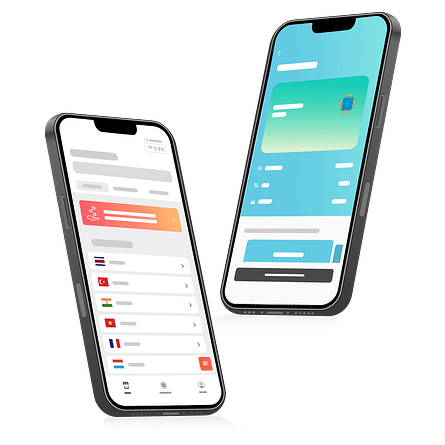
Use Your Free Credit.
You can earn US$3 Airmoney credits by sharing your referral code with friends.
How To Plan a Trip On a Budget
6 minute read

By Alannah Koene
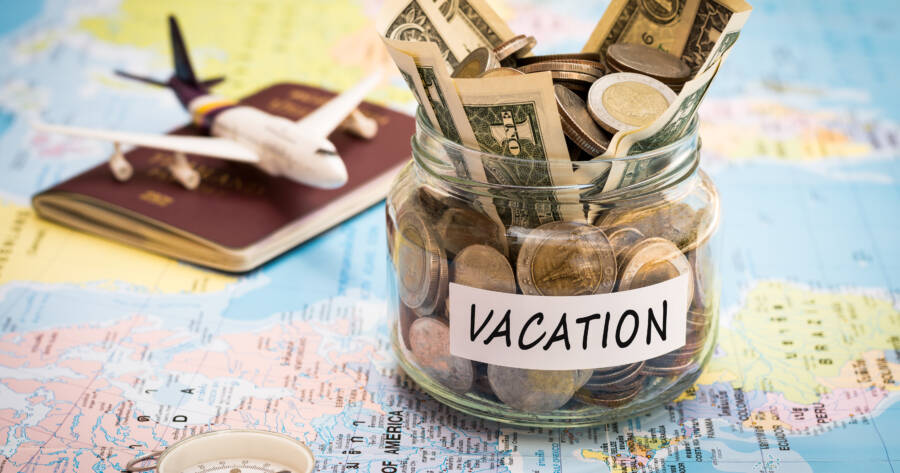
Social media images of friends and influencers traveling the world and staying in extravagant hotels can easily inspire travel envy, but most people prefer to travel without spending exorbitant amounts. Budgeting for a trip and finding creative ways to cut costs gives you a sense of preparation and control, so you can better enjoy your vacation.
With some cost-effective planning and strategizing, it won’t be long before you’re posting beautiful travel photos of your own.
Create a Budget
Creating a trip budget is the first and most important step as it provides a basis for the rest of your travel plans. Analyze your personal budget to determine how much money you have available for travel expenses, then allocate those funds to three categories:
- Preparation expenses: Money spent before your trip, such as for passports, travel insurance, visas, vaccinations and transportation.
- Actual expenses: Costs incurred during your trip for accommodations, activities and food.
- Emergency funds: Money in case of emergencies, such as stolen cash or unexpected expenses.
Keep track of your budget by setting up spreadsheets. A visual overview of your trip budget can help identify which expenses you might need to cut out or where you can afford more lenience.
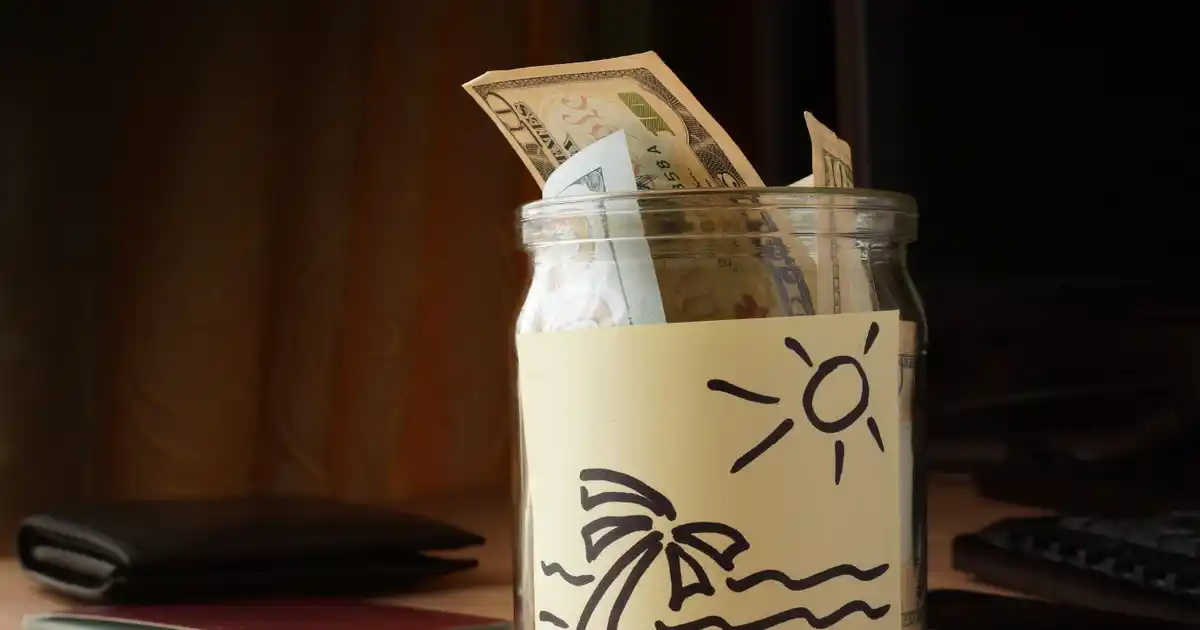
Narrow Down Top Destinations
Start the next phase of your trip planning by short-listing a few of your top destinations. This provides a starting point for organizing your travel funds but gives you the flexibility to narrow your list down to destinations that fit your budget and priorities best.
If your idea of a perfect vacation involves lounging on sandy beaches, for example, create a list of your ideal beachside destination. From there, you can research which destinations have the best deals available.
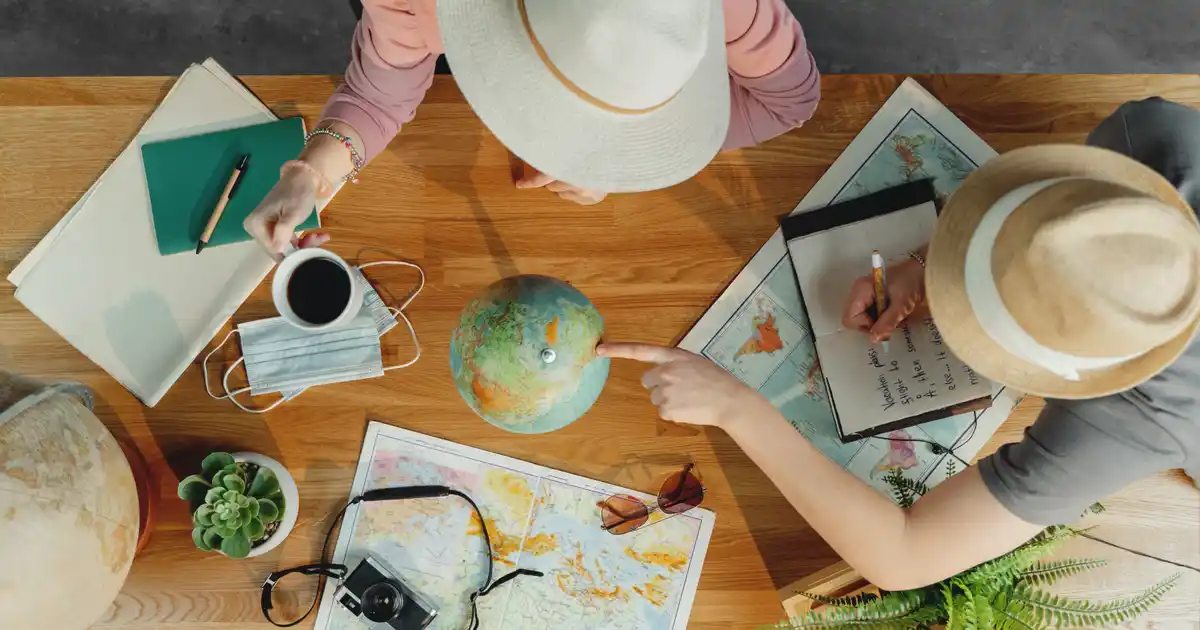
Consider Staying Close to Home
Traveling abroad isn’t always financially feasible, but there are many ways to travel and explore without going too far. Many people opt for a staycation and explore their city or greater regions as a tourist would, which means their whole budget goes toward entertainment rather than transportation and accommodation.
Other options include:
- Taking a road trip
- Camping at a nearby national park
- Going on a hiking trip
- Booking a local tour
- Exploring a new local beach
- Staying in hostels in nearby cities
- Visiting museums and art galleries

Identify Priorities and Big-Ticket Items
Get the best experience from your vacation by identifying your priorities. By factoring priority activities or expenses into your budget and then planning the rest of your costs around them, you’re ensuring that you’re spending your money exactly the way you want without missing out on the best experiences.
Some people value comfort on vacation and prefer a nicer room, but many are happy to live cheaply in hostels and splurge on experiences. If you’re visiting Costa Rica, for example, would you rather have luxury accommodations or spend your money on a scuba diving course? Do you prefer to spend your money on souvenirs or dining experiences? These are the types of questions that help organize your priorities and spending.

The earlier you start planning for your trip, the better. Many prices for transportation, hotels and attractions increase as the dates get closer, so starting your search early can help you find the best rates.
Planning early also reduces travel stress later on. Schedule which days you’ll do certain activities, book tours and tickets, arrange car rentals and organize reservations. Make sure to block off days in between big outings to relax and recover from your packed schedule.

Travel During Off-Season
Traveling during the off-season comes with lots of savings. You’ll find lower rates for accommodations and activities since tourist destinations use increased demand during the high season as an opportunity to hike prices, but they’re eager to fill up spots when business is slow. With more last-minute bookings and reservations available during the off-season, you’ll get more flexibility from your itinerary.
In addition to savings, traveling during the off-season translates into fewer crowds and lower stress as well as more opportunities to connect with locals and get their tips on exploring the area.
Keep in mind that off-seasons vary according to destinations. Tropical destinations are more popular during the winter months, but kid-friendly destinations are more crowded during spring break and summer vacation.

Sign Up for Travel Rewards
Travel rewards credit cards pay you points, miles and cash for travel and everyday purchases. You can use these rewards toward travel expenses, such as flights and hotel stays. Although most travel credit cards require exceptional credit scores and impose annual fees, frequent travelers can earn miles for every dollar they spend.
Branded airline and hotel credit cards reward brand loyalty with extra perks. Airline credit cards pay miles for a specific airline and may also provide other benefits, such as priority boarding, lounge access or free checked bags. Hotel credit cards function similarly but reward cardholders with free stays or room upgrades.

Research Flights
Flights are one of the biggest expenses involved in traveling, but there are a few ways to find the cheapest tickets to your destination. Flights are typically less expensive during the off-season, but prices can fluctuate depending on the day you book as well as the day you travel. It’s generally cheaper to travel on weekdays, but weekends tend to be the best time to actually purchase your tickets.
Airlines, search engines and other booking sites use cookies to track your activity and see which flights you repeatedly search, then increase the prices if you don’t book right away. Browsing in incognito mode prevents these sites from tracking your history and helps you find the lowest flight prices. Keep an eye out for coupon codes for airlines that may give you an extra discount on your flights.
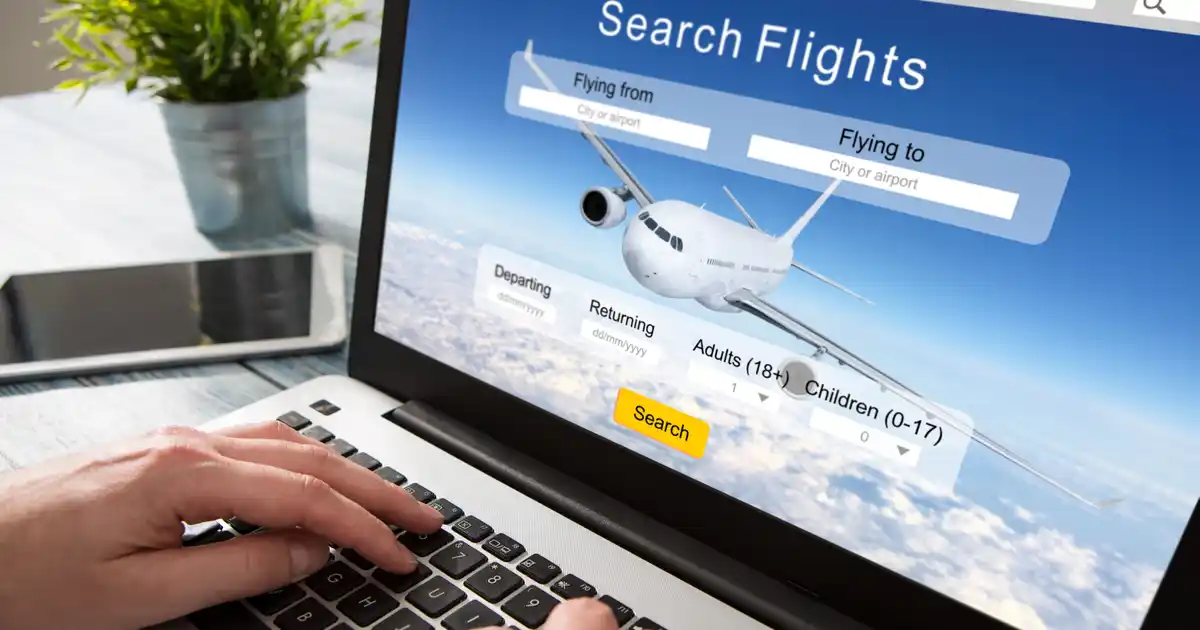
Use Travel Search Engines To Find Deals
Websites and search engines help you find deals on everything from flights and hotels to car rentals and entertainment. Try these resources:
- Flights : Skyscanner , FlightHub and Momondo
- Hotels : Tripadvisor, Trivago and Kayak
- Activities and entertainment : Musement, Klook and Tourteller
While setting your budget first and then searching for your priority locations is generally a good strategy, travel search engine sites can sometimes offer surprising deals. Be flexible about your travel plans, and keep an eye out for deals on destinations and activities you’d never even considered.
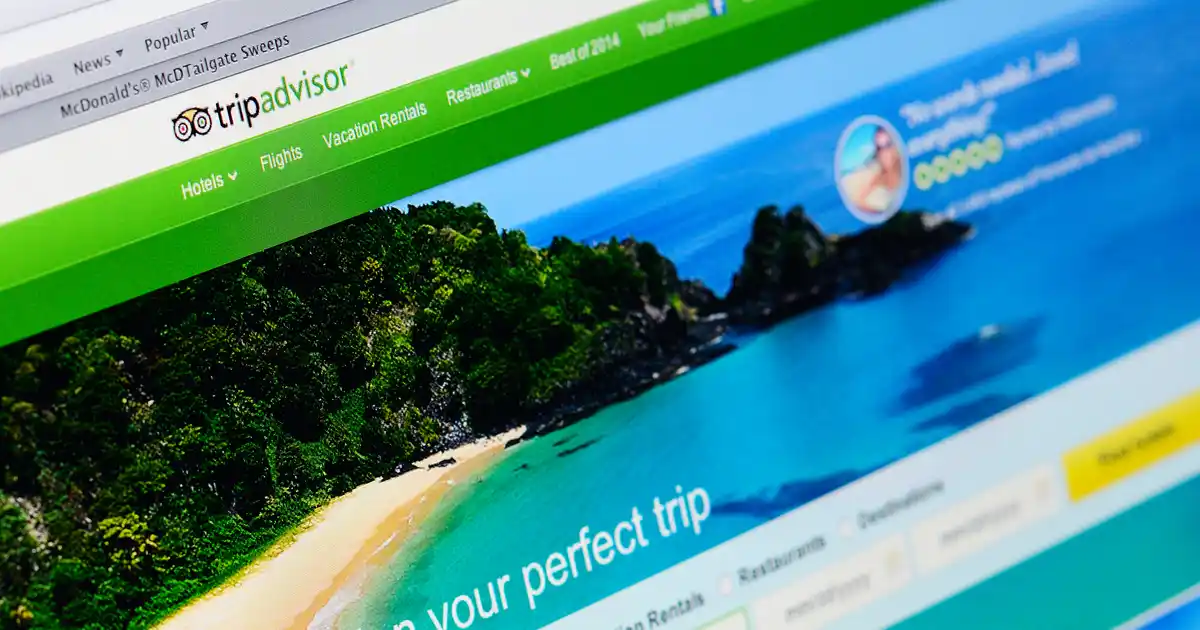
Consider Other Forms of Accommodation
Hotels are the traditional choice for travel accommodations, but they aren’t always the most cost-effective option. Hotel alternatives can save you significant travel costs and provide unique experiences.
Consider other accommodations such as:
- Rental properties: Airbnb, Vrbo and other websites help travelers find homeowners who rent out their properties. These rentals can range from a shared room to entire houses, and homeowners often offer discounts for longer stays.
- Hostels: Although you’ll likely share amenities with other travelers at hostels all around the world, hostels are inexpensive and can connect you to travelers and locals alike.
- Couch surf: Couch-surfing isn’t always a predictable way to travel, but can nearly eliminate your accommodation costs. Check out Couchsurfing to find homeowners willing to lend a spare bed or couch.

Some people prefer to book now with a credit card and pay later, but that means carrying a balance on your credit card, incurring unnecessary interest charges and adding to your overall travel expenses.
Creating a budget early on gives you a solid financial goal to work toward. Rather than charging everything to credit, save up the money for travel ahead of time.
You may need to cut out some extra costs or take on additional work to reach your savings goal. If you’re struggling with motivation or discipline, try reminding yourself of how much you’ll enjoy your travel and vacation later on
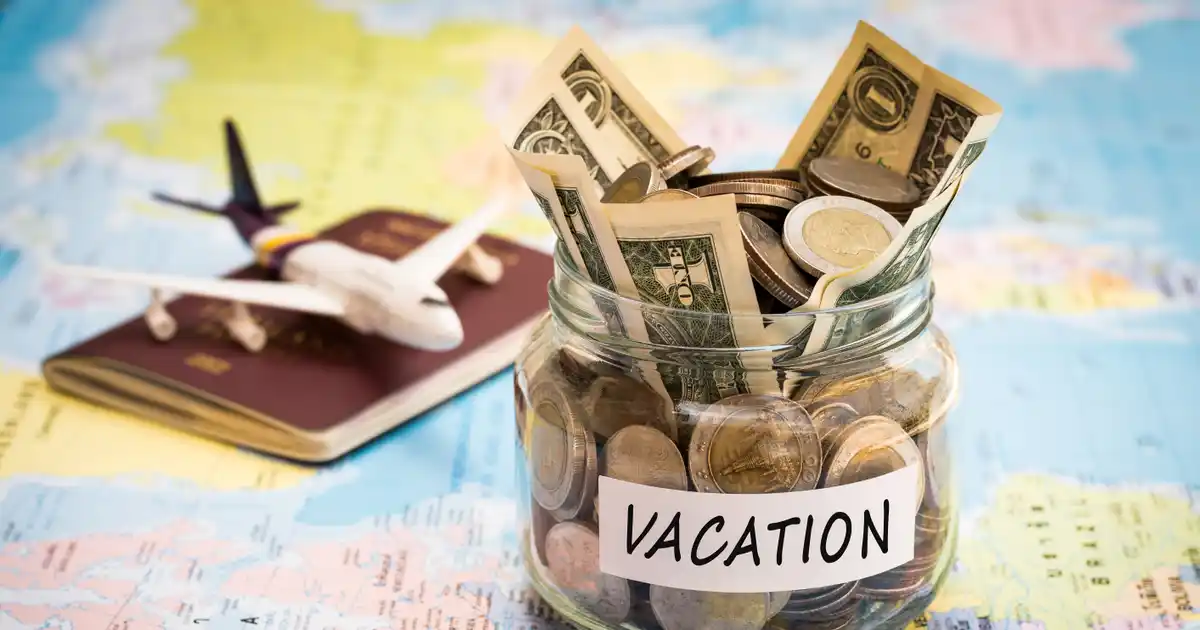
Look for Inexpensive Entertainment
If your big-ticket items don’t leave many funds leftover for other activities, consider cheap or free entertainment options at your destination. Hospitality workers, vacation rental hosts and other locals can provide insight into events you may not otherwise be able to find, such as live music or social activities.
If you’re traveling with a group, you can sometimes earn group booking discounts of around 15% for activities, such as tours, museum visits and classes, as well as your flights and accommodations. To access these discounts, contact the reservations centers for airlines, hotels and attractions.

Share this article
Alannah Koene
Contributor
Alannah Koene is a content writer based in Victoria, British Columbia. Although she writes for a range of topics, her professional writing often focuses on business, health, and lifestyle. Spending much of her time exploring the outdoors through sport, Alannah aims to share her perspectives through writing and content. She’s happiest reading a book in her hammock with her dog napping nearby.

Frugal Living: It’s A State of Mind (Not Just What You Buy)
Being frugal isn’t so much about what you buy. Really, it’s more of a state of mind. A different way of living. Too often, we get caught up in penny pinching in a way that isn’t healthy for our finances – or our sanity. If you’ve been trying (and failing) to get your budget balanced […]
8 minute read

Is Overspending Impacting Your Relationship?
Money is a topic that comes up regularly in almost any relationship. No matter your situation, there is a good chance that you have been talking about money with your life partner. Unfortunately, money is often a sore spot. Many studies have indicated that money is the number one issue that people in a relationship […]
7 minute read

How To Plan Your 2021 Christmas Budget
As much as I love gift-giving and the holiday season in general, I often find that it sneaks up on me. If you’re anything like me, you often find yourself in mid-December scrambling to get presents bought, wrapped, and even mailed. That last minute scramble often means paying more for gifts than you intended, since […]

Do You Think You’ll Ever Get Out Of Debt?
It can be difficult to feel good about your financial situation and even the rest of your life when you are in debt. Unfortunately, debt itself can be difficult to completely eliminate from your life. If you have debt, you might have a hard time paying it off if your finances are strained. And if […]

Why Your Budget Keeps Failing (And How To Fix It)
We all know that one of the cornerstones of financial success is getting the details right. Even with good intentions and managing the general money basics like we should, the reality is that we can still fail, financially speaking. One of the main reasons is simply human psychology, when our brains convince us to defy […]

Stop Living Paycheck to Paycheck With These Helpful Tips
Living paycheck to paycheck is not an unusual situation. Many Americans live in that reality every single day of their lives. Modern life is expensive. For most families, it’s easy for a string of bad luck to force their finances into the red. If you’re one of the many Americans who worry about paying their […]

Effective Ways To Practice Self-Care on a Budget
Self-care is defined by the World Health Organization as “the ability of individuals, families and communities to promote health with or without the support of a healthcare provider.” More broadly, self-care is described as an individual nurturing their spiritual, emotional, and physical health. It’s an important part of keeping your mental health in a healthy […]

Important Financial Advice Every New Parent Should Follow
Becoming a parent will totally change your life in so many ways. If there wasn’t enough enough for brand new parents to worry about, the financial decisions alone can be daunting. Making the transition from a couple to a family can have lasting repercussions on your budgets. Taking the time to put your financial ducks […]
9 minute read
The WG Community
- Get expert vetted financial advice catered to your financial goals
- Learn about ways you can grow your savings
- Explore ways to save money and enjoy the fruits of your labor
Join Our Newsletter
Monthly advice that matters to your retirement dreams.
By clicking "Sign Up" you are agreeing to our privacy policy and confirming that you are 13 years old or over.

You'll never travel without our trip planner again
Travel planning at its best. build, organize, and map your custom itineraries in a free travel app designed for vacations & road trips, powered by our trip planner ai.

Your itinerary and your map in one view
No more switching between different apps, tabs, and tools to keep track of your travel plans.
What travelers are raving about
Features to replace all your other tools, add places from guides with 1 click, collaborate with friends in real time, import flight and hotel reservations, expense tracking and splitting, checklists for anything, get personalized suggestions, plan like a pro.
Unlock premium features like offline access, unlimited attachments, flight deals, export to Google maps, and much more
Offline access
Unlimited attachments, optimize your route.
4.9 on App Store, 4.7 on Google Play
Discover your next favorite destination
Have tips of your own? Write a guide to share with other travelers like you!
Ready to plan your trip in half the time?
For every kind of trip and every destination, the best road trip planner, the best vacation planner, the best group itinerary planner.
Travel Budget Calculator Tool
Planning your next vacation? Use this free budget travel calculator tool to plan and estimate your next trip.
Please enter your expenses on a per-person basis. (U.S. dollars )
How many days will you be staying?
What is the hotel's nightly rate, what's your daily budget for food and drinks, is there a fee for travel visas, what is your budget for fun activities, what's the daily car rental rate at your destination, expected airfare costs (per-person):, do you plan to purchase travel insurance.
(The average cost for travel insurance is about $125USD)
Fees for additional baggage (per-person):
Estimate total trip cost, enjoy this calculator share it or tweet it.
Attention all vacation planners! Are you tired of the stress and confusion that often comes with budgeting for your next trip? Look no further than our free budget travel calculator tool! Designed to streamline the vacation planning process, this tool can help you estimate your expenses and stay on budget, making your next adventure stress-free and affordable. Give it a try and see how easy vacation planning can be!
How to calculate your travel budget using this trip calculator tool
- Enter the cost of obtaining a travel visa for the destination country. (In US dollars)
- Choose whether or not to get travel insurance for your trip. (Highly recommended.)
- Enter the number of days you’ll be in town. You can move the pointer forward or backward by dragging it, or you can input the number of days in the box next to it.
- Input your estimated budget that you have set aside for some fun activities during your trip. (Think local private tours?)
- Enter the cost of your hotel, Airbnb, or hostel stay per night.
- If you’re renting a car, enter the daily rate.
- Enter the amount of money you plan to spend on food and beverages during your trip.
- Enter the per-person cost of plane tickets to and from your location.
- The entire cost of your trip will be displayed on the right side.
Having the right budget will make sure that your next adventure is one to remember. This free vacation calculator can help you plan the perfect vacation. Wishing you a wonderful trip!
Get the official "Follow Your Wild" Travel Enamel Pin!
You can personalize your purse, blouse, or backpack with this vibrant enamel pin. An eye-catching enamel pin that gives you a desire to travel.

Become a part of the adventure travel community!
We are a global community of adventurers, explorers, and entrepreneurs. Our community is made up of adventurers, explorers, and entrepreneurs from all over the world. Be sure to use the hashtag #FollowYourWild when sharing your adventure travel stories.
Follow Adventrgram on Instagram !

Winter is here! Check out the winter wonderlands at these 5 amazing winter destinations in Montana
- Plan Your Trip
- Budget Travel
How To Budget For A Trip
Published: December 1, 2023
Modified: December 28, 2023
by Verile Lott
- Family Travel
- Travel Essentials & Accessories
- Travel Tips
Introduction
Traveling is an exciting adventure that allows you to explore new places, experience different cultures, and create lasting memories. However, one common concern that many travelers have is how to budget for their trip. With careful planning and research, budget traveling is not only achievable, but it can also enhance your overall travel experience. In this article, you will learn valuable tips and strategies to help you budget effectively and make the most of your trip.
Setting a budget for your trip is essential to ensure that you have enough funds to cover all your expenses while still allowing room for unexpected costs or indulgences. By establishing a realistic budget, you can avoid overspending, financial stress, and return home with wonderful memories instead of a hefty credit card bill.
This comprehensive guide will take you through a step-by-step process of how to budget for a trip. From determining your destination to estimating accommodation, transportation, food, and leisure costs, these strategies will help you plan and manage your expenses efficiently. Additionally, you will also learn how to account for miscellaneous expenses, travel insurance, and emergencies.
By following these budgeting tips and tricks, you’ll be able to enjoy your trip without worrying about breaking the bank. So, let’s dive in and discover the secrets to budget travel!
Step 1: Determine Your Trip Destination
The first step in budgeting for a trip is to determine your destination. Deciding where you want to go is a crucial factor that will impact your overall travel budget. Some destinations, such as popular tourist hotspots or metropolitan cities, tend to be more expensive, while others, like off-the-beaten-path locations or developing countries, can offer more budget-friendly options.
Consider your personal preferences, interests, and budget constraints when choosing your destination. Are you looking for a relaxing beach getaway, an adventurous hiking trip, or a cultural exploration of historical sites? Think about the activities you want to experience and the type of environment you enjoy. Research different destinations and their associated costs, including accommodation, food, transportation, and attractions, to get an idea of the overall budget required.
Additionally, keep in mind that the time of year you plan to travel can also impact the cost of your trip. Peak tourist seasons often come with higher prices for flights, accommodation, and attractions. Traveling during the shoulder season or offseason can offer more affordable rates and allow you to stretch your budget further.
Once you have decided on a destination, create a separate budget specifically for that location. Take note of the average daily expenses, such as accommodation, meals, transportation, and activities, and adjust your overall travel budget accordingly. Having a clear idea of the estimated costs for your chosen destination will make it easier to plan and allocate funds for the rest of your trip.
Remember, the key is to be realistic about your budget and set expectations accordingly. It’s always better to slightly overestimate rather than underestimate your expenses to avoid any financial surprises along the way.
Step 2: Research the Cost of Accommodation
Accommodation is a significant expense when it comes to budgeting for a trip. The cost can vary greatly depending on the type of accommodation you choose, the location, and the time of year. To ensure you stay within your budget, it’s crucial to research and compare the cost of accommodation options.
Start by determining the type of accommodation that suits your budget and preferences. Options can range from budget hostels and guesthouses to mid-range hotels and luxury resorts. Hostels are often the most budget-friendly choice, offering shared dormitories or private rooms at affordable rates. If you prefer more privacy or comfort, consider booking a budget hotel or guesthouse. Alternatively, you can try vacation rentals or homestays through platforms like Airbnb, which can provide a unique and cost-effective lodging experience.
Once you have an idea of the type of accommodation you prefer, research prices for your chosen destination. Online travel websites, hotel booking platforms, and independent hostel websites are valuable resources for comparing prices. Take note of the average nightly rates and consider the location’s proximity to the main attractions or transportation hubs.
While it’s tempting to book accommodation in the heart of popular tourist areas, keep in mind that prices in these areas are often higher. Consider staying slightly outside of the city center or in a less touristy neighborhood to save money. However, also take into account the accessibility to public transportation or the additional transportation costs that staying further away may incur.
Another cost-saving option is to consider alternative accommodations like camping or staying in a hostel with a kitchen. Camping can be a great way to save money on accommodation costs, especially if you’re traveling to destinations with beautiful natural landscapes. Some hostels also provide access to communal kitchens, allowing you to prepare your meals instead of eating out for every meal.
In addition to researching prices, make sure to read reviews and check the amenities offered. Look for cleanliness, safety, and positive guest experiences to ensure a comfortable stay.
By thoroughly researching the cost of accommodation and considering alternative options, you can find the best value for your money and stay within your budget while enjoying a comfortable and suitable place to rest during your trip.
Step 3: Calculate Transportation Expenses
Transportation expenses can make up a significant portion of your travel budget, so it’s essential to carefully calculate and plan for these costs. Whether you’re traveling domestically or internationally, transportation expenses can include flights, train or bus tickets, rental cars, taxis, and public transportation.
If you plan to fly to your destination, start by searching for the best deals on flights. Use flight comparison websites or sign up for fare alerts to be notified of any discounts or promotions. Be flexible with your travel dates and consider flying on weekdays or during off-peak hours, as this can often result in lower fares. Additionally, consider alternative airports or nearby cities that may offer cheaper flight options.
When it comes to ground transportation, research the most cost-effective options for your destination. Public transportation, such as buses, trains, or trams, is usually cheaper than taking taxis or private cars. Look into travel passes or cards that offer discounts for multiple trips or unlimited travel within a specific period. Some cities also have bike-sharing programs or pedestrian-friendly infrastructure, allowing you to explore on foot without the need for transportation expenses.
If you plan to rent a car, compare prices from different rental companies and book in advance to secure the best rates. Consider factors like fuel costs, parking fees, and insurance coverage when calculating the overall transportation expenses.
Another cost-saving option is to utilize ride-sharing services or carpooling platforms if they are available in your destination. This can help reduce the costs of transportation, especially if you’re traveling with a group.
Remember to factor in any additional transportation costs within your destination. Research the cost of local transfers from the airport to your accommodation, as well as the fares for visiting popular attractions or neighboring cities. It’s important to account for all possible transportation expenses to avoid any budget surprises.
By carefully calculating and planning for transportation expenses, you can save money and allocate your budget more effectively for other aspects of your trip. Keep in mind that flexibility and thorough research are key in finding the most cost-efficient transportation options.
Step 4: Estimate Food and Drink Costs
Estimating food and drink costs is an essential part of budgeting for your trip. While it can be tempting to indulge in delicious local cuisine and dine at fancy restaurants, it’s crucial to keep track of these expenses to avoid overspending. Here are some tips to help you estimate and manage your food and drink costs.
Start by researching the average cost of meals in your destination. Look for local food markets, street stalls, or budget-friendly restaurants that offer authentic cuisine at affordable prices. Avoid dining in touristy areas, as prices there tend to be higher. Instead, venture to where the locals eat to find the best value for your money.
If your accommodation allows it, consider booking a place with a kitchenette or access to a communal kitchen. This will enable you to prepare some of your meals, reducing the amount you spend on eating out. Grocery shopping at local supermarkets or grocery stores can be a cost-effective way to stock up on snacks and essentials.
Another budget-friendly option is to pack snacks or a picnic lunch for your daily adventures. This can help you avoid buying expensive meals at tourist attractions or during long travel days. Pack some fruits, sandwiches, or granola bars to keep you fueled throughout the day.
Additionally, be mindful of your drink expenses, especially alcoholic beverages. Alcoholic drinks at restaurants and bars can significantly add to your overall expenses. Consider enjoying a drink or two at local bars during happy hours or opting for local beers or wines, which are often cheaper than imported options.
To get an accurate estimate of your food and drink costs, you can allocate a daily budget or plan out specific meals based on local prices. This way, you’ll have a clear idea of how much you can afford to spend on food and drinks each day, helping you stay within your budget.
Remember that trying local cuisine is an integral part of travel, so don’t be too strict with your food budget. Allow yourself to splurge on a few memorable dining experiences, but balance it out with budget-friendly alternatives.
By estimating your food and drink costs and planning your meals, you can have a realistic budget and still savor the flavors of your destination without overspending.
Step 5: Consider Entertainment and Activities
When budgeting for your trip, it’s important to factor in the cost of entertainment and activities. Exploring new places, experiencing local culture, and participating in exciting activities are all part of the travel experience. Follow these tips to estimate and manage the expenses associated with entertainment and activities.
Start by researching the popular attractions and activities available at your destination. Look for free or low-cost options such as museums with discounted admission days, public parks, or walking tours. Many cities offer free or affordable guided tours that allow you to explore key landmarks and learn about the local history and culture.
Consider purchasing city passes or attraction bundles that offer discounted entry to multiple attractions. These passes can help you save money, especially if you plan to visit several paid attractions during your trip. Evaluate if the cost of the pass is worth it based on the number of attractions you plan to visit.
Engage in outdoor activities that don’t require much expenditure. Hiking, swimming, or biking in natural landscapes or local parks can be enjoyable and budget-friendly. Take advantage of the natural beauty and recreational activities your destination has to offer.
Support local artists and performers by attending free or low-cost cultural events, such as live music performances, street festivals, or art exhibitions. These events can be a great way to immerse yourself in the local culture without breaking the bank.
However, be mindful that some activities or experiences may come with a higher price tag. If there are specific activities or attractions that you really want to try, allocate a portion of your budget to these experiences. Prioritize them based on your interests and create a budget that allows for some splurges.
Remember to take advantage of any discounts or coupons that may be available. Online travel websites, local tourism boards, and social media platforms often offer promotional codes or special deals. Be on the lookout for these offers to save money on entertainment and activities.
Having a rough estimate of the cost of entertainment and activities will allow you to set aside funds and plan your itinerary accordingly. Flexibility is key, as it will enable you to explore a variety of options that cater to your interests and budget.
By considering the cost of entertainment and activities in your budget, you can ensure that you have a fulfilling and enjoyable travel experience without overspending.
Step 6: Budget for Miscellaneous Expenses
When budgeting for your trip, it’s important to account for miscellaneous expenses that may arise during your travels. These expenses may not be as predictable as accommodation or transportation costs, but they are still important to consider to avoid any financial surprises. Here are some miscellaneous expenses to keep in mind while budgeting for your trip.
Firstly, consider visa or entry fees that may be required for your destination. Some countries have visa fees upon arrival or require you to obtain a visa in advance. Research the visa requirements for your destination and include the costs in your budget.
Next, think about travel insurance. While it may seem like an extra expense, travel insurance is essential for protecting yourself against unforeseen circumstances such as medical emergencies, trip cancellations, or lost luggage. Research different insurance providers and policies to find one that suits your needs and budget.
Don’t forget about currency exchange fees and ATM withdrawal charges. These fees can quickly add up, so it’s a good idea to research the most cost-effective ways to access local currency. Consider exchanging money before you leave or using credit cards with low foreign transaction fees.
Plan for communication expenses, such as international roaming charges or purchasing a local SIM card for your phone. Staying connected while traveling can be important, but it’s essential to budget for these additional costs to avoid surprises on your phone bill.
It’s also a good idea to set aside some money for unexpected expenses or emergencies. This can include unforeseen medical expenses, lost or stolen items, or last-minute changes in your travel plans. Having a cushion in your budget for these unexpected costs will provide peace of mind during your trip.
Other miscellaneous expenses to consider include souvenirs, tips for service providers, and any additional activities or attractions that you may decide to do while on your trip. It’s impossible to predict every expense, but allocating a portion of your budget for miscellaneous costs will help you stay prepared and avoid going over budget.
Keep in mind that this step is about being flexible and realistic. Setting aside funds for miscellaneous expenses allows you to be prepared for the unexpected and ensures that you can handle any additional costs that may arise during your trip.
By budgeting for miscellaneous expenses, you can have a comprehensive travel budget that covers all aspects of your trip and gives you the financial peace of mind to fully enjoy your travels.
Step 7: Plan for Travel Insurance and Emergencies
When budgeting for your trip, it’s crucial to plan for travel insurance and emergencies. While no one likes to think about potential unfortunate events during their travels, it’s essential to be prepared to protect yourself and your finances. Here are some important factors to consider when planning for travel insurance and emergencies.
Travel insurance is a vital investment to safeguard yourself against unforeseen circumstances. It can cover medical expenses, trip cancellations or interruptions, lost or stolen belongings, and more. Research different travel insurance providers and policies to find one that suits your needs and budget. Make sure the policy provides adequate coverage for medical emergencies, especially if you’re traveling to a destination with expensive healthcare costs.
Consider the activities you plan to engage in during your trip. If you’re planning any adventure sports or activities with higher risks, ensure that your insurance policy covers these activities. Read the terms and conditions carefully to understand the coverage and any exclusions or limitations.
Take note of any deductibles or excess fees that may apply. While a lower premium may seem attractive, it’s important to understand the out-of-pocket expenses you may need to cover in case of a claim. Assess your risk tolerance and budget to determine the appropriate level of coverage.
Emergency funds are equally crucial when planning for unexpected situations. Set aside some money in your budget specifically for emergencies. This can be used for medical expenses, last-minute changes to your travel plans, or unexpected accommodation or transportation costs.
It’s also a good idea to have a contingency plan in place. Keep copies of important documents such as your passport, travel insurance policy, and emergency contact information in a secure location or saved digitally. Familiarize yourself with the local emergency numbers and the nearest embassy or consulate of your home country. Having this information readily available can be invaluable in case of an emergency.
Remember that prevention is key in avoiding emergencies. Practice safe and responsible travel habits, such as researching and adhering to local laws and customs, staying aware of your surroundings, and taking necessary health precautions.
While the hope is that you won’t need to use your travel insurance or emergency funds, planning for these contingencies is essential for your peace of mind and financial security. By taking these precautions, you can travel with confidence, knowing that you’re prepared for any unforeseen events that may arise.
Step 8: Create a Daily Spending Allowance
Creating a daily spending allowance is a practical way to stay on track with your budget during your trip. It helps you manage your expenses effectively and ensures that you don’t overspend. Follow these tips to establish a daily spending allowance.
Start by determining your overall trip budget and the length of your stay. Divide your total budget by the number of days you’ll be traveling to arrive at your average daily spending allowance. This amount will serve as a guideline for how much you can spend on a daily basis.
Consider your destination and the cost of living there. Some places may have a higher cost of living than others, which may require adjusting your daily spending allowance accordingly. Research local prices for meals, transportation, and attractions to get a better idea of how much you’ll need to budget.
Take into account any fixed costs that you’ve already allocated in your budget, such as accommodation and transportation expenses. Subtract these fixed costs from your daily spending allowance to determine how much you have left for discretionary expenses like food, activities, and shopping.
Be realistic and flexible with your daily spending allowance. It’s okay to adjust your budget as needed, especially if you come across unexpected expenses or decide to splurge on certain experiences. Track your daily expenses and make adjustments if you notice that you’re consistently overspending or underspending. This will help you manage your budget effectively throughout your trip.
Avoid the temptation to spend all of your daily allowance every day. Aim to spend under your allowance whenever possible. By doing so, you’ll have some extra funds for unexpected expenses or to carry over to another day for a special activity or treat.
Keep in mind that your daily spending allowance is just a guideline. It’s not meant to restrict you from enjoying your trip, but rather to provide a framework for managing your expenses. Finding a balance between staying within your budget and indulging in memorable experiences is the key.
Lastly, remember to track your daily expenses using a travel budgeting app, a spreadsheet, or a notebook. This will help you stay accountable and give you a clear picture of where your money is going.
By creating a daily spending allowance, you can better manage your expenses and have more control over your budget during your trip. It allows you to make informed choices and ensures that you’re staying within your desired financial limits.
Step 9: Track Your Expenses During the Trip
Tracking your expenses during your trip is a vital step in staying within your budget and maintaining financial responsibility. It allows you to keep a close eye on your spending, identify any overspending patterns, and make adjustments as needed. Follow these tips to effectively track your expenses during your trip.
Start by choosing a method for tracking your expenses that works best for you. You can use a travel budgeting app, a spreadsheet, or a simple notebook to jot down your expenses. The key is to find a method that is convenient and easy for you to use consistently throughout your trip.
Record each expense as soon as possible after making a purchase. This will help you avoid forgetting or misplacing receipts. Include details such as the date, the amount spent, and the category of the expense (e.g., accommodation, transportation, meals, attractions).
Separate your expenses into different categories to get a clear understanding of where your money is going. This will allow you to identify any areas where you may be overspending and make adjustments accordingly. For example, if you notice that a significant portion of your budget is going towards dining out, you can consider cooking more meals or finding cheaper dining options.
Be diligent and accurate when tracking your expenses. Even small purchases can add up and significantly impact your overall budget. Remember to account for any cash expenses as well, as it can be easy to overlook small cash transactions.
Consider using payment methods that provide detailed transaction information. Credit cards or digital wallet apps often provide detailed statements or digital receipts, making it easier to track your expenses accurately. Take advantage of these tools to simplify the expense tracking process.
Regularly review your tracked expenses to assess your spending patterns. Are there any areas where you’re consistently overspending? Are there any opportunities to save money without sacrificing the quality of your trip? Adjust your daily spending allowance or make changes to your itinerary if necessary.
It’s important to remain disciplined and committed to tracking your expenses throughout your trip. This practice will not only help you stay within your budget but also provide valuable insights on your spending habits and allow you to make better financial decisions in the future.
By tracking your expenses, you’ll have a clear picture of your spending habits and ensure that you’re staying on track with your budget. It will help you make informed decisions and allow you to fully enjoy your trip without the worry of overspending.
Budgeting for a trip is an essential step to ensure that you have a financially stress-free and enjoyable travel experience. By following the steps outlined in this guide, you can effectively plan and manage your expenses, allowing you to make the most of your budget and create lasting memories.
Start by determining your trip destination and researching the cost of accommodation, transportation, food, and activities. Consider alternative options and be realistic about your budget. Plan for unexpected expenses such as travel insurance and emergencies, and set aside a daily spending allowance to stay on track with your budget. Remember to track your expenses throughout your trip to maintain financial responsibility and make adjustments as needed.
While budgeting is important, it’s also essential to remain open to spontaneous opportunities and enjoy the experiences that come your way. Finding a balance between staying within your budget and embracing the unexpected will enhance your travel adventure.
By taking the time to budget effectively, you can travel with confidence, knowing that you have allocated funds for all aspects of your trip. It allows you to focus on the joy of exploration and connection, create unforgettable memories, and return home with a fulfilled sense of wanderlust. So, start budgeting and embark on your next travel adventure with financial peace of mind!

- Privacy Overview
- Strictly Necessary Cookies
This website uses cookies so that we can provide you with the best user experience possible. Cookie information is stored in your browser and performs functions such as recognising you when you return to our website and helping our team to understand which sections of the website you find most interesting and useful.
Strictly Necessary Cookie should be enabled at all times so that we can save your preferences for cookie settings.
If you disable this cookie, we will not be able to save your preferences. This means that every time you visit this website you will need to enable or disable cookies again.

From Frugal to Free
24 Tips for Planning a Budget-Friendly Road Trip
Posted: January 1, 2024 | Last updated: April 7, 2024
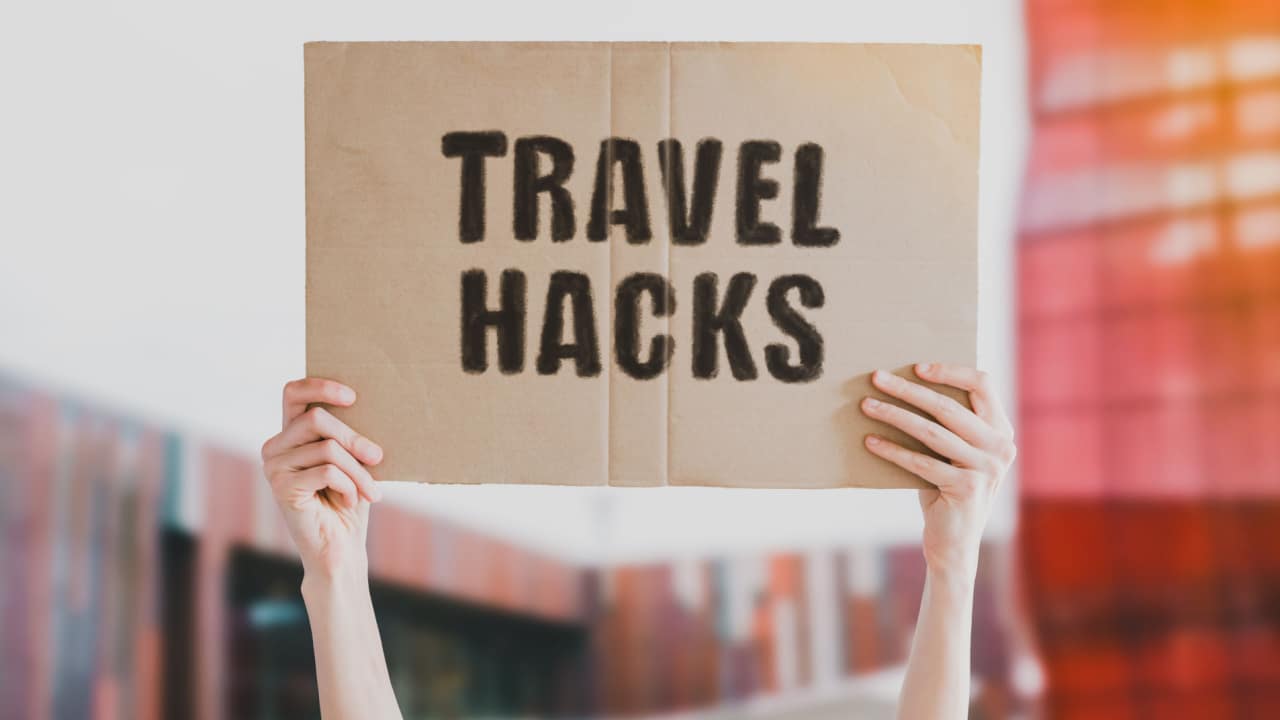
Family road trips are one of life’s greatest adventures – a chance to explore new destinations, make memories, and enjoy the freedom of the open road. But without careful planning, costs can quickly spiral. Just remember that a memorable road trip doesn’t have to break the bank. With some smart strategies and a bit of preparation, you can hit the road without straining your wallet.

1. Set a Budget
Before setting out on your road trip, set a realistic budget. Take into account all possible expenses, including fuel, food, accommodations, attractions, and any unforeseen emergencies. A well-planned budget helps you make informed decisions and avoid overspending. Be sure to factor in a little extra for unexpected costs to ensure a stress-free journey.
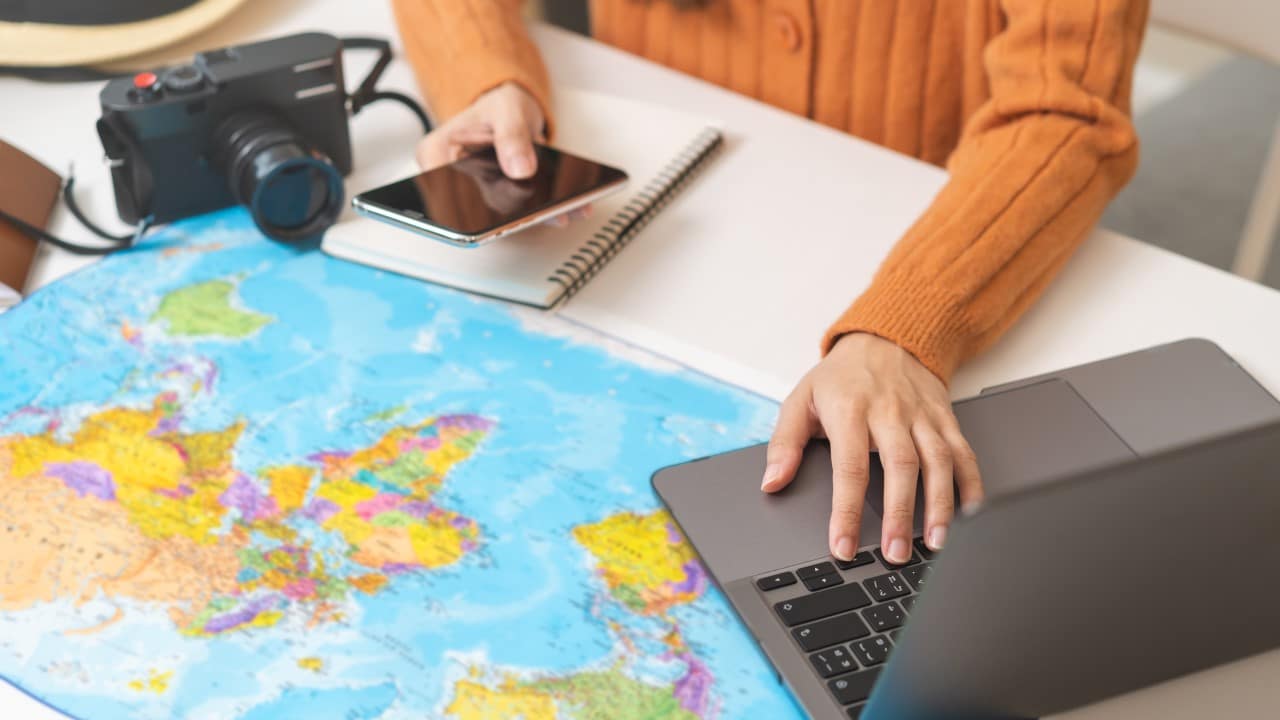
2. Plan Your Route in Advance
Planning your route is a key step in road trip prep. You can identify the most efficient routes by mapping out your journey in advance, saving time and fuel. Utilize travel apps or websites to find the shortest or most scenic paths and avoid construction or heavy traffic areas. An optimized route also allows you to plan stops at interesting places along the way.
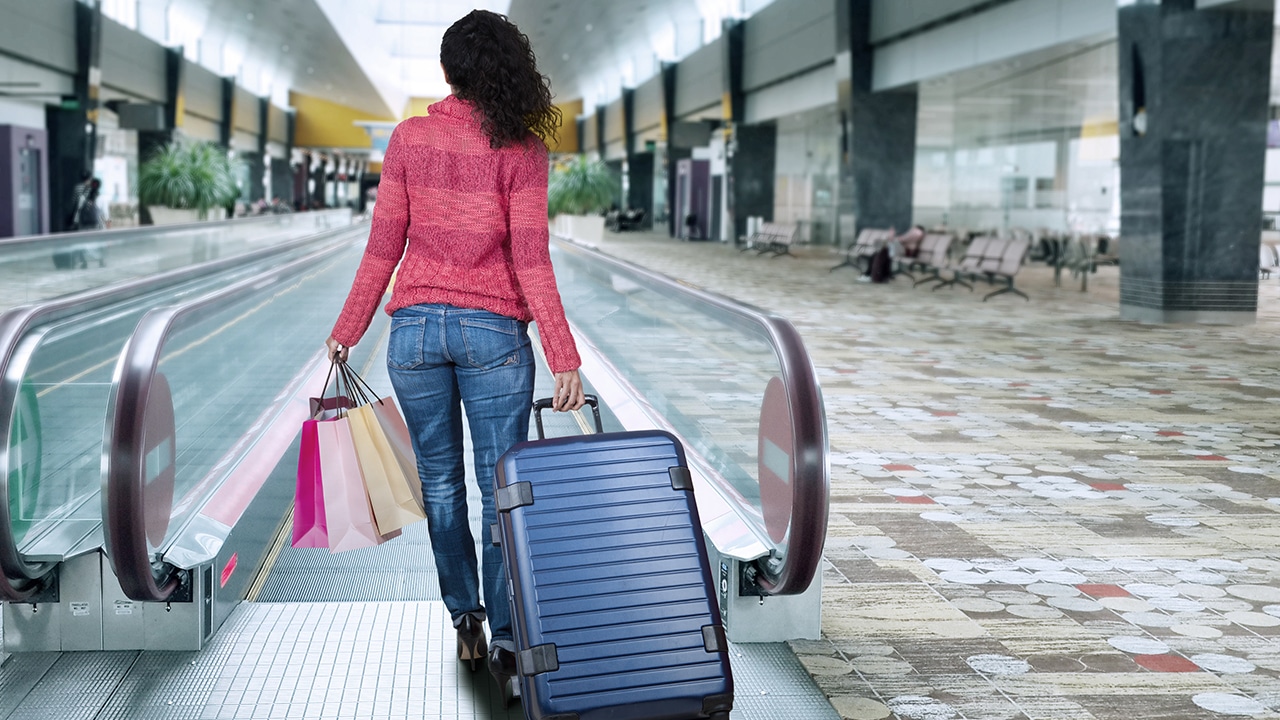
3. Travel During Off-Peak Times
Traveling during off-peak times like shoulder seasons or weekdays can lead to significant cost savings. Accommodations often offer lower rates outside of tourist seasons or on weekdays. Additionally, attractions may be less crowded, enhancing your experience. Traveling off-peak also typically means less traffic, making your drive smoother and potentially quicker.

4. Use Fuel-Efficient Driving Techniques
Implementing fuel-efficient driving habits can lead to noticeable savings on your road trip. Maintaining steady speeds, using cruise control on highways, and avoiding sudden accelerations and hard braking reduces fuel consumption. This saves money and minimizes your environmental impact. Keeping your vehicle well-maintained and ensuring tires are properly inflated also improves fuel efficiency.

5. Pack Smart
Packing smartly can prevent costly purchases during your road trip. Bring along essential items such as snacks, drinks, a first-aid kit, and various entertainment options. This preparation helps avoid frequent stops for overpriced items and reduces the temptation for impulse buys. Packing a cooler with refreshments and snacks is especially helpful for long stretches of driving.
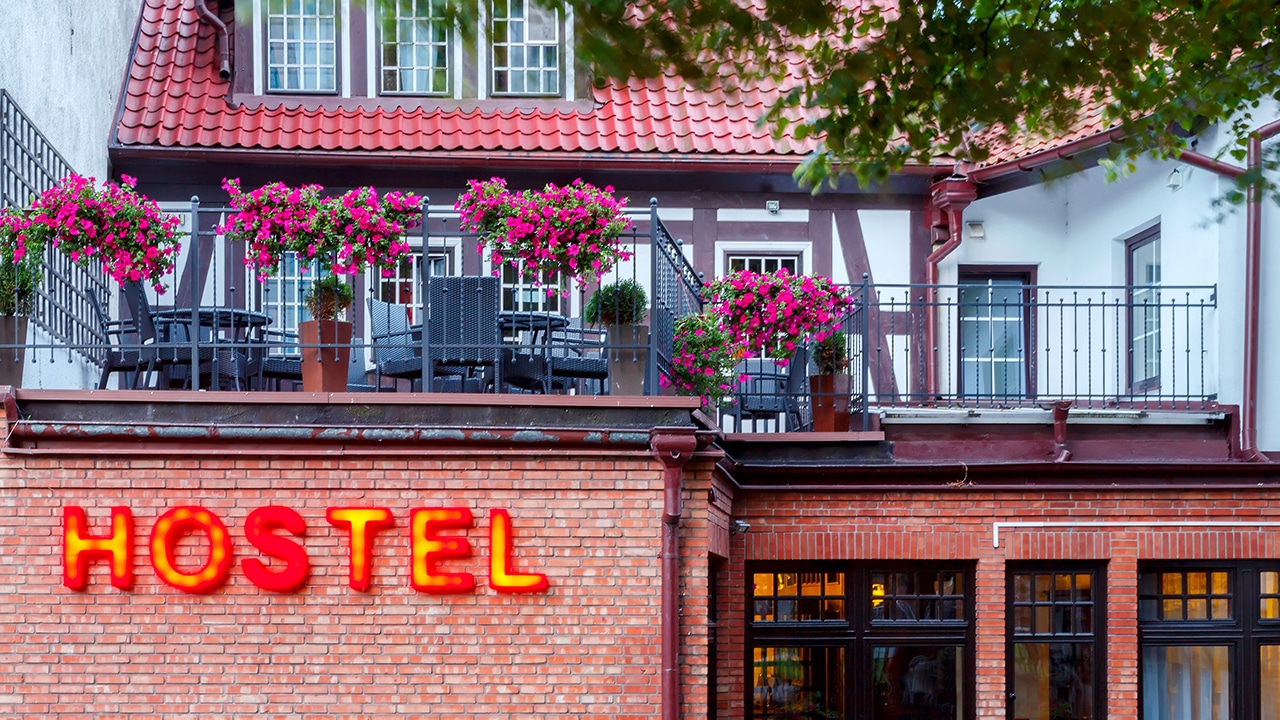
6. Stay in Budget Accommodations or Camp
Explore budget-friendly options like motels, hostels, or camping to save on lodging. Camping cuts costs and adds an element of adventure and closeness to nature to your road trip. If camping isn’t your style, look for affordable motels or hostels, and always book in advance to secure the best rates and availability.

7. Eat Like a Local
One of the joys of road-tripping is discovering local food. Avoid expensive tourist-oriented restaurants and seek out where the locals eat. It’ll give you a more authentic and less expensive dining experience. If your accommodations include kitchen facilities, consider preparing your own meals. Picnicking is another cost-effective and enjoyable way to eat while exploring new areas.

8. Use Gas Price Apps
Fuel costs can add up quickly on a road trip. Use apps like GasBuddy to find the cheapest gas prices along your route to save money. These apps provide real-time fuel price data, helping you plan your refueling stops more economically. Being strategic about where and when you fill up your tank can result in significant savings over the course of your journey.

9. Take Advantage of Free Attractions
Exploring free attractions is a fantastic way to enjoy your destinations while keeping costs down. Many cities and towns offer a variety of no-cost options like museums, parks, galleries, and historical sites. I’m always amazed at how many local attractions and historic sites are free or low-cost and how much fun and fab experiences you can have with your family without spending much at all. Research your destination to find these free and low-cost activities beforehand, and plan your itinerary to include these free attractions.

10. Avoid Toll Roads
While toll roads can save time, the costs can accumulate, especially over longer trips. To minimize expenses, plan your route using free alternatives. Utilize GPS and route planning apps that have options to avoid toll roads. This might add a bit more travel time, but the savings make it worth the detour, particularly on extended road trips. Be prepared for potentially more scenic drives through less-traveled paths.

11. Share the Journey
Road tripping with friends or family makes the journey more enjoyable and more economical. Sharing expenses like fuel, accommodation, and food significantly reduces the cost per person. It also offers an opportunity for memorable experiences with your travel companions. Plan the budget together and discuss splitting costs upfront to avoid any misunderstandings later.

12. Limit Souvenir Spending
Souvenirs are a popular way to remember your trip, but they quickly eat into your budget. Set a specific budget for souvenirs and stick to it. Consider affordable alternatives like postcards, local crafts, or photographs. Sometimes, the best souvenirs are the memories and experiences themselves, captured in photos or journals.

13. Bring Reusable Water Bottles
Purchasing bottled water repeatedly is really expensive and not eco-friendly. Bring reusable water bottles for each person and refill them at rest stops, visitor centers, or food establishments. It’s better for the environment and your wallet. My family all have their own custom reusable stainless steel bottles that work for hot or cold drinks.

14. Use Reward Programs and Discounts
Make use of any memberships or rewards programs you have for discounts on various travel expenses. Programs like AAA, hotel loyalty memberships, or credit card rewards can net you big savings on accommodation, attractions, dining, and even fuel. Always ask about available discounts when making bookings or purchases, as these savings can reduce your overall trip cost.
15. Keep Your Vehicle Well-Maintained
Before you set out on your epic family road trip, make sure your vehicle is in tip-top condition. Check tire pressure, fluid levels, brakes, and other essentials. A well-maintained vehicle is not only safer but also more fuel-efficient, reducing the likelihood of breakdowns and costly repairs on the road.
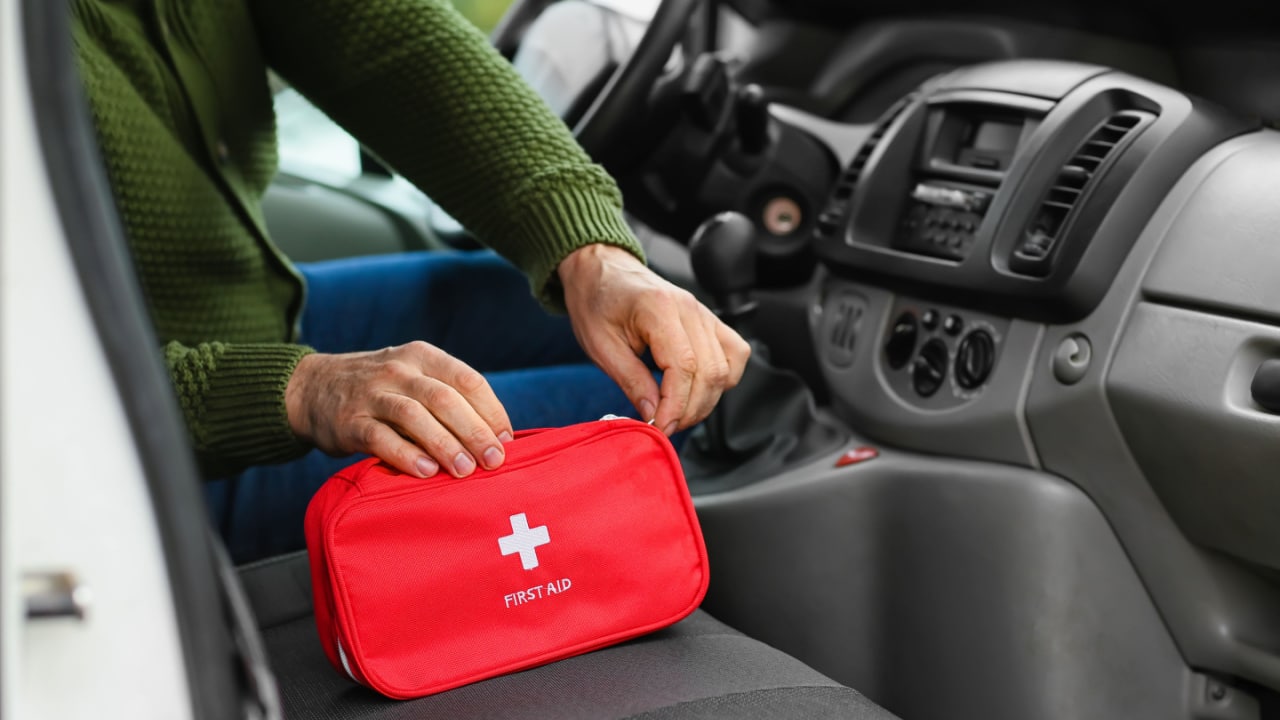
16. Pack a Roadside Emergency Kit
Having a roadside emergency kit in your vehicle is a smart move for handling unexpected situations. Your kit should include items like a spare tire, jumper cables, basic repair tools, a flashlight, and a first-aid kit. Being prepared can prevent minor issues from turning into major expenses and give you peace of mind while on the road.
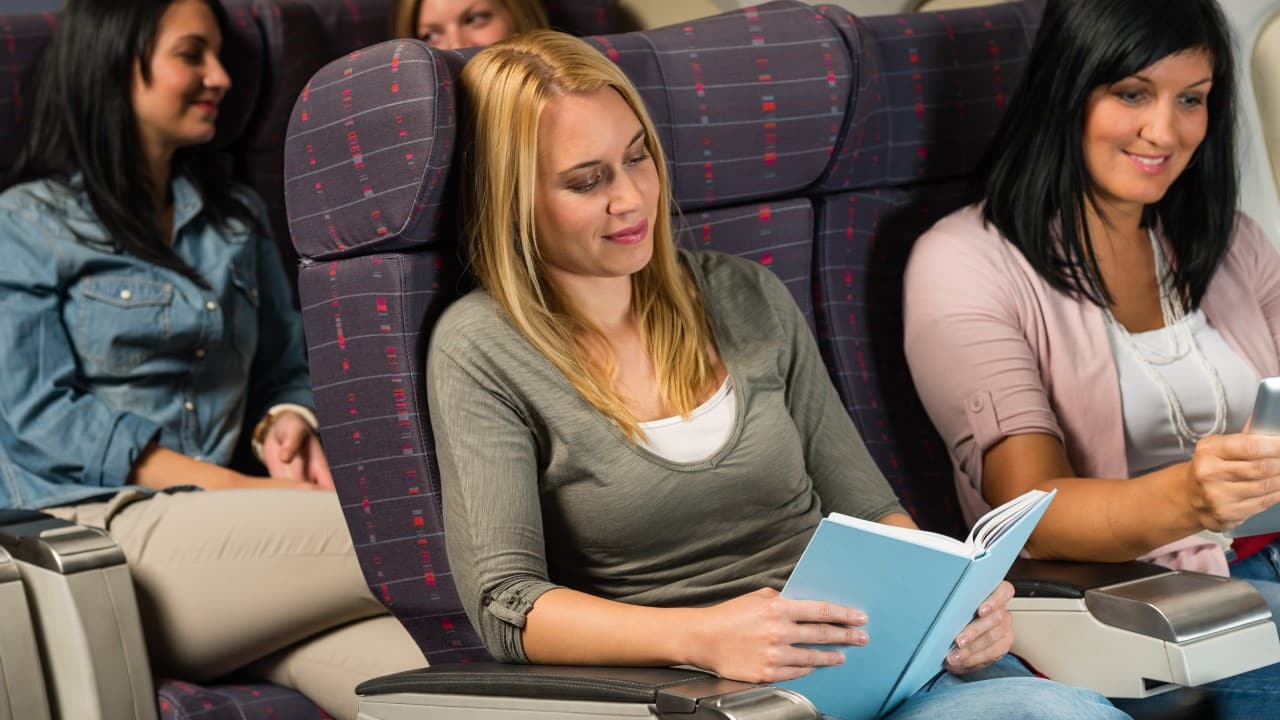
17. Use Public Transportation
In urban areas, consider using public transport instead of driving. Navigating city traffic is stressful and finding parking is challenging and costly. Public transit options like buses, trains, or subways are more affordable and save you the hassle of city driving.
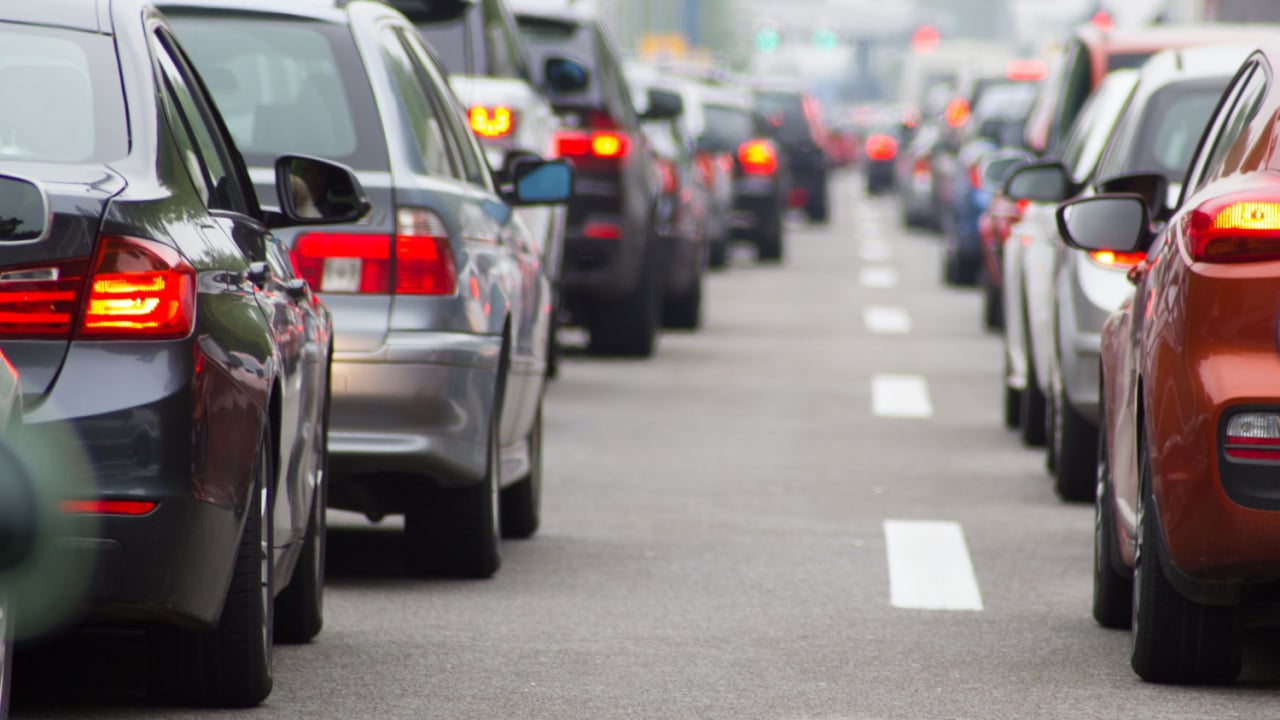
18. Avoid Rush Hour
Avoid traveling during rush hour if you don’t want unnecessary stress, to waste time in traffic, and lose money in increased fuel consumption. Plan your itinerary to avoid driving through major cities during peak traffic times. If you find yourself nearing a large city, consider stopping for a meal or an activity until traffic dies down.
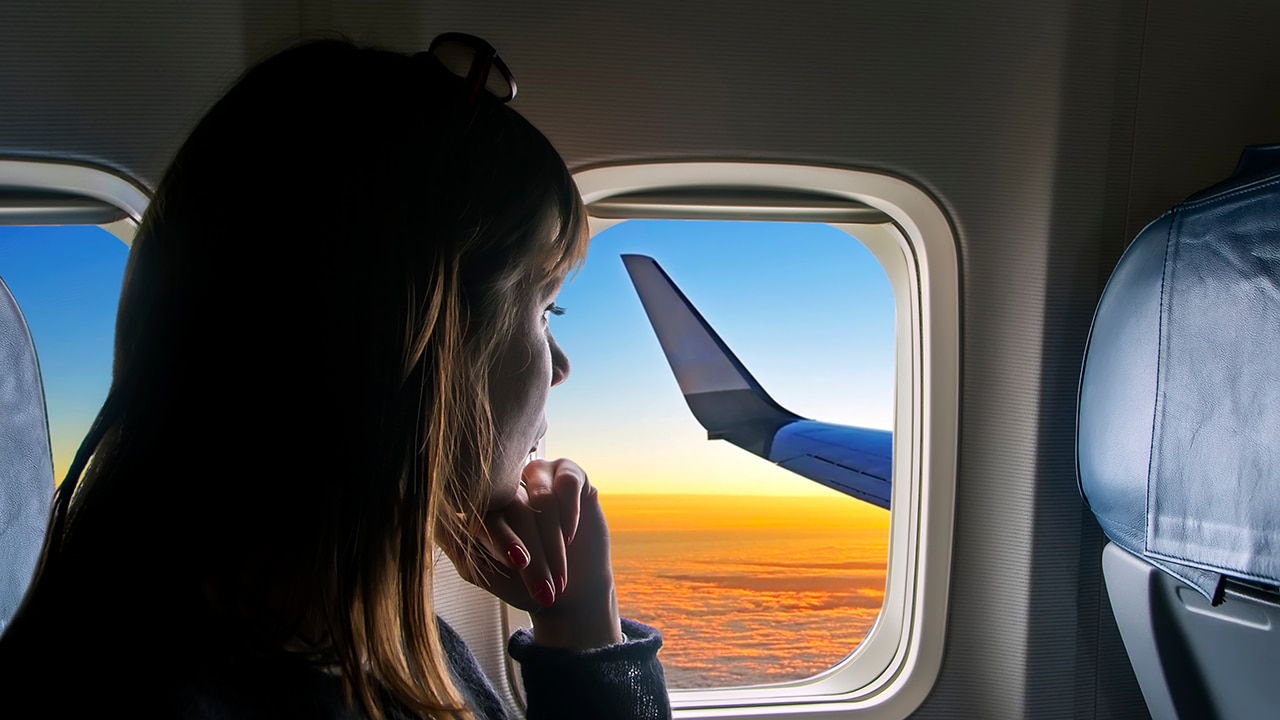
19. Choose Scenic Routes
Taking scenic routes can make your trip more enjoyable. Sure, these paths might be less direct, but you’ll get to enjoy a more picturesque and memorable driving experience compared to highways. Scenic drives often lead through quaint towns, beautiful landscapes, and interesting attractions, turning the journey itself into a memorable part of your trip.

20. Monitor Your Spending
Keeping a close eye on your spending is crucial to stay within your budget. Regularly track your expenses to ensure you’re not overspending on food, accommodations, or attractions. This habit allows you to make adjustments on the go and avoid any financial surprises. It also helps in planning future road trips more effectively.
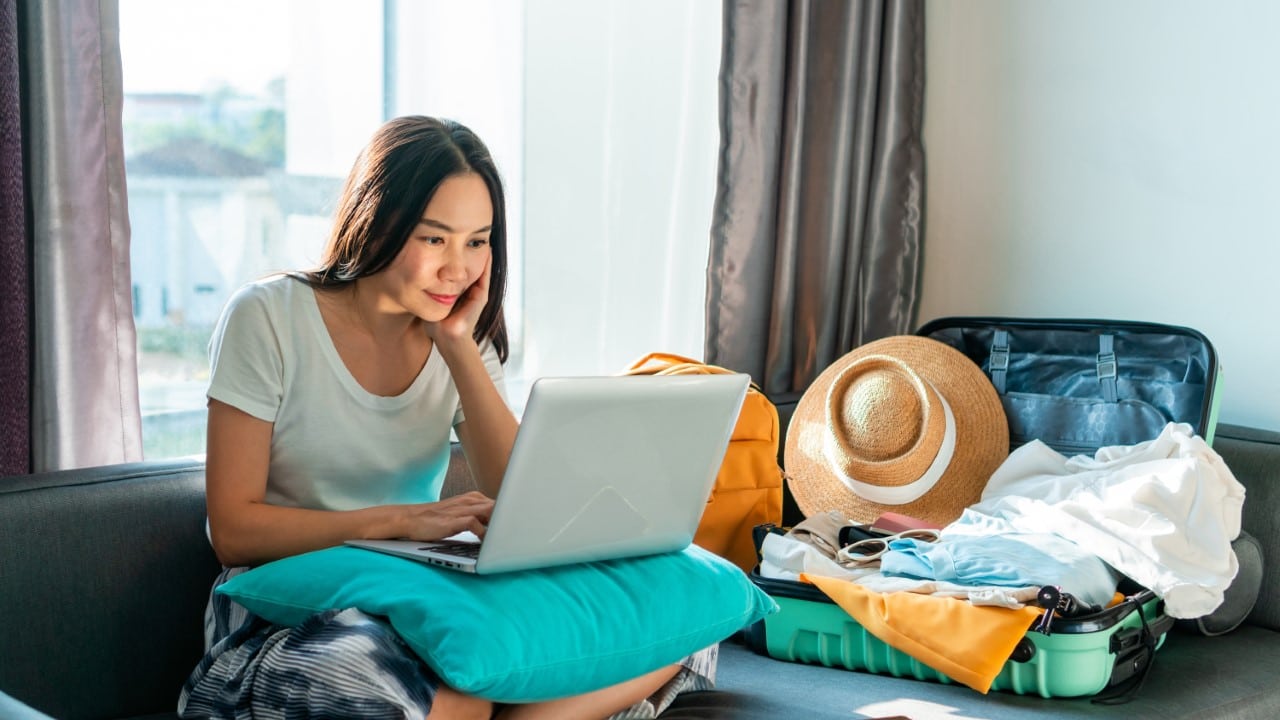
21. Be Flexible
One of the joys of a road trip is the flexibility it offers. Be open to exploring unplanned routes or stopping at unexpected attractions. Some of our most memorable experiences came from spontaneous decisions we made on the route. Staying flexible can also lead to cost savings, as you might discover more affordable options or hidden gems along the way.

22. Use a Cash Back Credit Card
If you have a cash-back or rewards credit card, use it for your road trip expenses. I love this strategy, as it helps me recoup a little of the cost in the form of cashback, or build reward points that I can funnel to my savings or put toward our next family adventure. Just be sure to pay off the balance to avoid interest charges, which can negate the benefits of rewards.

23. Research Local Deals and Coupons
Before arriving at your destination, do some research for local deals or coupons. Check out websites, local tourist information centers, or newspapers for discounts on dining, attractions, and accommodations. Taking advantage of these offers can significantly reduce your overall spending and allow you to enjoy more activities on your trip.
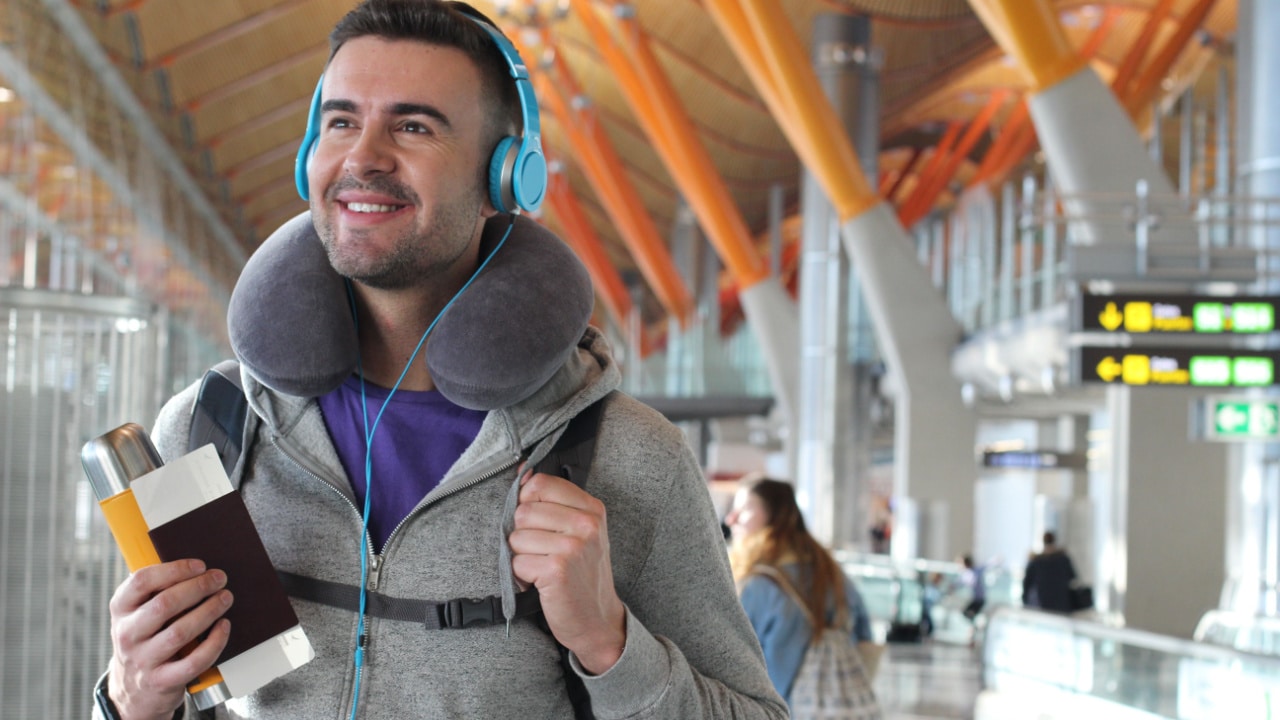
24. Enjoy the Journey
Lastly, remember to enjoy the journey itself. Road trips are as much about the travel as they are about the destination. Take in the landscapes, explore roadside attractions, and cherish the quality time with your travel companions. Many of the most memorable moments on a road trip are the unexpected experiences and sights along the way, which often come at no extra cost. We play silly travel games, tell tall tales, and generally try to amuse each other.
More for You
White House Response To Soaring Gas Prices Sparks Backlash
This Is How Long You Can Leave Butter On the Counter, According to Land O'Lakes
Common over-the-counter medicine linked to increased dementia risk
16 Compliments You Didn’t Realize Are Actually Pretty Insulting
Researchers find concerning contaminant within human eyes: 'Shedding light on their potential implications'
KFC Is Changing Its Menu—Here’s What to Expect
Largest crane on east coast removes massive chunks of fallen Baltimore bridge
Ketanji Brown Jackson's New Warning To Supreme Court
What It Means to Be Fraysexual—Everything You Need to Know
5 people explain what it actually feels like to die
15 Overpriced Cars That Aren’t Worth the Money
4 Things You Should Never Cook in Cast Iron
One of the best British spy dramas of all time is finally streaming on Netflix
FEMA is making an example of this Florida boomtown. Locals call it ‘revenge politics.’
American Airlines Regional Jet Declares Emergency During Final Descent Into Washington
I've lived in a van full-time for 3 years. Here are the 5 biggest downsides no one talks about.
Taylor Swift Smashes Another Record
Is It Safe To Grill Frozen Hamburger Patties Straight From The Freezer?
Barbara Corcoran made a $200,000 'Shark Tank' offer on one condition: Power to revamp the CEO's entire business
12 safest places if World War 3 breaks out
A first-timer's guide to Olympic National Park, Washington

Apr 16, 2024 • 8 min read
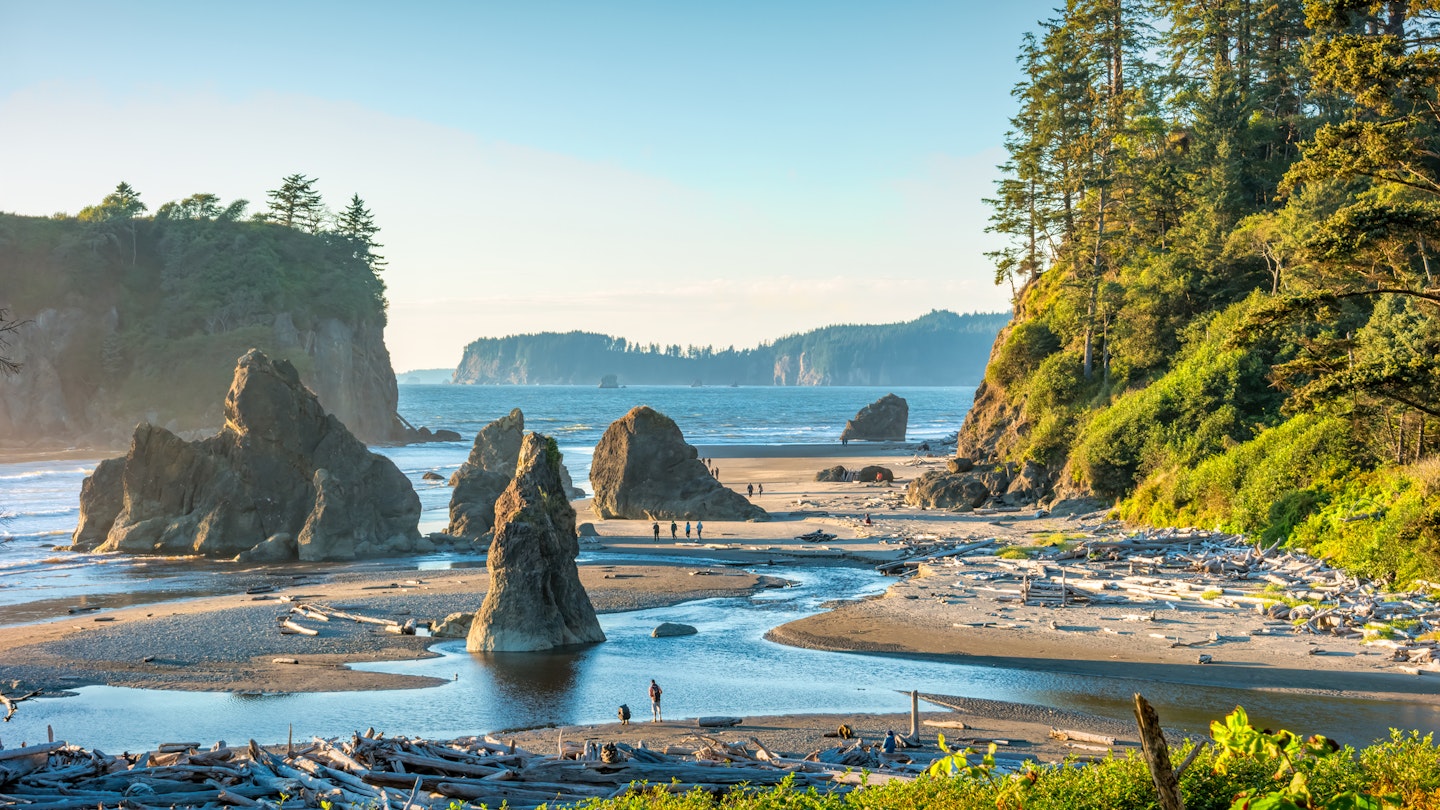
Welcome to Olympic National Park, one of the wettest places in the US! © benedek / Getty Images
Green is the overwhelming color on Washington 's Olympic Peninsula .
From dazzling emerald to muted pine, you’ll detect a hundred different shades of it in the wet, mossy confines of the Lower 48’s most north-westerly national park where 1000-year-old trees guard the finest tract of old growth rainforest in the US. The Olympics is also home to a small ski station, the majestic Roosevelt elk, regular deluges of precipitation and a dark, eerie sylvian environment that has inspired a mini library of vampire books.
Playing a noble supporting act are a muddle of heavily glaciated mountains, a trio of handsome “parkitecture” lodges and a couple of rustic hot springs. In a separate strip of land added in 1953, the Olympics also includes the wildest slice of US coastline outside Alaska.
Come here if you like rock-hopping on stormy beaches, paddling across windy lakes and hiking beneath drippy trees with just bears and rutting elk for company.

When should I go to Olympic National Park?
Welcome to one of the wettest places in the US! Rain, and its avoidance, is a primary consideration for most visitors. The Hoh Rainforest gets nearly 130in of precipitation a year. Summer, between May and September, is the driest time with July logging an average of only nine rainy days. This is also when most of the park’s facilities are open, from campgrounds to ranger-led hikes.
The winter season usually runs from late-November to late-March with snow activities centered around the small ski station at Hurricane Ridge.
If you hate crowds, January is the quietest (and wettest) month, while August (with over half a million visitors) is the busiest. Prices don’t fluctuate much in the park itself. In the surrounding communities, winter and the spring/fall shoulder seasons work out slightly cheaper.
Planning a trip to Washington State? Here's our seasonal guide
How much time should I spend in Olympic National Park?
You could easily spend four or five days working your way around Hwy 101, the Olympics’ unofficial ring-road with overnight stops in Port Angeles, Lake Crescent, Forks and Lake Quinault. If you’re planning on penetrating the park’s extensive backcountry on longer hikes along the coast or in the roadless interior, bank on putting aside a week – or even two.
Is it easy to get in and around Olympic National Park?
Getting to the park is relatively easy due to its proximity to Seattle . It’s just over 2 hours by car from the “Emerald City” to the eastern park entrance at Staircase and 2.5 hours to Port Angeles in the north. Seatac, 15 miles south of downtown Seattle, is the nearest airport.
It’s relatively easy to travel to Port Angeles direct from Victoria on Vancouver Island in Canada . The Black Ball car ferry runs four times a day in either direction in the summer (and twice in the winter). The journey time is 1.5 hours.
The park is encircled by well-maintained Hwy 101 (a state “Scenic Highway”) with several more paved roads penetrating the interior where they dead-end at Hurricane Ridge, Hoh Rainforest, Lake Quinault, Sol Duc hot springs and Staircase.
While public buses exist, they are slow and discontinuous. You’ll need to change buses between the different counties of Clallam, Jefferson, Mason and Gray’s Harbor.

Top things to do in Olympic National Park
Appreciate ancient trees in the hoh rainforest.
For one of the most quintessential park experiences, take a deep dive into the greenest, wettest, and oldest temperate rainforest in North America. Hoh with its giant trees draped in spongy moss is what makes the Olympics unique, a temperate “jungle” of geriatric foliage that’s humming with wildlife. The area has its own visitor center and several short interpretive trails, including the 1.25-mile Hall of Moss trail. Rangers arrange nature walks and talks in summer.
Observe the forces of nature on Ruby Beach
First designated in 1938, the Olympics was extended in 1953 to include a narrow coastal strip that stretches from Ozette in the north down to Kalaloch in the south. Of the coast’s stormy collection of beaches, Ruby Beach , characterized by its bruised clouds, eroded sea stacks, and piles of washed-up tree logs, is the easiest to reach from Hwy 101.
Climb a rugged path up Mt Storm King
Arguably the park’s most rewarding day-hike is the 4.1-mile round-trip climb to the top of Mt Storm King, whose narrow craggy summit towers grandly above the timberline overlooking the blue-green waters of Lake Crescent and the Strait of Juan de Fuca. The trail starts from a lakeside ranger station and ascends steeply through forest for just under 2 miles with the last section necessitating a challenging scramble over rough rock with ropes provided for assistance. It’s well worth the sweat.
Feel the wind in your hair at Hurricane Ridge
The most-visited park enclave is, not coincidentally, the nearest to the urban hub of Port Angeles. Hurricane Ridge is home to a small family-orientated ski station (a rarity in US national parks), windy roadside lookouts, flower meadows, mountain goats and superb views into the park’s uninhabited interior. Trails, both short and long, penetrate the subalpine surroundings.
Soak in hot springs at Sol Duc
The most accessible and developed of the park’s hot springs, Sol Duc sits at the end of a 14-mile-long approach road and funnels its recuperative waters into a quartet of tiled outdoor pools. Massage is also available and, if you’re truly besotted, there’s a rustic cabin resort, campground and restaurant dabbling in Northwest cuisine. A handful of trails embellish the area incorporating bubbling creeks, a pretty lake and a waterfall.
Want more national parks? Here's our guide to Washington's very best
My favorite thing to do in Olympic National Park
The Quinault Valley is one of several road accessible enclaves in the park’s interior and one of my favorite places to linger for a day or three. The area is anchored by a rippling lake upon whose shores stands the handsome Quinault lodge , a historic hotel built in rustic “parkitecture” style in the 1920s, a good decade before the national park was created.
I like Quinault because it offers a litany of indoor and outdoor things to do depending on your mood and how energetic or lazy you feel. This is an ideal base for embarking on long- and short-distance hikes, admiring giant trees, kayaking on the adjacent lake or merely relaxing in a well-worn leather armchair beside the lodge’s spirit-reviving fire.
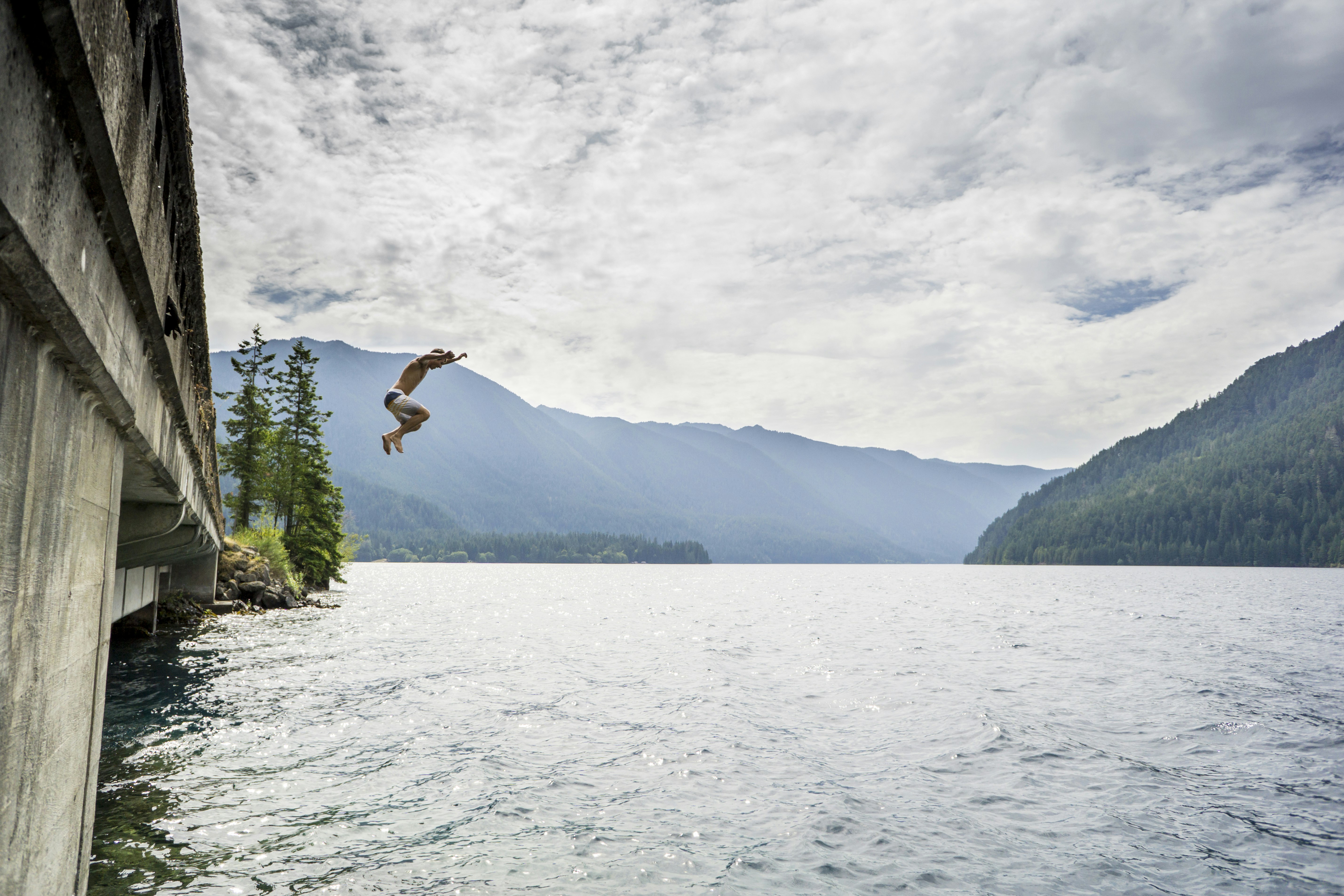
How much money do I need for Olympic National Park?
In common with many national parks, you can expect the prices for items such as food to be a little more expensive than the surrounding towns, plus there are fewer options to find cheap substitutes. Balancing things out, many of the park’s outdoor activities – including hiking, wild swimming and wildlife-watching – are free or almost free.
A guide to daily costs
- Park entrance fee: $15–30
- Campground per night: $15–24
- Basic room for two: $150–250
- Kayak rental (4 hours): $45
- Hot springs entrance fee: $18
- Public transport ticket: free–$10 (70-mile journey)
- Coffee: $3–4
- Dinner entrée at Lake Quinault Lodge: $26–48
Frequently asked questions
How unpredictable is the weather.
The weather is always fickle in this neck of the woods. Dress in layers, particularly in the mountains and bring a waterproof jacket and leggings.
Are there any rainy-day activities in the area?
Located just outside the national park boundary in Neah Bay, the Makah Museum is well worth an hour or two of your time, offering an unparalleled glimpse into one of the oldest and best studied Native American archaeological sites in the US.
Is there a park visitor center?
The park’s main visitor center is situated on the southern edge of Port Angeles and is open daily year-round. There’s a Wilderness Information Center next door. There’s another visitor center in the Hoh Rainforest with more limited off-season hours. The visitor center at Hurricane Ridge burned down in 2023.
Where is the main park entrance?
The park has numerous entry points. The most popular and convenient is the “Heart O’ the Hills” entrance 5 miles south of the main Port Angeles visitor center on Hurricane Ridge Road.
Other entrances to the park’s interior are located at Sol Duc, the Hoh Rainforest and Lake Quinault. All these places have ranger stations and lodge/cabin accommodations. Staircase is the main entrance to the park from the east and has its own ranger station.
There are three entrances to the park’s separated coastal strip, namely at Ozette, Mora and (the most popular) Kalaloch . All have ranger stations. Kalaloch also has a lodge.
What’s the deal with camping?
There are 14 front-country campgrounds in the park; half take reservations, the other half are first-come-first-served. Five campgrounds are suitable for tents only, and two have electrical hook-ups and water. Reservations can be made at recreation.gov .
Backcountry campers must purchase a permit for $6 and subsequently pay $8 per person per night. Sites must be booked in advance on recreation.gov. There are 120 backcountry campgrounds in the park, each able to accommodate between six and 12 people.
Explore related stories
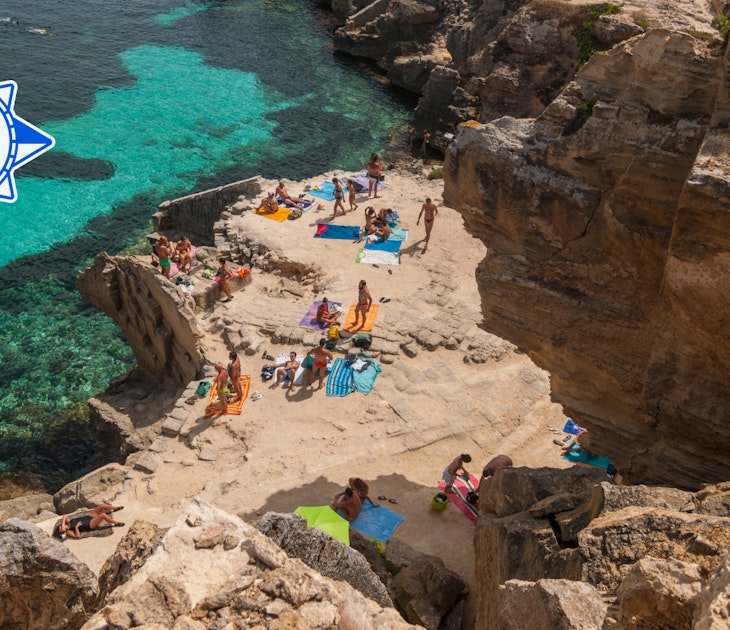
Tips & Advice
Apr 15, 2024 • 10 min read
From chilling on the beaches of Bora Bora to eating shellfish in Cape Cod, USA, here are the best places to visit in June.

Apr 13, 2024 • 8 min read

Apr 12, 2024 • 7 min read

Apr 11, 2024 • 6 min read

Apr 11, 2024 • 10 min read

Apr 3, 2024 • 8 min read

Apr 1, 2024 • 8 min read

Mar 30, 2024 • 4 min read
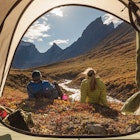
Mar 24, 2024 • 7 min read

Mar 19, 2024 • 6 min read
- Travel Planning Guide
How much does a trip to Takamatsu Cost?

How much money should you budget for your trip to Takamatsu?
How much does a weekend trip to takamatsu cost.
- How much does a five-day trip to Takamatsu cost?
- How much does a one-week trip to Takamatsu cost?
- Hostel Prices
- Hotel Prices
The Cost of a Trip to Takamatsu
Visitors to Takamatsu usually spend between $65 and $116 per day on average for one person and $131 to $231 for two people. While this is a wide range, the average daily cost averages $82 (¥12,601) per person. This average includes sightseeing, hotel, food, and local transportation expenses from other travelers. Your individual travel expenses may vary based on travel style and the locations visited, but if you plan wisely while visiting the most popular destinations, then you'll likely spend somewhere around this average cost during your trip. Further down we have a breakdown of expenses by category, as well as accommodation and activity prices.
Budget travelers to Takamatsu often spend around $65 per day. This usually includes a stay at a hostel and meals at affordable restaurants around town. Many budget travelers also prefer free activities over those that cost too much money. If you have a bit more money to spend, you should budget around $82 (¥12,601) per day. This average includes a mid-range hotel and more meals in restaurants, along with a higher budget for entertainment and activities. Luxury travelers should plan to spend around $116 a day which includes higher-end accommodations, restaurants, tours, and activities. For more details, see our average travel costs for Takamatsu here .
Travelers spend, on average, $247 per person on a three-day trip to Takamatsu. This includes sightseeing, hotels, food, and local transportation. You can stick close to this average price by staying at mid-range hotels and eating at mid-level restaurants, while also paying for some entry tickets to popular attractions. If you wish to travel cheaper, it's possible to find lower-cost accommodations, eat at less expenive restaurants, and find more free activities. It's also common for many visitors to have a much higher travel budget, as many high-end hotels and restaurants can be found around town.
How much does a five day trip to Takamatsu cost?
With five days in Takamatsu, you can expect to spend about $411 total, not including transportation to and from the city. It's possible to stay close to this daily average by booking mid-range hotels, eating at normal restaurants, and paying for some entry tickets to popular attractions. It's possible to find lower-cost accommodations, eat at less expenive restaurants, and find more free activities if you want to spent less money.
How much does a one week trip to Takamatsu cost?
Most visitors spend between $457 and $810 for a one week trip to Takamatsu, with the average being $575 . This includes sightseeing, local transportation, food, and hotels. One week is enough time to have a more in-depth experience in Takamatsu. Also, one week allows you to be more flexible with your time and money, so you can potentially save money on some aspects of your trip while spending more on others.
Hotel Prices in Takamatsu
The average price for a hotel room in Takamatsu is $0 per night. This average is based on our detailed analysis of available hotels in the area. If you want to save money, or if you're planning a more luxurious trip, it's important to look at hotel prices based on the overall star-rating as well as guest reviews. Also, prices can vary by location and amenities. You can see more details from our analysis of hotel prices in Takamatsu here , and below is a breakdown of hotel prices by star-rating.
Hotel Bokaiso
Royal park hotel takamatsu, more for takamatsu.
If you're planning a trip to Takamatsu, Japan, check out these other informative travel guides.
We've been gathering travel costs from tens of thousands of actual travelers since 2010, and we use the data to calculate average daily travel costs for destinations around the world. We also systematically analyze the prices of hotels, hostels, and tours from travel providers such as Kayak, HostelWorld, TourRadar, Viator, and others. This combination of expenses from actual travelers, combined with pricing data from major travel companies, gives us a uniqe insight into the overall cost of travel for thousands of cities in countries around the world. You can see more here: How it Works .
Subscribe to our Newsletter
Coupons and discounts! Travel tips!
1 Categories averaged on a per-item basis. 2 Categories averaged on a per-day basis. For example, the Food 2 daily average is for all meals for an entire day, while Entertainment 1 is for each individual purchase. Thus, the overall daily average cost is not a summation of the individual categories.
- You are welcome to reference or display our travel costs on your website as long as you provide a link back to this page .
- For a basic link, you can copy and paste the HTML link code, or this page's address. Address Link HTML Takamatsu Travel Costs " disabled />

Some of the links on this website are sponsored or affiliate links which help to financially support this site. By clicking the link and making a purchase, we may receive a small commission, but this does not affect the price of your purchase.
- Privacy / Terms of Use
- Activities, Day Trips, Things To Do, and Excursions

Promotions apply when you purchase
These promotions will be applied to this item:
Some promotions may be combined; others are not eligible to be combined with other offers. For details, please see the Terms & Conditions associated with these promotions.

Download the free Kindle app and start reading Kindle books instantly on your smartphone, tablet, or computer - no Kindle device required .
Read instantly on your browser with Kindle for Web.
Using your mobile phone camera - scan the code below and download the Kindle app.

Image Unavailable

- To view this video download Flash Player
Follow the author

Wanderer's Guide to Thailand 2024: Solo Travel adventure guide to Thailand | Plan Your Ideal Vacation to Land of Smile | Immerse Yourself in Cultural Delights | Budget-Friendly Smart Travel Kindle Edition
- Plan Your Ideal Vacation : Learn about Thailand's most popular attractions, destinations like Bangkok, Chiang Mai, Phuket, and Ayutthaya, along with hidden gems and off-the-beaten-path adventures. undiscovered treasures, and off-the-beaten-path experiences. Then, create a customized itinerary that fits your tastes and interests.
- Immerse Yourself in Cultural Delights : Learn more about Thai traditions, customs, and manners. Also, discover how to politely interact with local communities to have genuine cultural exchanges.
- Assure Your Safety and Well-Being: Acquire knowledge of vital safety advice, health precautions, and emergency contacts to enable you to travel through Thailand with assurance and tranquility.
- Budget-Friendly Smart Travel : Discover clever money-saving tips and travel hacks to see the best of Thailand without going over budget, including inexpensive places to stay and places to eat.
- Exciting Outdoor Adventures : Take on heart-pounding adventures that will last a lifetime, such as zip-lining and jungle hiking, as well as exploring historic sites and immaculate beaches.
- Dive into dynamic nightlife : Take in the pulse of Thailand's dynamic nightlife, which includes everything from vivid festivals and beach parties under the stars to bustling night markets and exciting street acts.
- Reading age 10 - 18 years
- Print length 44 pages
- Language English
- Publication date April 14, 2024
- Page Flip Enabled
- Word Wise Enabled
- Enhanced typesetting Enabled
- Sticky notes On Kindle Scribe
- See all details
Product details
- ASIN : B0D1GQQD5L
- Publication date : April 14, 2024
- Language : English
- File size : 653 KB
- Text-to-Speech : Enabled
- Screen Reader : Supported
- Enhanced typesetting : Enabled
- X-Ray : Not Enabled
- Word Wise : Enabled
- Sticky notes : On Kindle Scribe
- Print length : 44 pages
About the author
Wanderer publishing.
Discover more of the author’s books, see similar authors, read author blogs and more
Customer reviews
Customer Reviews, including Product Star Ratings help customers to learn more about the product and decide whether it is the right product for them.
To calculate the overall star rating and percentage breakdown by star, we don’t use a simple average. Instead, our system considers things like how recent a review is and if the reviewer bought the item on Amazon. It also analyzed reviews to verify trustworthiness.
No customer reviews
- Amazon Newsletter
- About Amazon
- Accessibility
- Sustainability
- Press Center
- Investor Relations
- Amazon Devices
- Amazon Science
- Sell on Amazon
- Sell apps on Amazon
- Supply to Amazon
- Protect & Build Your Brand
- Become an Affiliate
- Become a Delivery Driver
- Start a Package Delivery Business
- Advertise Your Products
- Self-Publish with Us
- Host an Amazon Hub
- › See More Ways to Make Money
- Amazon Visa
- Amazon Store Card
- Amazon Secured Card
- Amazon Business Card
- Shop with Points
- Credit Card Marketplace
- Reload Your Balance
- Amazon Currency Converter
- Your Account
- Your Orders
- Shipping Rates & Policies
- Amazon Prime
- Returns & Replacements
- Manage Your Content and Devices
- Recalls and Product Safety Alerts
- Conditions of Use
- Privacy Notice
- Consumer Health Data Privacy Disclosure
- Your Ads Privacy Choices
Capital One Main Navigation
- Learn & Grow
- Life Events
- Money Management
- More Than Money
- Privacy & Security
- Business Resources
Budgeting for your BFF’s big bash
Tips for tackling the money talk of bachelors & bachelorettes..
April 16, 2024 | 4 min read
Wedding bells are chiming, a date is being set, events are being planned—your friend is getting married. A bachelor or bachelorette bash is on the horizon and you’re ready—but is your wallet? Whether it’s a day or a weekend, it’s important to stay realistic with your budget.
Use these 5 tips to help you navigate your bach-bash budget.
Try loud budgeting
Have you heard of loud budgeting ? It’s a strategy that involves being open with friends and family about your financial goals and aspirations. This aligns well with social events such as a bachelor or bachelorette party since it involves being vocal about how you want to spend your money and how you don’t—even if you have the funds. Loud budgeting is effective because it helps you be clear with everyone, including yourself, about your financial goals. Being transparent about your budget can help negate the fear of missing out on certain events. When your friends and family are aware of your goals, they can plan accordingly to ensure you can join or be more understanding if you can’t make an event.
Discuss expectations
You are likely not alone in any cost-related hesitations that come with attending a bachelor or bachelorette bash. One way to address them is by having an open conversation with the organizer and other attendees. If you can have this discussion prior to making a commitment to the trip, you can go into it knowing if the event will fit into your budget. Stating any financial concerns can also help the event’s organizer have a better idea of what options would best suit the group.
It’s also important to discuss how costs will be divided . Will all the costs be split evenly? Will you be asked to pay for certain things on your own? Asking questions can help you feel more comfortable going into the weekend.
Bring an open mind
When you have a budget in mind, it can be nerve-wracking to get invited to an event that might interfere with your goals. Keeping an open mind can help you navigate the planning process. Sometimes bachelor and bachelorette trips involve many group activities, but maybe only some fall into your safe zone. As long as the bride or groom doesn’t mind, you could plan on sitting an activity or two out to stay comfortable while still being present. You don’t have to have an all-or-nothing approach to the invitation. Small things such as driving instead of flying if the event is not local could help you make it there with a little more cash in your pockets.
Maintain money boundaries
Setting money boundaries now can help you deal with expensive situations later. These boundaries could be different for everyone. Maybe yours are setting and sticking to a budget or simply putting your financial needs first. While nobody wants to be the sole bridesmaid or groomsman to speak up if the trip falls outside their budget, it’s necessary to set that boundary. The fear of missing out is not worth going into debt to attend. If you make the decision to not attend the bachelorette or bachelor trip, but still want to make a gesture, you could send a treat to a dinner, offer to chip in for an activity or gift for the bride or groom, or one of these other ideas .
It's OK to say no
It can be easy to get caught up in the excitement of wedding events, especially when it’s one of your closest friends getting married. You might go as far as to think that there’s no limit on how much you’d spend to celebrate them; however, it’s important to be realistic with your wallet. Declining an invitation to a bachelor or bachelorette bash can be a difficult decision to make, but your friend will understand if you are open and honest with them. If you can afford it, but it does not align with your financial goals, remember it’s still OK to say no.
Basically, tie the knot with your budget
In a nutshell, bachelor and bachelorette trips are an opportunity to celebrate your friend as they enter their next chapter—an experience you likely won’t want to miss. If you’re not sure it will fit in your budget, remember the best approach is being open and honest with the group before finalizing anything—this way, there is potential to adjust. And by speaking up, you may discover other attendees have the same concern.
Related Content
How to plan a wedding budget and stick to it.
article | August 18, 2022 | 6 min read
Financial goals: How to set and achieve them
article | February 8, 2024 | 7 min read
7 ways to enjoy wedding season without crushing your wallet
article | June 27, 2017 | 10 min read
More From Forbes
How to choose the best cruise ship cabin for you.
- Share to Facebook
- Share to Twitter
- Share to Linkedin
Balcony staterooms on Norwegian Prima feature a Scandinavian color palette with some modern design ... [+] touches.
Choosing your cruise ship cabin or stateroom is an essential part of planning a dream cruise vacation. The right accommodation can enhance your cruise experience, providing you with a comfortable retreat after a day of adventure, but some choices may turn out to be an expensive mistake.
Here’s how to select the best cruise ship cabin for your needs, whether you're seeking breathtaking views, peace and quiet, convenience, or the best value.
Cruise Ship Cabin Grades
From motel-sized inside cabins to luxurious suites that rival the most expensive land-based hotels, cruise ships offer a range of accommodation grades to suit all preferences and budgets:
Interior Cabins : The most budget-friendly option, these cabins are located inside the ship and have no windows. Although they are often just as spacious as oceanview cabins, the lack of natural light may be off-putting to some.
Oceanview Cabins : Offering a window or porthole, these cabins provide natural light and views of the ocean or ports, a good middle-ground option. On modern ships, such cabins will likely be located towards the bottom of the ship, as balcony cabins now dominate ship exteriors.
Balcony Cabins : These cabins feature private balconies allowing direct access to ocean breezes and private views. These cabins are perfect for those who prefer to enjoy the scenery privately.
Netflix s Best New Show Arrives With A Perfect 100 Critic Score
Apple watch series 10 to boast welcome upgrade report claims, wwe raw results winners and grades on april 15 2024.
Some ships offer cabins with direct access to the promenade deck, while the largest ships, including MSC World Europa , offer balconies overlooking an internal courtyard or promenade.
The newest, largest cruise ships such as Royal Caribbean's 'Icon of the Seas' offer a huge range of ... [+] cabin grades and locations.
Suites : The most spacious and luxurious option, suites often come with extra amenities and services, ideal for travelers looking for a premium experience. Separate bedrooms, wraparound balconies, and even butler service are some common features of cruise ship suites.
Pioneered by Norwegian Cruise Line, solo traveler cabins are becoming more common across the industry. Whereas for many years solo cabins were usually interior grade, there are now oceanview and even balcony cabins available for solo travelers on some lines.
Consider The Location
Perhaps more so than the accommodation grade, the cabin location can significantly impact your cruise experience.
Top-to-bottom : Cabins on lower decks are usually cheaper with the added benefit of experiencing less movement in rough seas.
However, depending on the size of the ship, they could be farther from entertainment and dining areas. On big ships, there may be 10 or even more flights of stairs between your cabin and the pool, sun deck, buffet, and other amenities found at the top of the ship. There will be elevators, of course, but you should expect queues at busy times.
Cabins on higher decks will provide better views from balconies and suites, and good access to many of the ship’s amenities, but passengers may feel the ship's movement more. You may also hear more noise from outdoor activities on the pool deck.
Cabins on middle floors offer the best combination of access to facilities and less movement in the event of rough seas.
Front-to-back : Just as important as the deck number is the cabin’s location between the ship’s front and rear.
Cabins located at the very front and very back of the ship will experience significantly more movement in the event of rough seas, so choose a cabin towards the middle of the ship if you’re facing multiple sea days or sailing off-season.
Inside cabins on the 'P&O Arvia' cruise ship are a good value accommodation option. They can be ... [+] configured with a double or twin beds.
It’s also worth knowing that most cruise ships feature main dining venues at the rear and the main theater at the front.
The Budget Accommodation Choice
When choosing a cabin, start with understanding your budget. Decide how much you’re willing to spend and remember that while the cabin is important, you’ll also want to budget for on-board activities, excursions, beverages, and other expenses.
If budget matters above all else, an interior cabin is a wise choice. You could also save money by booking a saver fare offered by some cruise lines.
These fares typically don't allow you to select your cabin in advance. This will likely result in you being allocated a cabin at the front or back of the ship, but it will save you money.
Questions To Ask Yourself
If you have more flexibility in your budget, consider what’s important to you in accommodation. If you plan to spend a lot of time in your cabin, you might value a balcony or a spacious room more. Families might look for cabins with connecting doors or extra bed options.
Before booking, read reviews of the ship and specific cabins on websites such as Cruise Critic or watching YouTube reviews. Previous travelers can offer invaluable insight into noise levels, views, and overall satisfaction.
Examine the ship’s layout to see where your cabin is in relation to key areas like the lido deck, dining rooms, and entertainment venues. Consider potential noise from above or below your cabin, especially if it’s immediately above or below a dance floor, crew area, or near the pool.
Your cruise itinerary might also influence your choice of accommodation. For scenic cruises, such as those in Alaska or the Norwegian fjords , a balcony might be worth the splurge to enjoy the magnificent views in relative peace. A balcony breakfast while sailing along a fjord will be an experience to remember.
On the other hand, if you plan to spend most of your time exploring ports and partaking in onboard activities, the type and location of cabin might be of less importance.

- Editorial Standards
- Reprints & Permissions

IMAGES
VIDEO
COMMENTS
View typical and average travel costs for thousands of cities and hundreds of countries around the world. Plan your next trip with real knowledge of your travel budget. All of the average travel costs come from real travelers. You can sign up to track your own travel expenses, too. France United States Thailand Morocco Ireland Brazil.
Calculator Instructions. Enter all your estimated expenses you've gathered during your vacation research. Make sure it's actually a realistic travel budget. For a family trip with young kids, you'll also need to factor other things like diapers, baby wipes etc. Travel Budget: Enter your overall vacation budget you have for this trip.
Travel Budget Template Worksheet. To help you plan and keep track of your travel budget we have created a free, handy Microsoft Excel spreadsheet. 📋 Click to Download Our Travel Budget Template > 📋. Travel Budget Considerations. When planning your travel budget, there are lots of different things to consider.
The Travel Budget Calculator streamlines the planning process, providing instant insights into your projected expenses. With a few clicks, you can fine-tune your budget and allocate resources efficiently, ensuring a hassle-free travel experience. Financial Transparency: Transparency is key to effective budgeting, and the Travel Budget ...
The upside is: this part of your budget should be much more fun to plan! Once you have a total for this part, divide it by the number of days that you will be traveling. For example: if I am vacationing for 10 days and the Vacation Expenses part of my budget totals $600, my math would look like this: $600 total/10 days = $60/day.
Free Travel Budget Calculator (With Instructions) Now let's go over the vacation cost calculator itself and how to use it. Step 1. Enter your intentended budget. Start by entering your intended trip budget at the top - as in, the total budget you plan to spend - and then your expenses in the following rows.
Much of the time, this is accomplished through welcome bonuses earned when you open a travel credit card. For example, a round-trip flight from Los Angeles to Paris costs $1,255 at the beginning ...
Travel Insurance: $150. Hotel Room, $130/night for 7 nights: $910. ($4000 total budget - $3060 major expenses) / 7 days = $134.28/day to spend, or $67.14/per person, per day. Paris, France. I would round those down to $134 or $67, both for the ease of math and to build in a slightly conservative slant to the budget.
Here are seven simple steps to follow to budget solo travel effectively. 1. Plan your itinerary. In order to successfully budget for your trip, you'll want to plan your itinerary first so you can accurately budget your expenses. For short trips of a week or two, it should be easier to get specific. For long-term trips like a multi-month ...
3. Make a list of smaller expenses. Once the larger expenses are planned out, figure out the extras, like sightseeing, entertainment, and gifts. Research potential vacation activities and local places to visit. Go online to get an idea of the associated costs, and budget accordingly.
If you have no time to research, then, budget a minimum of at least 2 to 2.5 times the price of your accommodation per night for one day's worth of food. This rule of thumb works well for budget travel. Our top tip: If you're on a longer trip, try to cook at least one meal a day. You'll be surprised how much money you would save.
To help you out, here's a basic framework of how we set our travel budgets: Transportation (including airfare, train fare, gas, public transportation, rental cars)—30%. Accommodations (vacation rental, hotel room) —30%. Daily budget for expenses while traveling (meal costs and other food, souvenirs, incidentals)—20%.
BASIC TRAVEL EXPENSES. Accommodation, food, and transportation are among the basic expenses that you need to factor into your daily travel budget. Let's say you will travel on $100 a day. When you spend $30 on a hotel room, $20 on a bus, and $25 on food, you used up more than two-thirds of your entire travel budget.
How to Budget for a Trip. Plan ahead, save up, and make the most of credit card rewards. By Carissa Rawson. Updated on December 31, 2021. Reviewed by. Khadija Khartit. In This Article. Plan for the Big Expenses. Account for the Little Costs of Traveling.
To establish a base travel budget, begin by assessing the amount you've saved or plan to save for the trip, along with your monthly expenses (like rent, car payments, and insurance). Deduct your monthly expenses from the overall budget to determine how much is available for the trip while still covering essential costs.
Create a Budget. Creating a trip budget is the first and most important step as it provides a basis for the rest of your travel plans. Analyze your personal budget to determine how much money you have available for travel expenses, then allocate those funds to three categories: Preparation expenses: Money spent before your trip, such as for ...
Use Wanderlog to share your itinerary with tripmates, friends, and families and collaborate in real time, so everyone stays in the loop. Plan your road trip or vacation with the best itinerary and trip planner. Wanderlog travel planner allows you to create itineraries with friends, mark routes, and optimize maps — on web or mobile app.
Enter Your Expenses - Now that you know how much each item will likely cost, enter these figures into our Travel Budget Calculator below, including your total budget, number of travellers, number of days and your estimate for flights, transport, tours, food and miscellaneous items. Click Calculate - This will give you 4 totals below the ...
The Bottom Line: A Travel Budget Can Help You Plan A Trip. Planning a vacation can be stressful even without worrying about money, but vacations don't have to be ridiculously expensive. With the right travel budget, you can enjoy your vacation knowing you have enough funds to fully cover your trip.
How to calculate your travel budget using this trip calculator tool. Enter the cost of obtaining a travel visa for the destination country. (In US dollars) Choose whether or not to get travel insurance for your trip. (Highly recommended.) Enter the number of days you'll be in town. You can move the pointer forward or backward by dragging it ...
By planning your transportation in advance and exploring different options, you can find ways to save money and allocate your budget to other aspects of your trip. Step 5: Budget-Friendly Activities and Attractions. Exploring activities and attractions is an essential part of any trip, but it doesn't have to drain your budget.
This comprehensive guide will take you through a step-by-step process of how to budget for a trip. From determining your destination to estimating accommodation, transportation, food, and leisure costs, these strategies will help you plan and manage your expenses efficiently. Additionally, you will also learn how to account for miscellaneous ...
24 Tips for Planning a Budget-Friendly Road Trip ©Provided by From Frugal to Free. Family road trips are one of life's greatest adventures - a chance to explore new destinations, make ...
Look up prices of accommodation in the desired area, add the expected cost of a flight, and factor in daily expenses," explains Evelyn Lee, Truist regional president for DC and Baltimore ...
Observe the forces of nature on Ruby Beach. First designated in 1938, the Olympics was extended in 1953 to include a narrow coastal strip that stretches from Ozette in the north down to Kalaloch in the south. Of the coast's stormy collection of beaches, Ruby Beach, characterized by its bruised clouds, eroded sea stacks, and piles of washed-up ...
Asia / Japan / Takamatsu /. Visitors to Takamatsu usually spend between $65 and $116 per day on average for one person and $131 to $231 for two people. While this is a wide range, the average daily cost averages $82 (¥12,601) per person. This average includes sightseeing, hotel, food, and local transportation expenses from other travelers.
Plan Your Ideal Vacation: Learn about Thailand's most popular attractions, destinations like Bangkok, Chiang Mai, Phuket, and Ayutthaya, along with hidden gems and off-the-beaten-path adventures. undiscovered treasures, and off-the-beaten-path experiences. Then, create a customized itinerary that fits your tastes and interests.
Loud budgeting is effective because it helps you be clear with everyone, including yourself, about your financial goals. Being transparent about your budget can help negate the fear of missing out on certain events. When your friends and family are aware of your goals, they can plan accordingly to ensure you can join or be more understanding if ...
Cabins on higher decks will provide better views from balconies and suites, and good access to many of the ship's amenities, but passengers may feel the ship's movement more. You may also hear ...